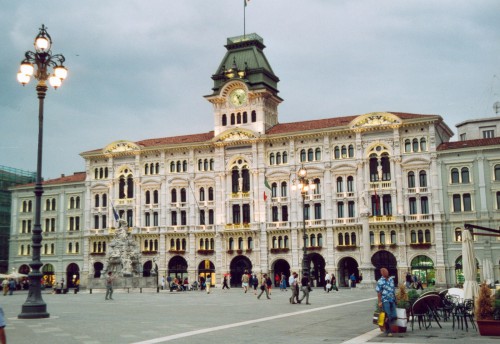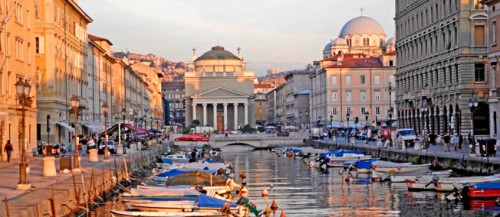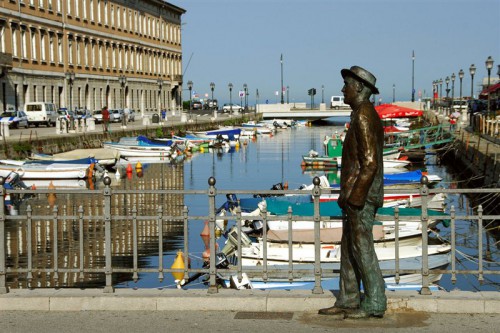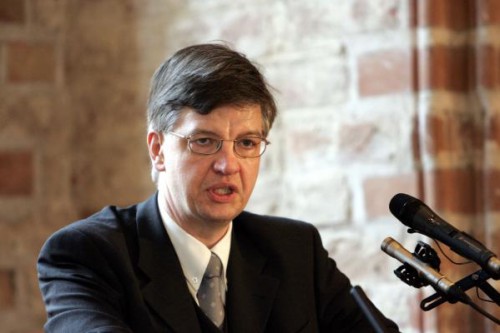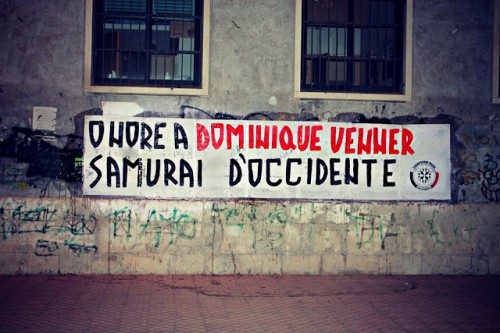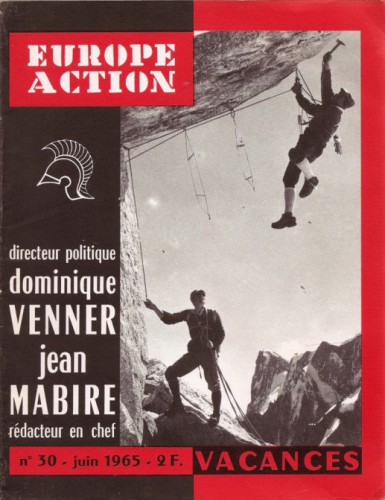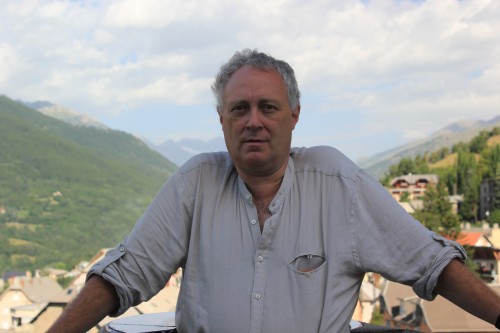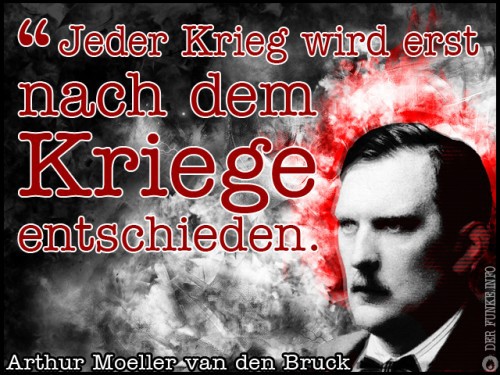
Robert STEUCKERS:
Sur l’entourage et l’impact d’Arthur Moeller van den Bruck
Conférence prononcée à la tribune du “Cercle Proudhon”, à Genève, 12 février 2013
Pourquoi parler ou reparler de Moeller van den Bruck aujourd’hui, 90 ans après la parution de son livre au titre apparemment fatidique, “Le Troisième Reich” (= “Das Dritte Reich”)? D’abord parce que l’historiographie récente s’est penchée sur lui (cf. bibliographie) en Allemagne, d’une manière beaucoup plus systématique qu’auparavant. Il est l’apôtre raté d’un “Troisième Règne”, qui n’adviendra pas de son vivant mais dont le nom sera repris par le mouvement hitlérien, dans une acception bien différente et à son corps défendant. Il s’agit de savoir, aujourd’hui, ce que Moeller van den Bruck entendait vraiment par “Drittes Reich”. Il s’agit aussi de cerner ce qu’il entendait par sa notion de “peuples jeunes”. Comment il entrevoyait la coopération entre l’Allemagne et la Russie (devenue l’URSS) dans le cadre de la République de Weimar, dont il méprisait les principes et le personnel. Arthur Moeller van den Bruck a participé à la formulation d’un “nationalisme de rupture”, d’un “néo-nationalisme” qu’Armin Mohler, dans sa célèbre thèse, a classé dans le phénomène de la “révolution conservatrice”. Une chose est certaine: Arthur Moeller van den Bruck n’est ni un “libéral” (au sens où l’entendait la démocratie de la République de Weimar) ni un pro-occidental, dans la mesure où il entendait détacher l’Allemagne de l’Occident français, anglais et américain.
L’oeuvre politique d’Arthur Moeller van den Bruck est toutefois ténue. Il n’a pas été aussi prolixe qu’Oswald Spengler, dont le célèbre “Déclin de l’Occident” est fort dense, d’une épaisseur bien plus conséquente que “Das Dritte Reich”. De plus, la définition, finalement assez ambigüe, que donne Spengler de l’Occident ne correspond pas à celle que donnera plus tard Moeller van den Bruck. Sans doute la brièveté de l’oeuvre politique de Moeller van den Bruck tient-elle au simple fait qu’il est mort jeune et suicidé, à 49 ans. Son oeuvre littéraire et artistique en revanche est beaucoup plus vaste. Moeller van den Bruck, en effet, a écrit sur le théâtre de variétés, sur le théâtre français, sur l’esthétique italienne, sur la mystique allemande, sur les personnages-clefs de la culture germanique (ceux qui en font son essence), sur la littérature moderniste, allemande et européenne, de son temps. Son oeuvre politique, qui ne prend son envol qu’avec la Grande Guerre, se résume à un ouvrage sur le “style prussien” (avec un volet sur l’art néo-classique), à l’ouvrage intitulé “Troisième Reich”, au livre sur la “révolte des peuples jeunes”, à ses articles parus dans des revues comme “Gewissen”. Moeller van den Bruck a donc été un séismographe de son époque, celle d’un extraordinaire foisonnement d’idées, de styles, d’audaces.
Zeev Sternhell et la “droite révolutionnaire”, Armin Mohler et la “Konservative Revolution”
La question qu’il convient de poser est donc la suivante: d’où viennent ses idées? Quel a été son cheminement? Quelles rencontres, apparemment “apolitiques”, ont-elles contribué à forger, parfois à leur corps défendant, son “Jungkonservativismus”? Le fait d’être homme, dit-on, c’est mener une quête, sans jamais s’arrêter. Quelle a donc été la quête personnelle, unique et inaliénable de Moeller van den Bruck? Il convient aussi de resituer cette quête dans un cadre historique et social. Cette démarche interpelle l’historiographie contemporaine: Zeev Sternhell avait tracé la généalogie du fascisme français depuis 1870 environ, avant de se pencher sur les antécédents de l’Italie fasciste et du sionisme. Après la parution en France, au “Seuil” à Paris, du premier ouvrage “généalogique” de Sternhell, intitulé “La droite révolutionnaire”, Armin Mohler, auteur d’un célèbre ouvrage synoptique sur la “révolution conservatrice”, lui rendait hommage dans les colonnes de la revue “Criticon”, en disant que le cadre de sa propre enquête avait été fixé, par son promoteur Karl Jaspers, à la période 1918-1932, mais que l’effervescence intellectuelle de la République de Weimar avait des racines antérieures à 1914, plongeant finalement dans un bouillonnement culturel plus varié et plus intense, inégalé depuis en Europe, dont de multiples manifestations sont désormais oubliées, se sont estompées des mémoires collectives. Et qu’il fallait donc les ré-exhumer et les explorer. Exactement comme Sternhell avait exploré l’ascendance idéologique de l’Action Française et des autres mouvements nationaux des années 20 et 30.
Ascendance et jeunesse
Resituer un auteur dans son époque implique bien entendu de retracer sa biographie, de suivre pas à pas la maturation de son oeuvre. Arthur Moeller van den Bruck est né en 1876 à Solingen, dans une famille prussienne originaire de Thuringe. Dans cette famille, il y a eu des pasteurs, des officiers, des fonctionnaires, dont son père, inspecteur général pour la construction des bâtiments publics. Cette fonction paternelle induira, plus que probablement, l’intérêt récurrent de son fils Arthur pour l’architecture (l’architecture de la Ravenne ostrogothique, le style prussien et l’architecture de Peter Behrens et du “Deutscher Werkbund”, comme nous allons le voir). L’ascendance maternelle, la famille van den Bruck, est, comme le nom l’indique, hollandaise ou flamande, mais compte aussi des ancêtres espagnols. Le jeune Arthur est un adolescent difficile, en rupture avec le milieu scolaire. Il ne décroche pas son “Abitur”, équivalent allemand du “bac”, ce qui lui interdit l’accès à l’université. Il restera, en quelque sorte, un marginal. Il quitte sa famille et se marie, à 20 ans, avec Hedda Maase. Nous sommes en 1896, année où survienent deux événements importants pour l’idéologie allemande de l’époque, qui donnera ultérieurement un certain lustre à la future “révolution conservatrice”: la naissance du mouvement de jeunesse “Wandervogel” sous l’impulsion de Karl Fischer et la création des éditions Eugen Diederichs à Iéna. Le jeune couple s’installe à Berlin cette année-là et Moeller van den Bruck vit de l’héritage de son grand-père maternel.
Baudelaire, Barbey d’Aurevilly, Poe...
Les jeunes époux vont entamer leur quête spirituelle en traduisant de grands classiques des littératures française et anglaise. D’abord Baudelaire qui communiquera à coup sûr l’idée du primat de l’artiste et du poète sur le “philistin” et le “bourgeois”. Ensuite Hedda et Arthur traduisent les oeuvres de Barbey d’Aurevilly. Cet auteur aura un impact important dans le rejet par Moeller van den Bruck du libéralisme et du bourgeoisisme. Barbey d’Aurevilly communique une certaine foi à Arthur, qui ne la christianisera pas —mais ne l’édulcorera pas pour autant— vu l’engouement de l’époque toute entière pour Nietzsche. Cette foi anti-bourgeoise, anti-philistine, se cristallisera surtout plus tard, au contact de l’oeuvre de Dostoïevski et de la personnalité de Merejkovski. Barbey d’Aurevilly était issu d’une famille monarchiste. Jeune, par défi, il se proclame “républicain”. Il lit ensuite Jospeh de Maistre et redevient monarchiste. Il le restera. En 1846, il se mue en catholique intransigeant, partisan de l’ultramontanisme. Barbey d’Aurevilly est aussi une sorte de dandy, haïssant la modernité bourgeoise, cultivant un style qui se veut esthétisme et rupture: deux attitudes qui déteindront sur son traducteur allemand. Le couple Moeller/Maase traduit ensuite le “Germinal” de Zola et quelques oeuvres de Maupassant. C’est donc, très jeune, à Berlin, que Moeller van den Bruck connaît sa période française, où le filon de Maistre/Barbey d’Aurevilly est déterminant, beaucoup plus déterminant que l’idéologie républicaine, qui donne le ton sous la III° République.
Mais ses six années berlinoises sont aussi sa période anglaise. Avec son épouse, il traduit l’ensemble de l’oeuvre de Poe, puis Thomas de Quincey, Daniel Defoe et Dickens. La période “occidentale”, franco-anglaise, de Moeller van den Bruck, futur pourfendeur de l’esprit occidental, occupe donc une place importante dans son itinéraire, entre 20 et 26 ans.
Zum Schwarzen Ferkel
Moeller van den Bruck fréquente le local branché de la bohème littéraire berlinoise, “Zum Schwarzen Ferkel” (“Au Noir Porcelet”) puis le “Schmalzbacke”. Le “Schwarzer Ferkel” est le pointde rencontre d’intellectuels et de poètes allemands, scandinaves et polonais, faisceau de diversités européennes qui constitue un “unicum” dans l’histoire des idées. A côté des poètes, il y a aussi des médecins, des artistes, des juristes: les débats y sont pluridisciplinaires. Le nom du local est une invention du Suédois August Strindberg et du poète allemand Richard Dehmel.
Detlev von Liliencron
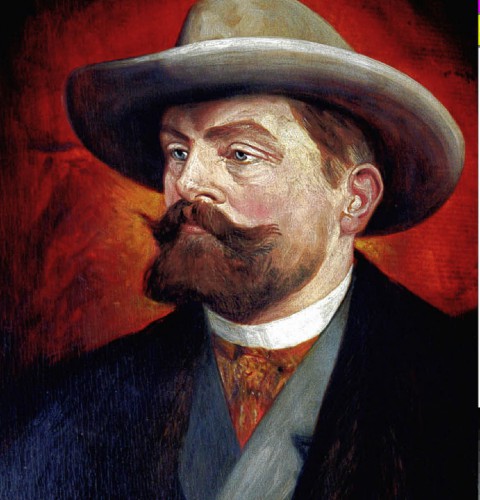
Parmi les personnages qu’y rencontre Moeller, on trouve un poète, aujourd’hui largement oublié, Detlev von Liliencron. Il est un poète-soldat du 19ème siècle: il a fait les guerres de l’unification allemande, en 1864, en 1866 et en 1870, contre les Danois, les Autrichiens et les Français. Son oeuvre majeure est “Adjutantenritte und andere Geschichten” (“Les chevauchées d’un aide de camp et autres histoires”) qui parait en 1883, où il narre ses mésaventures militaires. En 1888, dans la même veine, il publie “Unter flatternden Fahnen” (“Sous les drapeaux qui claquent au vent”). C’est un aristocrate pauvre du Slesvig-Holstein qui a opté pour la vie de caserne mais qui s’adonne au jeu avec beaucoup trop de frénésie, espérant redorer son blason. Le jeu devient chez lui un vice persistant qui brisera sa carrière militaire. Sur le plan littéraire, Detlev von Liliencron est une figure de transition: les aspects néo-romantiques, naturalistes et expressionnistes se succèdent dans ses oeuvres de prose et de poésie. Il refuse les étiquettes, refuse aussi de s’encroûter dans un style figé. Simultanément, ce reître rejette la vie moderne, proposée par la nouvelle société industrielle de l’Allemagne post-bismarckienne et wilhelminienne. Il entend demeurer un “cavalier picaresque”, refuse d’abandonner ce statut, plus exaltant qu’une carrière de rond-de-cuir inculte et étriqué. Il influencera Rilke et von Hoffmannsthal. Le destin de poète et de prosateur picaresque de Detlev von Liliencron a un impact sur Moeller van den Bruck (comme il en aura un aussi, sans doute, sur Ernst Jünger): Moeller, comme von Liliencron, voudra toujours aller “au-delà du donné conventionnel bourgeois”, d’où l’idée de “jouvance”, l’utilisation systématique et récurrente du terme “jeune”: est “jeune” qui veut conserver le fond sans les formes mortes, dans la mesure où les fonds ne meurent jamais et les formes meurent toujours. Il y a là sans nul doute un impact du nietzschéisme qui prend son envol: l’homme supérieur (dont le poète selon Baudelaire) se hisse très haut au-dessus des ronrons inlassablement répétés des philistins. Depuis les soirées du “Schwarzer Ferkel” et les rencontres avec von Liliencron, Moeller s’intéresse aux transitions, entendra favoriser les transitions, au détriment des fixités mentales ou idéologiques. Etre actif en ère de transition, aimer cet état de passage, vouloir être perpétuellement en état de mouvance et de quête, est la tâche sociale et nationale du littérateur et du séismographe, figure supérieure aux “encroûtés” de tous acabits, installés dans leurs créneaux étroits, où ils répétent inlassablement les mêmes gestes ou assument les mêmes fonctions formelles.
Richard Dehmel
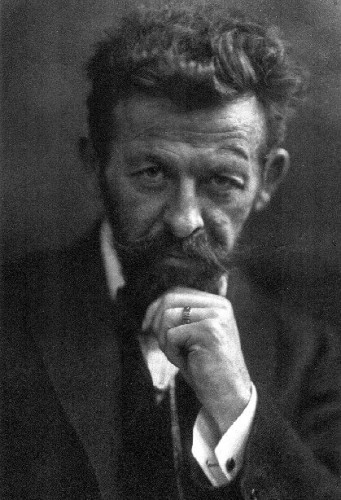 Deuxième figure importante pour l’itinéraire de Moeller van den Bruck, rencontrée dans les boîtes de la nouvelle bohème berlinoise: Richard Dehmel (1863-1920). Cet homme a de solides racines rurales. Son père était garde forestier et fonctionnaire des eaux et forêts. Contrairement à Moeller, il a bénéficié d’une bonne scolarité, il détient son “Abitur” mais n’a pas été l’élève modèle que souhaitent tous les faux pédagogues abscons: il s’est bagarré physiquement avec le directeur de son collège. Après son adolescence “contestatrice” au “Gymnasium”, il étudie le droit des assurances, adhère à une “Burschenschaft” étudiante puis entame une carrière de juriste auprès d’une compagnie d’assurances. Simultanément, il commence à publier ses poèmes. Il participe au journal avant-gardiste “Pan”, organe du “Jugendstil” (“Art Nouveau”), avec le sculpteur et peintre Franz von Stuck et le concepteur, architecte et styliste belge Henri van de Velde. Cet organe entend promouvoir une esthétique nouvelle, fusion du naturalisme et du symbolisme. Moeller van den Bruck s’y intéresse longuement (entre 1895 et 1900), avant de lui préférer l’architecture ostrogothique de l’Italie de Théodoric (à partir de 1906) et, pour finir, le classicisme prussien (entre 1910 et 1915).
Deuxième figure importante pour l’itinéraire de Moeller van den Bruck, rencontrée dans les boîtes de la nouvelle bohème berlinoise: Richard Dehmel (1863-1920). Cet homme a de solides racines rurales. Son père était garde forestier et fonctionnaire des eaux et forêts. Contrairement à Moeller, il a bénéficié d’une bonne scolarité, il détient son “Abitur” mais n’a pas été l’élève modèle que souhaitent tous les faux pédagogues abscons: il s’est bagarré physiquement avec le directeur de son collège. Après son adolescence “contestatrice” au “Gymnasium”, il étudie le droit des assurances, adhère à une “Burschenschaft” étudiante puis entame une carrière de juriste auprès d’une compagnie d’assurances. Simultanément, il commence à publier ses poèmes. Il participe au journal avant-gardiste “Pan”, organe du “Jugendstil” (“Art Nouveau”), avec le sculpteur et peintre Franz von Stuck et le concepteur, architecte et styliste belge Henri van de Velde. Cet organe entend promouvoir une esthétique nouvelle, fusion du naturalisme et du symbolisme. Moeller van den Bruck s’y intéresse longuement (entre 1895 et 1900), avant de lui préférer l’architecture ostrogothique de l’Italie de Théodoric (à partir de 1906) et, pour finir, le classicisme prussien (entre 1910 et 1915).
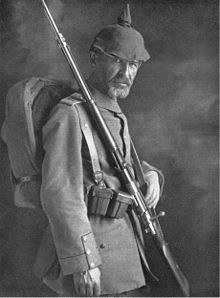 Richard Dehmel est d’abord un féroce naturaliste, qui ose publier en 1896, deux poèmes, jugés pornographiques à l’époque, “Weib und Welt” (“Féminité et monde”) et “Venus Consolatrix”. La réaction ne tarde pas: on lui colle un procès pour “pornographie”. Dans les attendus de sa convocation, on peut lire la phrase suivante: “Atteinte aux bons sentiments religieux et moraux”. Il n’est pas condamné mais censuré: le texte peut paraître mais les termes litigieux doivent être noircis! Dehmel est aussi, avec Stefan Zweig, le traducteur d’Emile Verhaeren, avec qui il était lié d’amitié, avant que la première guerre mondiale ne détruisent, quasi définitivement, les rapports culturels entre la Belgique et l’Allemagne. Pour Zweig, qui connaissait et Dehmel et Verhaeren, les deux poètes étaient les “Dioscures d’une poésie vitaliste d’avenir”. Dehmel voyagera beaucoup, comme Moeller. Lors de ses voyages à travers l’Allemagne, Dehmel rencontre Detlev von Liliencron à Hambourg. Cette rencontre avec le vieux reître des guerres d’unification le poussera sans doute à s’engager comme volontaire de guerre en 1914, à l’âge de 51 ans. Il restera deux ans sous les drapeaux, dans l’infanterie de première ligne et non pas dans une planque à l’arrière du front. En 1918, il lance un appel aux forces allemandes pour qu’elles “tiennent”. Le “pornographe” a donc été un vibrant patriote. En 1920, il meurt suite à une infection attrapée pendant la guerre. L’influence de Dehmel sur ses contemporains est conséquente: Richard Strauss, Hans Pfitzner et Arnold Schönberg mettent ses poèmes en musique. Par ailleurs, il a contribué à l’élimination de la pudibonderie littéraire, omniprésente en Europe avant lui et avant Zola: la sexualité est, pour lui, une force qui va briser le ronron des conventions, sortir l’humanité européenne de la cangue des conventions étriquées, d’un moralisme étroit et étouffant, où la joie n’a plus droit de cité. C’est l’époque d’un pansexualisme/panthéisme littéraire, avec Camille Lemonnier, le “Maréchal des lettres belges”, son contemporain (traduit en allemand chez Diederichs), puis avec David Herbert Lawrence, son élève, quand celui-ci pourfend le puritanisme de l’ère victorienne en Angleterre. Il me paraît utile de préciser ici que Dehmel s’est plus que probablement engagé dans les armées du Kaiser parce que l’effervescence culturelle, libératrice, de l’Allemagne de la Belle Epoque devait être défendue contre les forces de l’Entente qui ne représentaient pas, à ses yeux, une telle beauté esthétique; celle-ci ne pourra jamais se déployer sous les platitudes de régimes libéraux, de factures française ou anglaise.
Richard Dehmel est d’abord un féroce naturaliste, qui ose publier en 1896, deux poèmes, jugés pornographiques à l’époque, “Weib und Welt” (“Féminité et monde”) et “Venus Consolatrix”. La réaction ne tarde pas: on lui colle un procès pour “pornographie”. Dans les attendus de sa convocation, on peut lire la phrase suivante: “Atteinte aux bons sentiments religieux et moraux”. Il n’est pas condamné mais censuré: le texte peut paraître mais les termes litigieux doivent être noircis! Dehmel est aussi, avec Stefan Zweig, le traducteur d’Emile Verhaeren, avec qui il était lié d’amitié, avant que la première guerre mondiale ne détruisent, quasi définitivement, les rapports culturels entre la Belgique et l’Allemagne. Pour Zweig, qui connaissait et Dehmel et Verhaeren, les deux poètes étaient les “Dioscures d’une poésie vitaliste d’avenir”. Dehmel voyagera beaucoup, comme Moeller. Lors de ses voyages à travers l’Allemagne, Dehmel rencontre Detlev von Liliencron à Hambourg. Cette rencontre avec le vieux reître des guerres d’unification le poussera sans doute à s’engager comme volontaire de guerre en 1914, à l’âge de 51 ans. Il restera deux ans sous les drapeaux, dans l’infanterie de première ligne et non pas dans une planque à l’arrière du front. En 1918, il lance un appel aux forces allemandes pour qu’elles “tiennent”. Le “pornographe” a donc été un vibrant patriote. En 1920, il meurt suite à une infection attrapée pendant la guerre. L’influence de Dehmel sur ses contemporains est conséquente: Richard Strauss, Hans Pfitzner et Arnold Schönberg mettent ses poèmes en musique. Par ailleurs, il a contribué à l’élimination de la pudibonderie littéraire, omniprésente en Europe avant lui et avant Zola: la sexualité est, pour lui, une force qui va briser le ronron des conventions, sortir l’humanité européenne de la cangue des conventions étriquées, d’un moralisme étroit et étouffant, où la joie n’a plus droit de cité. C’est l’époque d’un pansexualisme/panthéisme littéraire, avec Camille Lemonnier, le “Maréchal des lettres belges”, son contemporain (traduit en allemand chez Diederichs), puis avec David Herbert Lawrence, son élève, quand celui-ci pourfend le puritanisme de l’ère victorienne en Angleterre. Il me paraît utile de préciser ici que Dehmel s’est plus que probablement engagé dans les armées du Kaiser parce que l’effervescence culturelle, libératrice, de l’Allemagne de la Belle Epoque devait être défendue contre les forces de l’Entente qui ne représentaient pas, à ses yeux, une telle beauté esthétique; celle-ci ne pourra jamais se déployer sous les platitudes de régimes libéraux, de factures française ou anglaise.
Max Dauthendey
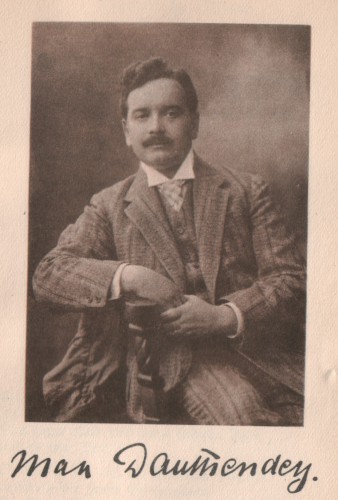 Troisième figure rencontrée dans les cafés littéraires de Berlin, plutôt oubliée aujourd’hui, elle aussi: Max Dauthendey (1867-1918). Il est le fils d’un photographe et daguerrotypiste. Il a vécu à Saint-Pétersbourg où il représentait les affaires de son père. C’était le premier atelier du genre en Russie tsariste. Le jeune Max est le fils d’un second mariage et le seul héritier d’un père qu’il déteste, parce qu’il lui administrait un peu trop souvent la cravache. Ce conflit père/fils va générer dans l’âme du jeune Max une haine des machines et des laboratoires, lui rappelant trop l’univers paternel. Il fugue deux fois, à treize ans puis à dix-sept ans où il se porte volontaire dans un régiment étranger des armées néerlandaises en partance pour Java. Après cet intermède militaire en Insulinde, il se réconcilie avec son père et travaille à l’atelier. En 1891, il s’effondre sur le plan psychique, séjourne dans un centre spécialisé en neurologie et, avec la bénédiction paternelle, cette fois, s’adonne définitivement à la poésie, sous la double influence de Dehmel et du poète polonais Stanislas Przybyszewski (1868-1927). Il fréquente les cafés littéraires et voyage beaucoup, en Suède, à Paris, en Sicile (comme Jünger plus tard), au Mexique (comme D. H. Lawrence), en Grèce et en Italie. Cette existence vagabonde le plonge finalement dans la misère: il est obligé de vivre aux crochets de toutes sortes de gens. Il décide toutefois, à peine renfloué, de faire un tour du monde. Il embarque à Hambourg le 15 avril 1914 et arrive pour la deuxième fois de sa vie à Java, où il restera quatre ans. Impossible d’aller plus loin: la guerre le force à l’immobilité. Il meurt de la malaria en Indonésie en août 1918. Peu apprécié des autorités nationales-socialistes qui le camperont comme un “exotiste”, son oeuvre disparaîtra petit à petit des mémoires. Sa femme découvre dans son appartement de Dresde 300 aquarelles, qui disparaîtront en fumée lors du bombardement de la ville d’art en février 1945.
Troisième figure rencontrée dans les cafés littéraires de Berlin, plutôt oubliée aujourd’hui, elle aussi: Max Dauthendey (1867-1918). Il est le fils d’un photographe et daguerrotypiste. Il a vécu à Saint-Pétersbourg où il représentait les affaires de son père. C’était le premier atelier du genre en Russie tsariste. Le jeune Max est le fils d’un second mariage et le seul héritier d’un père qu’il déteste, parce qu’il lui administrait un peu trop souvent la cravache. Ce conflit père/fils va générer dans l’âme du jeune Max une haine des machines et des laboratoires, lui rappelant trop l’univers paternel. Il fugue deux fois, à treize ans puis à dix-sept ans où il se porte volontaire dans un régiment étranger des armées néerlandaises en partance pour Java. Après cet intermède militaire en Insulinde, il se réconcilie avec son père et travaille à l’atelier. En 1891, il s’effondre sur le plan psychique, séjourne dans un centre spécialisé en neurologie et, avec la bénédiction paternelle, cette fois, s’adonne définitivement à la poésie, sous la double influence de Dehmel et du poète polonais Stanislas Przybyszewski (1868-1927). Il fréquente les cafés littéraires et voyage beaucoup, en Suède, à Paris, en Sicile (comme Jünger plus tard), au Mexique (comme D. H. Lawrence), en Grèce et en Italie. Cette existence vagabonde le plonge finalement dans la misère: il est obligé de vivre aux crochets de toutes sortes de gens. Il décide toutefois, à peine renfloué, de faire un tour du monde. Il embarque à Hambourg le 15 avril 1914 et arrive pour la deuxième fois de sa vie à Java, où il restera quatre ans. Impossible d’aller plus loin: la guerre le force à l’immobilité. Il meurt de la malaria en Indonésie en août 1918. Peu apprécié des autorités nationales-socialistes qui le camperont comme un “exotiste”, son oeuvre disparaîtra petit à petit des mémoires. Sa femme découvre dans son appartement de Dresde 300 aquarelles, qui disparaîtront en fumée lors du bombardement de la ville d’art en février 1945.
Stanislas Przybyszewski
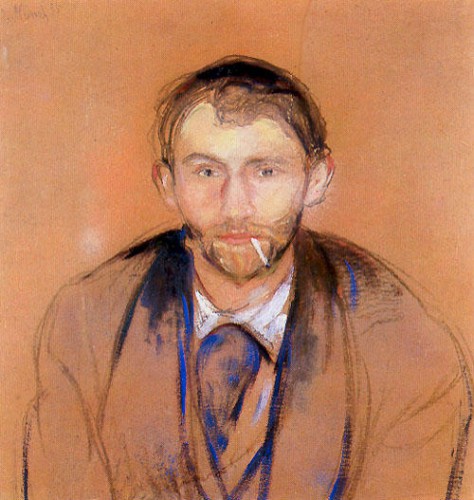 Quatrième figure: Stanislas Przybyszewski, un Polonais qui a étudié en allemand à Thorn en Posnanie. Lui aussi, comme Moeller et Dehmel, a eu une scolarité difficile: il a multiplié les querelles vigoureuses avec ses condisciples et son directeur. Cela ne l’empêche pas d’aller ensuite étudier à l’université la médecine et l’architecture. Il adhère d’abord au socialisme et fonde la revue “Gazeta Robotnicza” (= “La gazette ouvrière”). En deuxièmes noces, il épouse une figure haute en couleurs, Dagny Juel, une aventurière norvégienne, rencontrée lors d’un voyage au pays des fjords. Elle mourra quelques années plus tard en Géorgie où elle avait suivi l’un de ses nombreux amants. Lecteur de Nietzsche, comme beaucoup de ses contemporains, Przybyszewski est amené à réfléchir sur les notions de “Bien” et de “Mal” et, dans la foulée de ces réflexions, à s’intéresser au satanisme. Il fonde en 1898 la revue “Zycie” (= “La Vie”), couplant, Zeitgeist oblige, l’intérêt pour le mal (inséparable du bien et défini selon des critères étrangers à toute morale conventionnelle et répétitive), l’intérêt pour l’oeuvre de Nietzsche et de Strindberg et pour le vitalisme. Avant que ne se déclenche la première grande conflagration inter-européenne de 1914, il devient le chef de file du mouvement artistique, littéraire et culturel des “Jeunes Polonais” (“Mloda Polska”), fondé par Artur Gorski (1870-1959), quand la Pologne était encore incluse dans l’Empire du Tsar. La préoccupation majeure de ce mouvement culturel, partiellement influencé par Maurice Maeterlinck (1862-1949), est de s’interroger sur le rapport entre puissance créatrice et vie réelle. En ce sens, la tâche de l’art est de saisir l’“être originel” des choses et de le présenter sous forme de symboles, que seul une élite ténue est capable de comprendre (même optique chez l’architecte Henri van de Velde). Mloda Polska connaît un certain succès et s’affichera pro-allemand pendant la première guerre mondiale, tout comme le futur chef incontesté de la nouvelle Pologne, le Maréchal Pilsudski.
Quatrième figure: Stanislas Przybyszewski, un Polonais qui a étudié en allemand à Thorn en Posnanie. Lui aussi, comme Moeller et Dehmel, a eu une scolarité difficile: il a multiplié les querelles vigoureuses avec ses condisciples et son directeur. Cela ne l’empêche pas d’aller ensuite étudier à l’université la médecine et l’architecture. Il adhère d’abord au socialisme et fonde la revue “Gazeta Robotnicza” (= “La gazette ouvrière”). En deuxièmes noces, il épouse une figure haute en couleurs, Dagny Juel, une aventurière norvégienne, rencontrée lors d’un voyage au pays des fjords. Elle mourra quelques années plus tard en Géorgie où elle avait suivi l’un de ses nombreux amants. Lecteur de Nietzsche, comme beaucoup de ses contemporains, Przybyszewski est amené à réfléchir sur les notions de “Bien” et de “Mal” et, dans la foulée de ces réflexions, à s’intéresser au satanisme. Il fonde en 1898 la revue “Zycie” (= “La Vie”), couplant, Zeitgeist oblige, l’intérêt pour le mal (inséparable du bien et défini selon des critères étrangers à toute morale conventionnelle et répétitive), l’intérêt pour l’oeuvre de Nietzsche et de Strindberg et pour le vitalisme. Avant que ne se déclenche la première grande conflagration inter-européenne de 1914, il devient le chef de file du mouvement artistique, littéraire et culturel des “Jeunes Polonais” (“Mloda Polska”), fondé par Artur Gorski (1870-1959), quand la Pologne était encore incluse dans l’Empire du Tsar. La préoccupation majeure de ce mouvement culturel, partiellement influencé par Maurice Maeterlinck (1862-1949), est de s’interroger sur le rapport entre puissance créatrice et vie réelle. En ce sens, la tâche de l’art est de saisir l’“être originel” des choses et de le présenter sous forme de symboles, que seul une élite ténue est capable de comprendre (même optique chez l’architecte Henri van de Velde). Mloda Polska connaît un certain succès et s’affichera pro-allemand pendant la première guerre mondiale, tout comme le futur chef incontesté de la nouvelle Pologne, le Maréchal Pilsudski.
Après 1918, comme Moeller van den Bruck, Przybyszewski s’engage en politique et travaille à construire le nouvel Etat polonais indépendant, tout en poursuivant sa quête philosophique et son oeuvre littéraire. Pour Przybyszewski, comme par ailleurs pour le Moeller van den Bruck du voyage en Italie (1906), l’art dévoile le fond de l’être: la part ténue d’humanité émancipée des pesanteurs conventionnelles (bourgeoises) atteint peut-être le sublime en découvrant ce “fond” mais cette élévation et cette libération sont simultanément un plongeon dans les recoins les plus sombres de l’âme et dans le tragique (on songe, mutatis mutandi, au thème d’“Orange mécanique” d’Anthony Burgess et du film du même nom de Stanley Kubrik). Les noctambules, les dégénérés et les déraillés, ainsi que la lutte des sexes (Strindberg, Weininger), intéressent notre auteur polonais, qui voulait devenir psychiatre au terme de ses études inachevées de médecine, comme ils avaient intéressé Dostoïevski, observateur avisé du public des bistrots de Saint-Pétersbourg. En 1897, leur sort, leurs errements sont l’objet d’un livre qui connaîtra deux titres “Die Gnosis des Bösen” et “Die Synagoge Satans”.
Figure plus exubérante que Moeller, Przybyszewski fait la jonction entre l’univers artistique d’avant 1914 et la nécessité de reconstruire le politique après 1918. La trajectoire du Polonais a sûrement influencé les attitudes de l’Allemand. Des parallèles peuvent aisément être tracés entre leurs deux itinéraires, en dépit de la dissemblance entre leurs personnalités.
Les cabarets
Parmi tous les clubs et lieux de rencontre de cette incroyable bohème littéraire, il y a bien sûr les cabarets, où les animateurs critiquent à fond les travers de la société wilhelminienne, qui, par son fort tropisme technicien, oublie le “fonds” au profit de “formes” sans épaisseur temporelle ni charnelle. A Berlin, c’est le cabaret “Überbretteln” qui donne le ton. Il s’est délibérément calqué sur son homologue parisien “Le Chat noir” de Montmartre, créé par Rodolphe Salis. Sous la dynamique impulsion d’Ernst von Wolzogen, il s’ouvre le 18 janvier 1901. A Munich, le principal cabaret contestataire est “Die Elf Scharfrichter”, où sévit Frank Wedekind. Celui-ci est maintes fois condamné pour obscénité ou pour lèse-majesté: il a certes critiqué, de la façon la plus caustique qui soit, l’Empereur et le militarisme mais, Wedekind, puis Wolzogen, qui l’épaulera, ne sont pas des figures de l’anti-patriotisme: ils veulent simplement une “autre nation” et surtout une autre armée. Leur but est de multiplier les scandales pour forcer les Allemands à réfléchir, à abandonner toutes postures figées. Dans ce sens, et pour revenir à Moeller van den Bruck, qui vit au beau milieu de cette effervescence, inégalée en Europe jusqu’ici, ces cabarets sont des instances de la “transition”, vers un Reich (ou une Cité) plus “jeune”, neuf, ouvert en permanence et volontairement à toutes les innovations ravigorantes.
L’époque berlinoise de Moeller van den Bruck a duré six ans, de 1896 à 1902. Dans ces cercles, il circule en affichant le style du dandy, sans doute inspiré par Barbey d’Aurevilly. Moeller est quasi toujours vêtu d’un long manteau de cuir, coiffé d’un haut-de-forme gris, l’oeil cerclé par un monocle. Il parle un langage simple mais châtié, sans doute pour compenser son absence de formation post-secondaire. Il est un digne et quiet héritier de Brummell. En 1902, sa femme Hedda est enceinte. La fortune héritée du grand-père van den Bruck est épuisée. Il abandonne sa femme, qui se remariera avec un certain Herbert Eulenberg, appartenant à une famille qui sera radicalement anti-nazie. Elle continuera à traduire des oeuvres littéraires françaises et anglaises jusqu’en 1936, quand le pouvoir en place lui interdira toute publication.
Arrivée à Paris
Moeller van den Bruck quitte donc l’Allemagne pour Paris où il arrive fin 1902. On dit parfois qu’il a cherché à échapper au service militaire: les patriotes, en effet, ne sont pas tous militaristes dans l’Allemagne wilhelminienne et Moeller n’a pas encore vraiment pris conscience de sa germanité, comme nous allons le voir. Les patriotes non militaristes reprochent à l’Empereur Guillaume II de fabriquer un “militarisme de façade”, encadré par des officiers caricaturaux et souvent incompétents, parce qu’il a fallu recruter des cadres dans des strates de la population qui n’ont pas la vraie fibre militaire et compensent cette lacune par un autoritarisme ridicule. C’est ainsi que Wedekind dénonçait le militarisme wilhelminien sur les planches du cabaret “Die Elf Scharfrichter”. Son anti-militarisme n’est donc pas un anti-militarisme de fond mais une volonté de mettre sur pied une armée plus jeune, plus percutante.
Dès son arrivée dans la capitale française, une idée le travaille: il l’a puisée dans sa lecture des oeuvres de Jakob Burckhardt. On ne peut pas être simultanément une grande culture comme l’Allemagne et peser d’un grand poids politique sur l’échiquier planétaire comme la Grande-Bretagne ou la France. Pour Moeller, lecteur de Burckhardt, il y a contradiction entre élévation culturelle et puissance politique: nous avons là l’éclosion d’une thématique récurrente dans les débats germano-allemands sur la germanité et l’essence de l’Allemagne; elle sera analysée, dans une perspective particulièrement originale par Christoph Steding en 1934: celui-ci fustigera l’envahissement de la culture allemande par tout un fatras “impolitique” et esthétisant, importé de Scandinavie, de Hollande et de Suisse. En ce sens, Steding dépasse complètement Moeller van den Bruck, encore lié à cette culture qu’il juge “impolitique”; toutefois, c’est au sein de cette culture impolitique qu’ont baigné ceux qui, après 1918, ont voulu oeuvrer à la restauration “impériale”. Le primat du culturel sur le politique sera également moqué dans un dessin de Paul A. Weber montrant un intellectuel binoclard, malingre et macrocéphale, jetant avec rage des livres de philo contre un tank britannique (de type Mk. I) qui défonce un mur et fait irruption dans sa bibliothèque; le chétif intello “mitteleuropéen” hurle: “Je vous pulvérise tous par la puissance de mes pensées!”.
Récemment, en 2010, Peter Watson, journaliste, historien, attaché à l’Université d’Oxford, campe l’envol vertigineux de la pensée et des sciences allemandes au 19ème siècle comme une “troisième renaissance” et comme une “seconde révolution scientifique”, dans un ouvrage qui connaîtra un formidable succès en Angleterre et aux Etats-Unis, malgré ses 964 pages en petits caractères (cf. “The German Genius – Europe’s Third Renaissance, the Second Scientific Revolution and the Twentieth Century”, Simon & Schuster, London/New York, 2010). Ce gros livre est destiné à bannir la germanophobie stérile qui a frappé, pendant de longues décennies, la pensée occidentale; il réhabilite la “Kultur” que l’on avait méchamment moquée depuis août 1914 mais cherche tout de même, subrepticement, à maintenir la germanité contemporaine dans un espace mental impolitique. La culture germanique depuis le début du 19ème, c’est fantastique, démontre Watson, mais il ne faut pas lui donner une épaisseur et une vigueur politiques: celles-ci ne peuvent être que de dangereux ou navrants dérapages. Watson évoque Moeller van den Bruck (pp. 616-618). L’interrogation de Moeller van den Bruck demeure dont d’actualité: on tente encore et toujours d’appréhender et de définir les contradictions existantes entre la grandeur culturelle de l’Allemagne et son nanisme politique sur l’échiquier européen ou mondial, entre l’absence de profondeur intellectuelle et de musicalité de la France républicaine et du monde anglo-saxon et leur puissance politique sur la planète.
Moeller van den Bruck découvre la pensée russe à Paris
Les quatre années parisiennes de Moeller van den Bruck ne vont pas renforcer la part française de sa pensée, acquise à Berlin lors de ses travaux de traduction réalisés avec le précieux concours d’Hedda Maase. A Paris —où il retrouve Dauthendey et le peintre norvégien Munch à la “Closerie des Lilas”— c’est la part russe de son futur univers mental qu’il va acquérir. Il y rencontre deux soeurs, Lucie et Less Kaerrick, des Allemandes de la Baltique, sujettes du Tsar. Lucie deviendra rapidement sa deuxième épouse. Le couple va s’atteler à la traduction de l’oeuvre entière de Dostoïevski (vingt tomes publiés à Munich chez Piper entre le séjour parisien et le déclenchement de la première guerre mondiale). Pour chaque volume, Moeller rédige une introduction, qui disparaîtra des éditions postérieures à 1950. Ces textes, longtemps peu accessibles, figurent toutefois tous sur la grande toile et sont désormais consultables par tout un chacun, permettant de connaître à fond l’apport russe au futur “Jungkonservativismus”, à la “révolution conservatrice” et à l’“Ostideologie” des cercles russophiles nationaux-bolcheviques et prussiens-conservateurs. Moeller est donc celui qui crée l’engouement pour Dostoïevski en Allemagne. L’immersion profonde dans l’oeuvre du grand écrivain russe, qu’il s’inflige, fait de lui un russophile profond qui transmettra sa fascination personnelle à tout le mouvement conservateur-révolutionnaire, “jungkonservativ”, après 1918.
L’anti-occidentalisme politique et géopolitique, qui transparaît en toute limpidité dans le “Journal d’un écrivain” de Dostoïevski, a eu un impact déterminant dans la formation et la maturation de la pensée de Moeller van den Bruck. En effet, ce “Journal” récapitule, entre bien d’autres choses, l’anthropologie de Dostoïevski et énumère les tares des politiques occidentales. L’anthropologie dostoïevskienne dénonce l’avènement d’un homme se voulant “nouveau”, un homme sans ancêtres qui se promet beaucoup d’enfants: un homme qui a coupé le cordon invisible qui le liait charnellement à sa lignée mais veut se multiplier, se cloner à l’infini dans le futur. Cet homme, auto-épuré de toutes les insuffisances qu’il aurait véhiculées depuis toujours par le biais de son corps créé par Dame Nature, s’enfermera bien vite dans un petit monde clos, dans des “clôtures” et finira par répéter une sorte de catéchisme positiviste, pseudo-scientifique, intellectuel, sec, mécanique, qui n’explique rien. Il ne vivra donc plus de “transitions”, de périodes où l’on innove sans trahir le fonds, puisqu’il n’y aura plus de fonds et qu’il n’y aura plus besoin d’innovations, tout ayant été inventé. Nous avons là l’équivalent russe du dernier homme de Nietzsche, qui affirme ses platitudes “en clignant de l’oeil”. L’avènement de cet “homunculus” est déjà, à l’époque de Dostoïevski, bien perceptible dans le vieil Occident, chez les peuples vieillissants. Et la politique de ces Etats vieillis empêche la vigoureuse vitalité slave (surtout serbe et bulgare) de vider “l’homme malade du Bosphore” (c’est-à-dire l’Empire ottoman) de son lit balkanique, et surtout de la Thrace des Détroits. L’Occident est resté “neutre” dans le conflit suscité par la révolte serbe et bulgare (1877-78), trahissant ainsi la “civilisation chrétienne”, face à son vieil ennemi ottoman, et ne s’est manifesté, intéressé et avide, que pour s’emparer des meilleures dépouilles turques, disponibles parce que les peuples jeunes des Balkans avaient versé leur sang généreux. Phrases qu’on peut considérer comme prémonitoires quand on les lit après les événements de l’ex-Yougoslavie, surtout ceux de 1999...
Rencontre avec Dmitri Merejkovski et Zinaïda Hippius
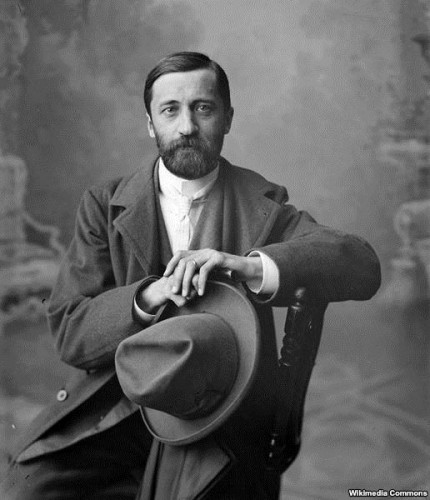 Moeller refuse donc l’avènement des “homunculi” et apprend, chez Dostoïevski, à respecter l’effervescence des révoltes de peuples encore jeunes, encore capables de sortir des “clôtures” où on cherche à les enfermer. Mais un autre écrivain russe, oublié dans une large mesure mais toujours accessible aujourd’hui, en langue française, grâce aux efforts de l’éditeur suisse “L’Age d’Homme”, aura une influence déterminante sur Moeller van den Bruck: Dmitri Merejkovski. Cet écrivain habitait Paris, lors du séjour de Moeller van den Bruck dans la capitale française, avec son épouse Zinaïda Hippius (ou “Gippius”). L’objectif de Merejkovski était de rénover la pensée orthodoxe tout en maintenant le rôle central de la religion en Russie: rénover la religion ne signifiait pas pour lui l’abolir. Merejkovski était lié au mouvement des “chercheurs de Dieu”, les “Bogoïskateli”. Il éditait une revue, “Novi Pout” (= “La Nouvelle Voie”), où notre auteur envisageait, conjointement au poète Rozanov, de réhabiliter totalement la chair, de réconcilier la chair et l’esprit: idée qui se retrouvait dans l’air du temps avec des auteurs comme Lemonnier ou Dehmel et, plus tard, D. H. Lawrence. Par sa volonté de rénovation religieuse, Merejkovski s’opposait au théologien sourcilleux du Saint-Synode, le “vieillard jaunâtre” Pobedonostsev, intégriste orthodoxe ne tolérant aucune déviance, aussi minime soit-elle, par rapport aux canons qu’il avait énoncés dans le but de voir régner une “paix religieuse” en Russie, une paix hélas figeante, mortifère, sclérosant totalement les élans de la foi. Comme le faisait en Allemagne, dans le sillage de tout un éventail d’auteurs en vue, l’éditeur Eugen Diederichs à Iéna depuis 1896, Merejkovski recherche, dans le monde russe cette fois, de nouvelles formes religieuses. Il rend visite à des sectes, ce qui alarme les services de Pobedonostsev, liés à la police politique tsariste. Son but? Réaliser les prophéties de l’abbé cistercien calabrais Joachim de Flore (1130-1202). Pour cet Italien du 12ème siècle, le “Troisième Testament” allait advenir, inaugurant le règne de l’Esprit Saint dans le monde, après le “Règne du Père” et le “Règne du Fils”. Cette volonté de participer à l’avènement du “Troisième Testament” conduit Merejkovski à énoncer une vision politique, jugée révolutionnaire dans la première décennie du 20ème siècle: Pierre le Grand, fondateur de la dynastie des Romanov, est une figure antéchristique car il a ouvert la Russie aux vices de l’Occident, l’empêchant du même coup d’incarner à terme dans le réel ce “Troisième Testament”, que sa spiritualité innée était à même de réaliser. En émettant cette critique hostile à la dynastie, Merejkovski se pose tout à la fois comme révolutionnaire dans le contexte de 1905 et comme “archi-conservateur” puisqu’il veut un retour à la Russie d’avant les Romanov, une contestation qui, aujourd’hui encore, brandit le drapeau noir-blanc-or des ultra-monarchistes qui considèrent la Russie, même celle de Poutine avec son drapeau bleu-rouge-blanc, comme une aberration occidentalisée. En 1905 donc, la Russie qui s’est alignée sur l’Occident depuis Pierre le Grand subit la punition de Dieu: elle perd la guerre qui l’oppose au Japon. L’armée, qui tire dans le tas contre les protestataires emmenés par le Pope Gapone, est donc l’instrument des forces antéchristiques. Le Tsar étant, dans un tel contexte, lui aussi, une figure avancée par l’Antéchrist. La monarchie des Romanov est posée par Merejkovski comme d’essence non chrétienne et non russe. Mais en cette même année 1905, Merejkovski sort un ouvrage très important, intitulé “L’advenance de Cham” ou, en français, “L’avènement du Roi-Mufle”.
Moeller refuse donc l’avènement des “homunculi” et apprend, chez Dostoïevski, à respecter l’effervescence des révoltes de peuples encore jeunes, encore capables de sortir des “clôtures” où on cherche à les enfermer. Mais un autre écrivain russe, oublié dans une large mesure mais toujours accessible aujourd’hui, en langue française, grâce aux efforts de l’éditeur suisse “L’Age d’Homme”, aura une influence déterminante sur Moeller van den Bruck: Dmitri Merejkovski. Cet écrivain habitait Paris, lors du séjour de Moeller van den Bruck dans la capitale française, avec son épouse Zinaïda Hippius (ou “Gippius”). L’objectif de Merejkovski était de rénover la pensée orthodoxe tout en maintenant le rôle central de la religion en Russie: rénover la religion ne signifiait pas pour lui l’abolir. Merejkovski était lié au mouvement des “chercheurs de Dieu”, les “Bogoïskateli”. Il éditait une revue, “Novi Pout” (= “La Nouvelle Voie”), où notre auteur envisageait, conjointement au poète Rozanov, de réhabiliter totalement la chair, de réconcilier la chair et l’esprit: idée qui se retrouvait dans l’air du temps avec des auteurs comme Lemonnier ou Dehmel et, plus tard, D. H. Lawrence. Par sa volonté de rénovation religieuse, Merejkovski s’opposait au théologien sourcilleux du Saint-Synode, le “vieillard jaunâtre” Pobedonostsev, intégriste orthodoxe ne tolérant aucune déviance, aussi minime soit-elle, par rapport aux canons qu’il avait énoncés dans le but de voir régner une “paix religieuse” en Russie, une paix hélas figeante, mortifère, sclérosant totalement les élans de la foi. Comme le faisait en Allemagne, dans le sillage de tout un éventail d’auteurs en vue, l’éditeur Eugen Diederichs à Iéna depuis 1896, Merejkovski recherche, dans le monde russe cette fois, de nouvelles formes religieuses. Il rend visite à des sectes, ce qui alarme les services de Pobedonostsev, liés à la police politique tsariste. Son but? Réaliser les prophéties de l’abbé cistercien calabrais Joachim de Flore (1130-1202). Pour cet Italien du 12ème siècle, le “Troisième Testament” allait advenir, inaugurant le règne de l’Esprit Saint dans le monde, après le “Règne du Père” et le “Règne du Fils”. Cette volonté de participer à l’avènement du “Troisième Testament” conduit Merejkovski à énoncer une vision politique, jugée révolutionnaire dans la première décennie du 20ème siècle: Pierre le Grand, fondateur de la dynastie des Romanov, est une figure antéchristique car il a ouvert la Russie aux vices de l’Occident, l’empêchant du même coup d’incarner à terme dans le réel ce “Troisième Testament”, que sa spiritualité innée était à même de réaliser. En émettant cette critique hostile à la dynastie, Merejkovski se pose tout à la fois comme révolutionnaire dans le contexte de 1905 et comme “archi-conservateur” puisqu’il veut un retour à la Russie d’avant les Romanov, une contestation qui, aujourd’hui encore, brandit le drapeau noir-blanc-or des ultra-monarchistes qui considèrent la Russie, même celle de Poutine avec son drapeau bleu-rouge-blanc, comme une aberration occidentalisée. En 1905 donc, la Russie qui s’est alignée sur l’Occident depuis Pierre le Grand subit la punition de Dieu: elle perd la guerre qui l’oppose au Japon. L’armée, qui tire dans le tas contre les protestataires emmenés par le Pope Gapone, est donc l’instrument des forces antéchristiques. Le Tsar étant, dans un tel contexte, lui aussi, une figure avancée par l’Antéchrist. La monarchie des Romanov est posée par Merejkovski comme d’essence non chrétienne et non russe. Mais en cette même année 1905, Merejkovski sort un ouvrage très important, intitulé “L’advenance de Cham” ou, en français, “L’avènement du Roi-Mufle”.
L’advenance de Cham
Cham est le fils de Noé (Noah) qui s’est moqué de son père (de son ancêtre direct); à ce titre, il est une figure négative de la Bible, le symbole d’une humanité déchue en canaille, qui rompt délibérément le pacte intergénérationnel, brise la continuité qu’instaure la filiation. C’est cette figure négative, comparable à l’“homme sans ancêtres” de l’anthropologie dostoïevskienne, qui adviendra dans le futur, qui triomphera. Le Cham de Merejkovski est un cousin, un frère, une figure parallèle à cet “homunculus” de Dostoïevski. Dans “L’advenance de Cham”, Merejkovski développe une vision apocalyptique de l’histoire, articulée en trois volets. Il y a eu un passé déterminé par une église orthodoxe figée, celle de Pobedonostsev qui a abruti les hommes, en les enfermant dans des corsets confessionnels trop étriqués, jugulant les élans créateurs et bousculants de la foi et, eux seuls, peuvent réaliser le “Troisième Testament”. Il y a un présent où se déploie une bureaucratie d’Etat, dévoyant la fonction monarchique, la rendant imparfaite et lui inoculant des miasmes délétères, tout en conservant comme des reliques dévitalisées et le Saint-Synode et la monarchie. Il y aura un futur, où ce bureaucratisme se figera et donnera lieu à la révolte de la lie de la société, qui imposera par la violence la “tyrannie de Cham”, véritable cacocratie, difficile à combattre tant elle aura installé des “clôtures” dans le cerveau même des hommes. Merejkovski se veut alors prophète: quand Cham aura triomphé, l’Eglise sera détruite, la monarchie aussi et l’Etat, système abstrait et contraignant, se sera consolidé, devenant un appareil inamovible, lourd, inébranlable. Et l’âme russe dans ce processus? Merejkovski laisse la question ouverte: constituera-t-elle un môle de résistance? Sera-t-elle noyée dans le processus? Interrogations que Soljénitsyne reprendra à son compte pendant son long exil américain.
Itinéraire de Merejkovski
En 1914, Merejkovski se déclare pacifiste, sans doute ne veut-il ni faire alliance avec les vieilles nations occidentales, ennemies de la Russie au 19ème siècle et qui se servent désormais de la chair à canon russe pour broyer leur concurrent allemand, ni avec une Allemagne wilhelminienne qui, elle aussi, ne correspond plus à aucun critère traditionnel d’excellence politique. En 1917, quand éclate la révolution à Saint-Pétersbourg, Merejkovski se proclame immédiatement anti-communiste: les soulèvements menchevik et bolchevique sont pour lui les signes de l’avènement de Cham. Ils créeront le “narod-zver”, le peuple-Bête, serviteur de la Bête de l’Apocalypse. Ces révolutions, ajoute-t-il, “feront disparaître les visages”, uniformiseront les expressions faciales; le peuple ne sera plus que de la “viande chinoise”, le terme “chinois” désignant dans la littérature russe de 1890 à 1920 l’état de dépersonnalisation totale, auquel on aboutit sous la férule d’une bureaucratie omni-contrôlante, d’un mandarinat à la chinoise et d’un despotisme fonctionnarisé, étranger aux tréfonds de l’âme européenne et du personnalisme inhérent au message chrétien (dans l’aire culturelle germanophone, le processus de “dé-facialisation” de l’humanité sera dénoncé et décrit par Rudolf Kassner, sur base d’éléments préalablement trouvés dans l’oeuvre du “sioniste nietzschéen” Max Nordau). En 1920, Merejkovski appelle les Russes anti-communistes à se joindre à l’armée polonaise pour lutter contre les armées de Trotski et de Boudiénny. Fin juin 1941, il prononce un discours à la radio allemande pour appeler les Russes blancs à libérer leur patrie en compagnie des armées du Reich. Il meurt à Paris avant l’arrivée des armées anglo-saxonnes, échappant ainsi à l’épuration. Son épouse, éplorée, entame, nuit et jour, la rédaction d’une biographie intellectuelle de son mari: elle meurt épuisée en 1946 avant de l’avoir achevée. Ce travail demeure néanmoins la principale source pour connaître l’itinéraire exceptionnel de Merejkovski.
Traduction de l’oeuvre entière de Dostoïevski, fréquentation de Dmitri Merejkovski: voilà l’essentiel des années parisiennes de Moeller van den Bruck. Les années berlinoises (1896-1902) avaient été essentiellement littéraires et artistiques. Moeller recherchait des formes nouvelles, un “art nouveau” (qui n’était pas nécessairement le “Jugendstil”), adapté à l’ère de la production industrielle, exprimant l’effervescence vitale des “villes tentaculaires” (Verhaeren). De même, il s’était profondément intéressé aux formes nouvelles qu’adoptait la littérature de la Belle Epoque. A Paris, il prend conscience de sa germanité, tout en devenant russophile et anti-occidentaliste. Il constate que les Français sont un peuple tendu vers la politique, tandis que les Allemands n’ont pas de projet commun et pensent les matières politiques dans la dispersion la plus complète. Les Français sont tous mobilisés par l’idée de revanche, de récupérer deux provinces constitutives du défunt “Saint-Empire”, qui, depuis Louis XIV, servent de glacis à leurs armées pour contrôler tout le cours du Rhin et tenir ainsi tout l’ensemble territorial germanique à leur merci. Barrès, pourtant frotté de culture germanique et wagnérienne, incarne dans son oeuvre, ses discours et ses injonctions, cette tension vers la ligne bleue des Vosges et vers le Rhin. Rien de pareil en Allemagne, où, sur le plan politique, ne règne que le désordre dans les têtes. Les premiers soubresauts de la crise marocaine (de 1905 à 1911) confirment, eux aussi, la politisation virulente des Français et l’insouciance géopolitique des Allemands.
“Die Deutschen”: huit volumes
Moeller tente de pallier cette lacune dangereuse qu’il repère dans l’esprit allemand de son époque. En plusieurs volumes, il campe des portraits d’Allemands (“Die Deutschen”) qui, à ses yeux, ont donné de la cohérence et de l’épaisseur à la germanité. De chacun de ces portraits se dégage une idée directrice, qu’il convient de ramener à la surface, à une époque de dispersion et de confusion politiques. L’ouvrage “Die Deutschen”, en huit volumes, parait de 1904 à 1910. Il constitue l’entrée progressive de Moeller van den Bruck dans l’univers de la “germanité germanisante” et du nationalisme, qu’il n’avait quasi pas connu auparavant —von Liliencron et Dehmel ayant eu, malgré leur nationalisme diffus, des préoccupations bien différentes de celles de la politique. Ce nationalisme nouveau, esquissé par Moeller en filigrane dans “Die Deutschen”, ne dérive nullement des formes diverses de ce pré-nationalisme officiel et dominant de l’ère wilhelminienne dont les ingrédients majeurs sont, sur fond du pouvoir personnalisé de l’Empereur Guillaume II, la politique navale, le mouvement agrarien radical (souvent particulariste et régional), l’antisémitisme naissant, etc. Le mouvement populaire agrarien oscillait —l’ “oscillation” chère à Jean-Pierre Faye, auteur du gros ouvrage “Les langages totalitaires”— entre le Zentrum catholique, la sociale-démocratie, la gauche plus radicale ou le parti national-libéral d’inspiration bismarckienne. Les expressions diverses du nationalisme (agrarien ou autre) de l’ère wilhelminienne n’avaient pas de lieu fixe et spécifique dans le spectre politique: ils “voyageaient” transversalement, pérégrinaient dans toutes les familles politiques, si bien que chacune d’elles avait son propre “nationalisme”, opposé à celui des autres, sa propre vision d’un futur optimal de la nation.
Les transformations rapides de la société allemande sous les effets de l’industrialisation généralisée entraînent la mobilisation politique de strates autrefois quiètes, dépolitisées, notamment les petits paysans indépendants ou inféodés à de gros propriétaires terriens (en Prusse): ils se rassemblent au sein du “Bund der Landwirte”, qui oscille surtout entre les nationaux-libéraux prussiens et le Zentrum (dans les régions catholiques). Cette mobilisation de l’élément paysan de base, populaire et révolutionnaire, fait éclater le vieux conservatisme et ses structures politiques, traditionnellement centrées autour des vieux pouvoirs réels ou diffus de l’aristocratie terrienne. Le vieux conservatisme, pour survivre politiquement, se mue en d’autres choses que la simple “conservation” d’acquis anciens, que la simple défense des intérêts des grands propriétaires aristocratiques, et fusionne lentement, dans un bouillonnement confus et contradictoire s’étalant sur deux bonnes décennies avant 1914, avec des éléments divers qui donneront, après 1918, les nouvelles et diverses formes de nationalisme plus militant, s’exprimant cette fois sans le moindre détour. Le but est, comme dans d’autres pays, d’obtenir, en bout de course, une harmonie sociale nouvelle et régénérante, au nom de théories organiques et “intégrationnistes”. Cette tendance générale —cette pratique moderne et populaire d’agitation— doit faire appel à la mobilisation des masses, critère démocratique par excellence puisqu’il présuppose la généralisation du suffrage universel. C’est donc ce dernier qui fait éclore le nationalisme de masse, qui, de ce fait, est bien —du moins au départ— de nature démocratique, démocratie ne signifiant a priori ni libéralisme ni permissivité libérale et festiviste.
Bouillonnement socio-politique
Moeller van den Bruck demeure éloigné de cette agitation politique —il critique tous les engagements politiques, dans quelque parti que ce soit et ne ménage pas ses sarcasmes sur les pompes ridicules de l’Empereur, “homme sans goût”— mais n’en est pas moins un homme de cette transition générale et désordonnée, encore peu étudiée dans les innombrables avatars qu’elle a produits pendant les deux décennies qui ont précédé 1914. Ce n’est pas dans les comités revendicateurs de la population rurale —ou de la population anciennement rurale entassée dans les nouveaux quartiers insalubres des villes surpeuplées— que Moeller opère sa transition personnelle mais dans le monde culturel, littéraire: il est bien un “Literatentyp”, un “littérateur”, apparemment éloigné de tout pragmatisme politique. Mais le bouillonnement socio-politique, où tentaient de fusionner éléments de gauche et de droite, cherchait un ensemble de thématiques “intégrantes”: il les trouvera dans les multiples définitions qui ont été données de l’“Allemand”, du “Germain”, entre 1880 et 1914. De l’idée mobilisatrice de communisme primitif, germanique ou celtique, évoquée par Engels à l’exaltation de la fraternité inter-allemande dans le combat contre les deux Napoléon (en 1813 et en 1870), il y a un dénominateur commun: un “germanisme” qui se diffuse dans tout le spectre politique; c’est le germanisme des théoriciens politiques (marxistes compris), des philologues et des poètes qui réclament un retour à des structures sociales jugées plus justes et plus équitables, plus conformes à l’essence d’une germanité, que l’on définit avec exaltation en disant sans cesse qu’elle a été oblitérée, occultée, refoulée. Moeller van den Bruck, avec “Die Deutschen”, va tenter une sorte de retour à ce refoulé, de retrouver des modèles, des pistes, des attitudes intérieures qu’il faudra raviver pour façonner un futur européen radieux et dominé par une culture allemande libertaire et non autoritaire, telle qu’elle se manifestait dans un local comme “Zum schwarzen Ferkel”. Toutefois, Moeller soulignera aussi les échecs à éviter dans l’avenir, ceux des “verirrten Deutschen”, des “Allemands égarés”, pour lesquels il garde tout de même un faible, parce qu’ils sont des littérateurs comme lui, tout en démontrant qu’ils ont failli malgré la beauté poignante de leurs oeuvres, qu’ils n’ont pu surmonter le désordre intrinsèque d’une certaine âme allemande et qu’ils ne pourront donc transmettre à l’homme nouveau des “villes tentaculaires” —détaché de tous liens fécondants— cette unité intérieure, cette force liante qui s’estompent sous les coups de l’économisme, de la bureaucratie et de la modernité industrielle, camouflés gauchement par les pompes impériales (le parallèle avec la sociologie de Georg Simmel et avec certains aspects de la pensée de Max Weber est évident ici).
Le voyage en Italie
Après ses quatre années parisiennes, Moeller quitte la France pour l’Italie, où il rencontre le poète Theodor Däubler et lui trouve un éditeur pour son poème de 30.000 vers, “Nordlicht” qui fascinera Carl Schmitt. Il se lie aussi au sculpteur expressionniste Ernst Barlach, qui s’était inspiré du paysannat russe pour parfaire ses oeuvres. Ce sculpteur sera boycotté plus tard par les nationaux-socialistes, en dépit de thématiques “folcistes” qui n’auraient pas dû les effaroucher. Ces deux rencontres lors du voyage en Italie méritent à elles seules une étude. Bornons-nous, ici, à commenter l’impact de ce voyage sur la pensée politique et métapolitique de Moeller van den Bruck. Dans un ouvrage, qui paraîtra à Munich, rehaussé d’illustrations superbes, et qui aura pour titre “Die italienische Schönheit”, Moeller brosse une histoire de l’art italien depuis les Etrusques jusqu’à la Renaissance. Ce n’est ni l’art de Rome ni les critères de Vitruve qui emballent Moeller lors de son séjour en Italie mais l’architecture spécifique de la Ravenne de Théodoric, le roi ostrogoth. Cette architecture, assez “dorienne” dans ses aspects extérieurs, est, pour Moeller, l’“expression vitale d’un peuple”, le “reflet d’un espace particulier”, soit les deux piliers —la populité et la spatialité— sur lesquels doit reposer un art réussi. Plus tard, en réhabilitant le classicisme prussien, Moeller renouera avec un certain art romain, vitruvien dans l’interprétation très classique des Gilly, Schinckel, etc. En 1908, il retourne en Allemagne et se présente au “conseil de révision” pour se faire incorporer dans l’armée. Il effectuera un bref service à Küstrin mais sera rapidement exempté, vu sa santé fragile. Il se fixe ensuite à Berlin mais multiplie les voyages jusqu’en 1914: Londres, Paris, l’Italie (dont plusieurs mois en Sicile), Vienne, les Pays Baltes, la Russie et la Finlande. En 1914, avant que n’éclate la guerre, il est au Danemark et en Suède.
Style prussien et “Deutscher Werkbund”

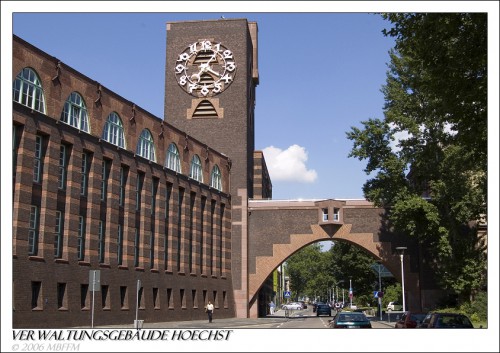

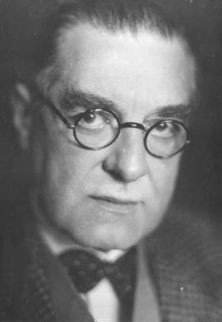 Quand la Grande Guerre se déclenche, Moeller est en train de rédiger “Der preussische Stil”, retour à l’architecture des Gilly, Schinckel et von Klenze mais aussi réflexions générales sur la germanité qui, pour trouver cette unité intérieure recherchée tout au long des huit volumes de “Die Deutschen”, doit opérer un retour à l’austérité dorienne du classicisme prussien et abandonner certaines fantaisies ou ornements prisés lors des décennies précédentes: même constat chez l’ensemble des architectes, qui abandonnent la luxuriance du Jugendstil pour une “Sachlichkeit” plus sobre. La réhabilitation du “style prussien” implique aussi l’abandon de ses anciennes postures de dandy, une exaltation des vertus familiales prussiennes, de la sobriété, de la “Kargheit”, etc. Le livre “Der preussische Stil” sera achevé pendant la guerre, sous l’uniforme. Il s’inscrit dans la volonté de promouvoir des formes nouvelles, tout en gardant un certain style et un certain classicisme, bref de lancer l’idée d’un modernisme anti-moderne (Volker Weiss). Moeller s’intéresse dès lors aux travaux d’architecture et d’urbanisme de Peter Behrens (1868-1940; photo), un homme de sa génération. Behrens est le précurseur de la “sachliche Architektur”, de l’architecture objective, réaliste. Il est aussi, pour une large part, le père du “design” moderne. Pas un objet contemporain n’échappe à son influence. Behrens donne un style épuré et sobre aux objets nouveaux, exigeant des formes nouvelles, qui meublent désormais les habitations dans les sociétés hautement industrialisées, y compris celles des foyers les plus modestes, auparavant sourds à toute esthétique (cf. H. van de Velde).
Quand la Grande Guerre se déclenche, Moeller est en train de rédiger “Der preussische Stil”, retour à l’architecture des Gilly, Schinckel et von Klenze mais aussi réflexions générales sur la germanité qui, pour trouver cette unité intérieure recherchée tout au long des huit volumes de “Die Deutschen”, doit opérer un retour à l’austérité dorienne du classicisme prussien et abandonner certaines fantaisies ou ornements prisés lors des décennies précédentes: même constat chez l’ensemble des architectes, qui abandonnent la luxuriance du Jugendstil pour une “Sachlichkeit” plus sobre. La réhabilitation du “style prussien” implique aussi l’abandon de ses anciennes postures de dandy, une exaltation des vertus familiales prussiennes, de la sobriété, de la “Kargheit”, etc. Le livre “Der preussische Stil” sera achevé pendant la guerre, sous l’uniforme. Il s’inscrit dans la volonté de promouvoir des formes nouvelles, tout en gardant un certain style et un certain classicisme, bref de lancer l’idée d’un modernisme anti-moderne (Volker Weiss). Moeller s’intéresse dès lors aux travaux d’architecture et d’urbanisme de Peter Behrens (1868-1940; photo), un homme de sa génération. Behrens est le précurseur de la “sachliche Architektur”, de l’architecture objective, réaliste. Il est aussi, pour une large part, le père du “design” moderne. Pas un objet contemporain n’échappe à son influence. Behrens donne un style épuré et sobre aux objets nouveaux, exigeant des formes nouvelles, qui meublent désormais les habitations dans les sociétés hautement industrialisées, y compris celles des foyers les plus modestes, auparavant sourds à toute esthétique (cf. H. van de Velde).
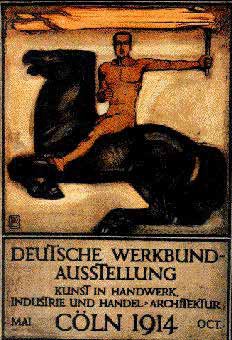 Le style préconisé par Behrens, pour les objets nouveaux, n’est pas chargé, floral ou végétal, comme le voulait l’Art Nouveau (Jugendstil) mais très dénué d’ornements, un peu à la manière futuriste, le groupe futuriste italien autour de Marinetti ayant appelé, avec virulence, à rejeter toutes les ornementations inutiles prisées par l’académisme dominant. On trouve encore dans nos magasins, aujourd’hui, bon nombre de théières, de couverts, de téléphones, d’horloges ou de pièces de vaisselle qui proviennent en droite ligne des ateliers de Behrens, avec très peu de changements. Le mouvement d’art et de design, lancé par Behrens, s’organise au sein du “Deutscher Werkbund”, où oeuvrent également des célébrités comme Walter Gropius, Ludwig Mies van der Rohe ou Le Corbusier. Le “Werkbund” travaille pour l’AEG (“Allgemeine Elektrische Gesellschaft”), qui produit des lampes, des appareils électro-ménagers à diffuser dans un public de plus en plus vaste. Le “Werkbund” préconise par ailleurs une architecture monumentale, dont les fleurons seront des usines, des écoles, des ministères et l’ambassade allemande à Saint-Pétersbourg. Pour Moeller, Behrens trouve le style qui convient à l’époque: le lien est encore évident avec le classicisme prussien, il n’y a pas rupture traumatisante, mais le résultat final est “autre chose”, ce n’est pas une répétition pure et simple.
Le style préconisé par Behrens, pour les objets nouveaux, n’est pas chargé, floral ou végétal, comme le voulait l’Art Nouveau (Jugendstil) mais très dénué d’ornements, un peu à la manière futuriste, le groupe futuriste italien autour de Marinetti ayant appelé, avec virulence, à rejeter toutes les ornementations inutiles prisées par l’académisme dominant. On trouve encore dans nos magasins, aujourd’hui, bon nombre de théières, de couverts, de téléphones, d’horloges ou de pièces de vaisselle qui proviennent en droite ligne des ateliers de Behrens, avec très peu de changements. Le mouvement d’art et de design, lancé par Behrens, s’organise au sein du “Deutscher Werkbund”, où oeuvrent également des célébrités comme Walter Gropius, Ludwig Mies van der Rohe ou Le Corbusier. Le “Werkbund” travaille pour l’AEG (“Allgemeine Elektrische Gesellschaft”), qui produit des lampes, des appareils électro-ménagers à diffuser dans un public de plus en plus vaste. Le “Werkbund” préconise par ailleurs une architecture monumentale, dont les fleurons seront des usines, des écoles, des ministères et l’ambassade allemande à Saint-Pétersbourg. Pour Moeller, Behrens trouve le style qui convient à l’époque: le lien est encore évident avec le classicisme prussien, il n’y a pas rupture traumatisante, mais le résultat final est “autre chose”, ce n’est pas une répétition pure et simple.
Henry van de Velde
Après 1918, la recherche d’un style bien particulier, d’une architecture majestueuse, monumentale et prestigieuse n’est, hélas, plus de mise: il faut bâtir moins cher et plus vite, l’art spécifique du “Deutscher Werkbund” glisse rapidement vers la “Neue Sachlichkeit”, où excelleront des architectes comme Gropius et Mies van der Rohe. L’évolution de l’architecture allemande est typique de cette époque qui part de l’Art Nouveau (Jugendstil), avec ses ornements et ses courbes, pour évoluer vers un abandon progressif de ces ornements et se rapprocher de l’austérité vitruvienne du classicisme prussien du début du 19ème, sans toutefois aller aussi loin que la “neue Sachlichkeit” des années 20 dans le rejet de toute ornementation. L’architecte Paul Schulze-Naumburg , qui adhèrera au national-socialisme, polémique contre la “Neue Sachlichkeit” en l’accusant de verser dans la “Formlosigkeit”, dans l’absence de toute forme. Dans cette effervescence, on retrouve l’oeuvre de Henry van de Velde (1863-1957), partie, elle aussi, du pré-raphaëlisme anglais, des idées de John Ruskin (dont Hedda Maase avait traduit les livres), de William Morris, etc. Fortement influencé par sa lecture de Nietzsche, van de Velde tente de traduire la volonté esthétisante et rénovatrice du penseur de Sils-Maria en participant aux travaux du Werkbund, notamment dans les ateliers de “design” et dans la “colonie des artistes” de Darmstadt, avant 1914. Revenu en Belgique peu avant la seconde guerre mondiale, il accepte de travailler au sein d’une commission pour la restauration du patrimoine architectural bruxellois pendant les années de la deuxième occupation allemande: il tombe en disgrâce suite aux cabales de collègues jaloux et médiocres qui saccageront la ville dans les années 50 et 60, tant et si bien qu’on parlera de “bruxellisation” dans le jargon des architectes pour désigner la destruction inconsidérée d’un patrimoine urbanistique. Le procès concocté contre lui n’aboutit à rien, mais van de Velde, meurtri et furieux, quitte le pays définitivement, se retire en Suisse où il meurt en 1957.
Les figures de Peter Behrens, Henry van de Velde et Paul Schulze-Naumburg méritent d’être évoquées, et situées dans le contexte de leur époque, pour montrer que les thèmes de l’architecture, de l’urbanisme et des formes du “design” participent, chez Moeller van den Bruck, à l’élaboration du “style” jungkonservativ qu’il contribuera à forger. Ce style n’est pas marginal, n’est pas l’invention de quelques individus isolés ou de petites phalanges virulentes et réduites mais constitue bel et bien une synthèse concise des innovations les plus insignes des trois premières décennies du 20ème siècle. La quête de Moeller van den Bruck est une quête de formes et de style, de forme pour un peuple enfin devenu conscient de sa force politique potentielle, équivalente en grandeur à ses capacités culturelles, pour un peuple devenu enfin capable de bâtir un “Troisième Règne” de l’esprit, au sens où l’entendait le filon philosophique, théologique et téléologique partant de Joachim de Flore pour aboutir à Dmitri Merejkovski.
La guerre au “Département de propagande”
Pendant que Moeller rédigeait la première partie de “Der preussische Stil”, l’Allemagne et l’Europe s’enfoncent dans la guerre immobile des tranchées. Le réserviste Moeller est mobilisé dans le “Landsturm”, à 38 ans, vu sa santé fragile, la réserve n’accueillant les hommes pleinement valides qu’à partir de 39 ans. Il est affecté au Ministère de la guerre, dans le département de la propagande et de l’information, l’“Auslandsabteilung”, ou le “MAA” (“Militärische Stelle des Auswärtigen Amtes”), tous deux chargés de contrer la propagande alliée. En ce domaine, les Allemands se débrouillent d’ailleurs très mal: ils publient à l’intention des neutres, Néerlandais, Suisses et Scandinaves, de gros pavés bien charpentés sur le plan intellectuel mais illisibles pour le commun des mortels: à l’ère des masses, cela s’appelle tout bonnement rater le coche. Cette propagande n’a donc aucun impact. Dans ce département, Moeller rencontre Max Hildebert Boehm, Waldemar Bonsels, Herbert Eulenberg (le nouveau mari de sa première femme), Hans Grimm, Friedrich Gundolf et Börries von Münchhausen. Tous ces hommes constitueront la base active qui militera après guerre, dans une Allemagne vaincue, celle de la République de Weimar, pour restaurer l’autonomie du politique et la souveraineté du pays.
Dans le double cadre de l’“Auslandsabteilung” et du MAA, Moeller rédige “Belgier und Balten” (= “Des Belges et des Baltes”), un appel aux habitants de Belgique et des Pays Baltes à se joindre à une vaste communauté économique et culturelle, dont le centre géographique serait l’Allemagne. Il amorce aussi la rédaction de “Das Recht der jungen Völker” (= “Le droit des peuples jeunes”), qui ne paraîtra qu’après l’armistice de novembre 1918. Le terme “jeune” désigne ici la force vitale, dont bénéficient encore ces peuples, et la “proximité du chaos”, un chaos originel encore récent dans leur histoire, un chaos bouillonnant qui sous-tend leur identité et duquel ils puisent une énergie dont ne disposent plus les peuples vieillis et éloignés de ce chaos. Pour Moeller, ces peuples jeunes sont les Japonais, les Allemands (à condition qu’ils soient “prussianisés”), les Russes, les Italiens, les Bulgares, les Finlandais et les Américains. “Das Recht der jungen Völker” se voulait le pendant allemand des Quatorze Points du président américain Woodrow Wilson. Le programme de ce dernier est arrivé avant la réponse de Moeller qui, du coup, n’apparait que comme une réponse tardive, et même tard-venue, aux Quatorze Points. Moeller prend Wilson au mot: ce dernier prétend n’avoir rien contre l’Allemagne, rien contre aucun peuple en tant que peuple, n’énoncer qu’un programme de paix durable mais tolère —contradiction!— la mutilation du territoire allemand (et de la partie germanique de l’empire austro-hongrois). Les Allemands d’Alsace, de Lorraine thioise, des Sudètes et de l’Egerland, de la Haute-Silésie et des cantons d’Eupen-Malmédy n’ont plus le droit, pourtant préconisé par Wilson, de vivre dans un Etat ne comprenant que des citoyens de même nationalité qu’eux, et doivent accepter une existence aléatoire de minoritaires au sein d’Etats quantitativement tchèque, français, polonais ou belge. Ensuite, Wilson, champion des “droits de l’homme” ante litteram, ne souffle mot sur le blocus que la marine britannique impose à l’Allemagne, provoquant la mort de près d’un million d’enfants dans les deux ou trois années qui ont suivi la guerre.
La transition “jungkonservative”
L’engagement politique “jeune-conservateur” est donc la continuation du travail patriotique et nationaliste amorcé pendant la guerre, en service commandé. Pour Moeller, cette donne nouvelle constitue une rupture avec le monde purement littéraire qu’il avait fréquenté jusqu’alors. Cependant l’attitude “jungkonservative”, dans ce qu’elle a de spécifique, dans ce qu’elle a de “jeune”, donc de dynamique et de vectrice de “transition”, est incompréhensible si l’on ne prend pas acte des étapes antérieures de son itinéraire de “littérateur” et de l’ambiance prospective de ces bohèmes littéraires berlinoises, munichoises ou parisiennes d’avant 1914. Le “Jungkonservativismus” politisé est un avatar épuré de la grande volonté de transformation qui a animé la Belle Epoque. Et cette grande volonté de transformation n’était nullement “autoritaire” (au sens où l’Ecole de Francfort entend ce terme depuis 1945), passéiste ou anti-démocratique. Ces accusations récurrentes, véritables ritournelles de la pensée dominante, ne proviennent pas d’une analyse factuelle de la situation mais découlent en droite ligne des “vérités de propagande” façonnées dans les officines françaises, anglaises ou américaines pendant la première guerre mondiale. L’Allemagne wilhelminienne, au contraire, était plus socialiste et plus avant-gardiste que les puissances occidentales, qui prétendent encore et toujours incarner seules la “démocratie” (depuis le paléolithique supérieur!). Les mésaventures judiciaires du cabaretier Wedekind, et la mansuétude relative des tribunaux chargés de le juger, pour crime de lèse-majesté ou pour offense aux bonnes moeurs, indique un degré de tolérance bien plus élevé que celui qui règnait aileurs en Europe à l’époque et que celui que nous connaissons aujourd’hui, où la liberté d’opinion est de plus en plus bafouée. Mieux, le sort des homosexuels, qui préoccupe tant certains de nos contemporains, était enviable dans l’Allemagne wilhelminienne, qui, contrairement à la plupart des “démocraties” occidentales, ne pratiquait, à leur égard, aucune forme d’intolérance. Cet état de choses explique notamment le tropisme germanophile d’un écrivain flamand (et homosexuel) de langue française, Georges Eeckoud, par ailleurs pourfendeur de la mentalité marchande d’Anvers, baptisée la “nouvelle Carthage”, pour les besoins de la polémique.
“Montagstische”, “Der Ring”
Les anciens du MAA et des autres bureaux de (mauvaise) contre-propagande allemande se réunissent, après novembre 1918, lors des “Montagstische”, des “tables du lundi”, rencontres informelles qui se systématiseront au sein d’un groupe nommé “Der Ring” (= “L’Anneau”), où l’on remarquait surtout la présence de Hans Grimm, futur auteur d’un livre à grand succès “Volk ohne Raum” (“Peuple sans espace”). Les initiatives post bellum vont se multiplier. Elles ont connu un précédent politique, la “Vereinigung für nationale und soziale Solidarität” (= “Association pour la solidarité nationale et sociale”), émanation des syndicats solidaristes chrétiens (surtout catholiques) plus ou moins inféodés au Zentrum. Le chef de file de ces “Solidarier” (“solidaristes”) est le Baron Heinrich von Gleichen-Russwurm (1882-1959), personnalité assez modérée à cette époque-là, qui souhaitait d’abord un modus vivendi avec les puissances occidentales, désir qui n’a pu se concrétiser, vu le blocus des ports de la Mer du Nord qu’ont imposé les Britanniques, pendant de longs mois après la cessation des hostilités. Heinrich von Gleichen-Russwurm réunit, au sein du “Ring”, une vingtaine de membres, tous éminents et désireux de sauver l’Allemagne du naufrage consécutif de la défaite militaire. Parmi eux, l’Alsacien Eduard Stadtler et le géopolitologue Adolf Grabowski (qui restera actif longtemps, même après la seconde guerre mondiale).
Eduard Stadtler
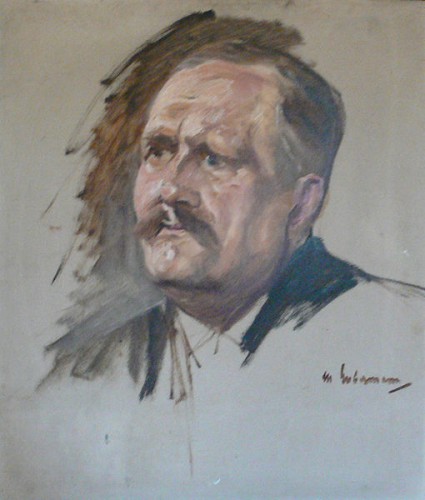 L’objectif est de penser un “nouvel Etat”, une “nouvelle économie” et une “nouvelle communauté des peuples”, où le terme “nouveau” est équivalent à celui de “jeune”, proposé par Moeller. Ce cercle attire les révolutionnaires anti-bolchéviques, anti-libéraux et anti-parlementaires. D’autres associations proposent les mêmes buts mais c’est incontestablement le “Ring” qui exerce la plus grande influence sur l’opinion publique à ce moment précis. Sous l’impulsion d’Eduard Stadtler (1886-1945, disparu en captivité en Russie), se crée, en marge du “Ring”, la “Ligue anti-bolchevique”. Natif de Hagenau en Alsace, Eduard Stadtler est, au départ, un militant catholique du Zentrum. Il est, comme beaucoup d’Alsaciens, de double culture, française et allemande. Il est détenteur du “bac” français mais combat, pendant la Grande Guerre, dans les rangs de l’armée allemande, en tant que citoyen allemand. En 1917 et en 1918, il est prisonnier en Russie. Après la paix séparée de Brest-Litovsk, signée entre les Bolcheviques et le gouvernement impérial allemand, Stadtler dirige le bureau de presse du consulat allemand de Moscou. Il assiste à la bolchévisation de la Russie, expérience qui le conduit à honnir l’idéologie léniniste et ses pratiques. Revenu en Allemagne, il fonde la “Ligue anti-bolchevique” en décembre 1918 puis rompt début 1919 avec le Zentrum de Matthias Erzberger, qui sera assassiné plus tard par les Corps Francs. Il est un de ceux qui ordonnent l’exécution des deux leaders communistes allemands, Rosa Luxemburg et Karl Liebknecht. La “Ligue” est financée par des industriels et la Banque Mankiewitz et reçoit l’appui du très influent diplomate Karl Helfferich (1872-1924), l’ennemi intime de Walther Rathenau. Stadtler est un orateur flamboyant, usant d’une langue suggestive et colorée, idéale pour véhiculer un discours démagogique. Entre 1919 et 1925, il participe activement au journal hebdomadaire des “Jungkonservativen”, “Das Gewissen” (= “Conscience”), auquel Moeller s’identifiera. Après 1925, la République de Weimar se consolide: le danger des extrémismes virulents s’estompe et la “Ligue anti-bolchevique” n’a plus vraiment raison d’être. Stadtler en tirera le bilan: “Les chefs [de cette ligue] n’étaient pas vraiment animés par un “daimon” et n’ont pu hisser de force l’esprit populaire, le tirer des torpeurs consécutives à l’effondrement allemand, pour l’amener au niveau incandescant de leurs propres volontés”. Stadtler rejoindra plus tard le Stahlhelm, fondera l’association “Langemarck” (structure paramilitaire destinée aux étudiants), sera membre de la DNVP conservatrice puis de la NSDAP; il participera aux activités de la maison d’édition Ullstein, après le départ de Koestler, quand celle-ci s’alignera sur le “renouveau national” mais Stadtler se heurtera, dans ce cadre, à la personnalité de Joseph Goebbels. Stadtler reste chrétien, fidèle à son engagement premier dans le Zentrum, fidèle aussi à son ancrage semi-rural alsacien, mais son christianisme est social-darwiniste, mâtiné par une lecture conjointe de Houston Stewart Chamberlain et des ouvrages du géopolitologue suédois Rudolf Kjellén, figure de proue des cercles germanophiles à Stockholm, et créateur de la géopolitique proprement dite, dont s’inspirera Karl Haushofer.
L’objectif est de penser un “nouvel Etat”, une “nouvelle économie” et une “nouvelle communauté des peuples”, où le terme “nouveau” est équivalent à celui de “jeune”, proposé par Moeller. Ce cercle attire les révolutionnaires anti-bolchéviques, anti-libéraux et anti-parlementaires. D’autres associations proposent les mêmes buts mais c’est incontestablement le “Ring” qui exerce la plus grande influence sur l’opinion publique à ce moment précis. Sous l’impulsion d’Eduard Stadtler (1886-1945, disparu en captivité en Russie), se crée, en marge du “Ring”, la “Ligue anti-bolchevique”. Natif de Hagenau en Alsace, Eduard Stadtler est, au départ, un militant catholique du Zentrum. Il est, comme beaucoup d’Alsaciens, de double culture, française et allemande. Il est détenteur du “bac” français mais combat, pendant la Grande Guerre, dans les rangs de l’armée allemande, en tant que citoyen allemand. En 1917 et en 1918, il est prisonnier en Russie. Après la paix séparée de Brest-Litovsk, signée entre les Bolcheviques et le gouvernement impérial allemand, Stadtler dirige le bureau de presse du consulat allemand de Moscou. Il assiste à la bolchévisation de la Russie, expérience qui le conduit à honnir l’idéologie léniniste et ses pratiques. Revenu en Allemagne, il fonde la “Ligue anti-bolchevique” en décembre 1918 puis rompt début 1919 avec le Zentrum de Matthias Erzberger, qui sera assassiné plus tard par les Corps Francs. Il est un de ceux qui ordonnent l’exécution des deux leaders communistes allemands, Rosa Luxemburg et Karl Liebknecht. La “Ligue” est financée par des industriels et la Banque Mankiewitz et reçoit l’appui du très influent diplomate Karl Helfferich (1872-1924), l’ennemi intime de Walther Rathenau. Stadtler est un orateur flamboyant, usant d’une langue suggestive et colorée, idéale pour véhiculer un discours démagogique. Entre 1919 et 1925, il participe activement au journal hebdomadaire des “Jungkonservativen”, “Das Gewissen” (= “Conscience”), auquel Moeller s’identifiera. Après 1925, la République de Weimar se consolide: le danger des extrémismes virulents s’estompe et la “Ligue anti-bolchevique” n’a plus vraiment raison d’être. Stadtler en tirera le bilan: “Les chefs [de cette ligue] n’étaient pas vraiment animés par un “daimon” et n’ont pu hisser de force l’esprit populaire, le tirer des torpeurs consécutives à l’effondrement allemand, pour l’amener au niveau incandescant de leurs propres volontés”. Stadtler rejoindra plus tard le Stahlhelm, fondera l’association “Langemarck” (structure paramilitaire destinée aux étudiants), sera membre de la DNVP conservatrice puis de la NSDAP; il participera aux activités de la maison d’édition Ullstein, après le départ de Koestler, quand celle-ci s’alignera sur le “renouveau national” mais Stadtler se heurtera, dans ce cadre, à la personnalité de Joseph Goebbels. Stadtler reste chrétien, fidèle à son engagement premier dans le Zentrum, fidèle aussi à son ancrage semi-rural alsacien, mais son christianisme est social-darwiniste, mâtiné par une lecture conjointe de Houston Stewart Chamberlain et des ouvrages du géopolitologue suédois Rudolf Kjellén, figure de proue des cercles germanophiles à Stockholm, et créateur de la géopolitique proprement dite, dont s’inspirera Karl Haushofer.
Du “Jungkonservativismus” au national-bolchevisme
Après le ressac de la “Ligue anti-bolchevique”, les “Jungkonservativen” se réunissent au sein du “Juni-Klub”. Dans le paysage politique allemand, le Zentrum est devenu un parti modéré (c’est pour cela que Stadtler le quitte en dénonçant le “modérantisme” délétère d’Erzberger). La gauche libérale et nationale de Naumann, théoricien de l’union économique “mitteleuropéenne” pendant la première guerre mondiale, ne se profile pas comme anti-parlementaire. Naumann veut des partis disciplinés sinon on aboutit, écrit-il à ses amis, à l’anarchie totale. Les “Jungkonservativen”, une fois le danger intérieur bolchevique éliminé en Allemagne, optent pour un “national-bolchevisme”, surtout après l’occupation de la Ruhr par les Français et l’exécution d’Albert-Leo Schlageter, coupable d’avoir commis des attentats en zone occupée. Le martyr de Schlageter provoque l’union nationale en Allemagne: nationalistes et communistes (avec Karl Radek) exaltent le sacrifice de l’officier et fustigent la “France criminelle”. Les “Jungkonservativen” glissent donc vers le “national-bolchevisme” et se rassemblent dans le cadre du “Juni-Klub”. Ce club est composé d’anciens “Solidarier” et de militants de diverses associations patriotiques et étudiantes, de fédérations d’anciens combattants. Max Hildebert Boehm y amène des Allemands des Pays Baltes, qui seront fort nombreux et y joueront un rôle de premier plan. Arthur Moeller van den Bruck y amène, lui, ses amis Conrad Ansorge, Franz Evers, Paul Fechter, Rudolf Pechel et Carl Ludwig Schleich. L’organisateur principal du club est von Gleichen. Le nom de l’association, “Juin”, vient du mois de juin 1919, quand le Traité de Versailles est signé. A partir de ce mois de juin 1919, les membres du club jurent de lutter contre tous les effets du Traité, du “Diktat”. Ils s’opposent au “November-Klub” des socialistes, qui se réfèrent au mois de la capitulation et de la proclamation de la république en 1918. Ce “Juni-Klub” n’a jamais publié de statuts ou énoncé des principes. Il a toujours gardé un caractère informel. Ses activités se bornaient, dans un premier temps, à des conversations à bâtons rompus.
Dictionnaire politique et revue “Gewissen”
La première initiative du “Juni-Klub” a été de publier un dictionnaire politique, tiré à 125.000 exemplaires. Les membres du club participent à la rédaction de l’hebdomadaire “Gewissen”, fondé le 9 avril 1919 par Werner Wirth, ancien officier combattant. Après la prise en charge de l’hebdomadaire par Eduard Stadtler, le tirage est de 30.000 exemplaires déclarés en 1922 (on pense qu’en réalité, il n’atteignait que les 4000 exemplaires vendus). La promotion de cette publication était assurée par la “Société des Amis de Gewissen”. Moeller van den Bruck, homme silencieux, piètre orateur et timide, prend sur ses épaules tout le travail de rédaction; la tâche est écrasante. Une équipe d’orateurs circule dans les cercles d’amis; parmi eux: Max Hildebert Boehm, le scientifique Albert Dietrich, le syndicaliste Emil Kloth, Hans Roeseler, Joachim Tiburtius et l’ancien communiste devenu membre du “Juni-Klub”, Fritz Weth. Le public qui assiste à ces conférences est vaste et élitaire mais provient de tous les horizons politiques de l’Allemagne de la défaite, socialistes compris. Un tel aréopage serait impossible à reconstituer aujourd’hui, vu l’intolérance instaurée partout par le “politiquement correct”. Reste une stratégie possible dans le contexte actuel: juxtaposer des textes venus d’horizons divers pour mettre en exergue les points communs entre personnalités appartenant à des groupes politiques différents et antagonistes mais dont les réflexions constituent toutes des critiques de fond du nouveau système globalitaire et du nouvel agencement du monde et de l’Europe, voulu par les Bush (père et fils), par Clinton et Obama, comme le nouvel ordre de la victoire avait été voulu en 1919 par Wilson et Clémenceau.
Diverses initiatives
Les années 1919 et 1920 ont été les plus fécondes pour le “Juni-Klub” et pour “Gewissen”. Dans la foulée de leurs activités, se crée ensuite le “Politisches Kolleg” (= “Collège politique”), dont le modèle était français, celui de l’“Ecole libre des sciences politiques”, fondé à Paris en 1872, après la défaite de 1871. Le but de cette “Ecole libre” était de faire émerger une élite revencharde pour la France. En 1919, les Allemands, vaincus à leur tour, recourent au même procédé. L’idée vient de Stadtler, qui connait bien la France, et de son professeur, le catholique, issu du Zentrum comme lui, Martin Spahn (1875-1945), fils d’une des figures fondatrices du Zentrum, Peter Spahn (1846-1925). Le national-libéral Friedrich Naumann fonde de son côté la “Staatsbürgerschule” (= “L’école citoyenne”), tandis qu’Ernst Jäkh, qui fut également propagandiste pendant la première guerre mondiale et spécialisé dans les relations germano-turques, crée la “Hochschule für Politik” (= “Haute Ecole de Politique”). Les passerelles sont nombreuses entre toutes ces initiatives. Le 1 novembre 1920 nait, sous la présidence de Martin Spahn, le “Politisches Kolleg für nationalpolitische Schulungs- und Bildungsarbeit” (= “Collège politique pour l’écolage et la formation nationales-politiques”). Les secrétaires sont von Gleichen et von Broecker. Mais c’est Moeller van den Bruck, une fois de plus, qui est la cheville ouvrière de l’ensemble: il garde la cohérence du “Juni-Klub”, du “Politisches Kolleg” et du “Ring”, qui tous prennent de l’extension et nécessitent un financement accru. Ecrasé sous le travail, Moeller s’effondre, tombe gravement malade. Du coup, les liens entre membres et entre structures similaires se disloquent. En décembre 1924, le “Juni-Klub” se transforme en “Herren-Klub”, glissement que Moeller juge “réactionnaire”, contraire aux principes fondamentaux du “Jungkonservativismus” et à la stratégie “nationale-bolchevique”. La maladie, la déception, l’épuisement physique et moral, la mort de son fils Wolfgang souffrant de tuberculose (il était né de son premier mariage avec Hedda Maase) sont autant de coups durs qui l’amènent à se suicider le 30 mai 1925.
Immédiatement après la mort de Moeller van den Bruck, Max Hildebert Boehm quitte le “Politisches Kolleg” et fonde une organisation nouvelle, l’“Institut für Grenz- und Auslandsstudien” (= “Institut pour les études des frontières et de l’étranger”). L’ensemble des structures supervisées par Moeller van den Bruck se disloque. Une partie des membres se tourne vers la “Hochschule für Politik” d’Ernst Jäkh. Le corporatiste moderne issu du Zentrum Heinz Brauweiler et l’Alsacien Eduard Stadtler rejoignent tous deux le Stahlhelm, puis la DNVP.
“Altkonservativismus” et “Jungkonservativismus”
Quelles ont été les idées de cette nébuleuse patronnée par Moeller van den Bruck? Comment se sont articulées ces idées? Quelle est la teneur du “Jungkonservativismus”, parfois appelé “nouvelle droite” ou “jeune droite”? Sa qualité de “jung”, de “jeune”, le distingue forcément du “Konservativismus” tout court, ou de l’“Altkonservativismus” (le “vieux-conservatisme”). On peut définir le “Konservativismus” comme l’ensemble des réactions politiques à la révolution française et/ou aux effets de cette révolution au cours du 19ème siècle. Comme l’a un jour souligné dans les colonnes de “Criticon” et de “Vouloir” le polémologue suisse Jean-Jacques Langendorf, la contre-révolution est un véritable kaléidoscope d’idées diverses, hétérogènes. On y trouve évidemment la critique de l’Anglais Edmund Burke qui déplore la rupture de continuité provoquée par la révolution mais, comme le signalait naguère, à son propos, le Prof. Claude Polin à Izegem lors d’un colloque de la “nouvelle droite” flamande, si les forces qui ont provoqué la rupture parviennent à assurer une continuité nouvelle, cette continuité, parce qu’elle est continuité, mérite à son tour d’être conservée, puisqu’elle devient “légitime”, tout simplement parce qu’elle a duré quelques décennies. Pour Polin, cette sacralisation d’idées révolutionnaires, tout simplement parce qu’elles ont duré, prouve qu’il n’y a pas véritablement de “conservatisme” britannique et burkéen: nous avons alors affaire à une justification du “révolutionarisme institutionalisé”, ce que confirme le folklore de la république française actuelle et l’usage immodéré des termes “République”, “républicain”, “idéal républicain”, “valeurs républicaines”, etc. que l’on juxtapose à ceux de “laïcisme” et de “laïcité”. Cet usage est inexportable et ne permet pas de forger une “Leitkultur” acceptée de tous, surtout de la majorité autochtone, tandis que les communautés immigrées musulmanes rejettent également ce fatras laïciste, dégoûtées par l’écoeurante platitude de ce discours, partagé par toutes les gauches, mêmes les plus intéressantes, comme celles de Régis Debray ou Elizabeth Lévy (cf. le mensuel “Le Causeur”).
Dans le kaléidoscope de la contre-révolution, il y a ensuite l’organicisme, propre du romantisme post-révolutionnaire, incarné notamment par Madame de Staël, et étudié à fond par le philosophe strasbourgeois Georges Gusdorf. Cet organicisme génère parfois un néo-médiévisme, comme celui chanté par le poète Novalis. Qui dit médiévisme, dit retour du religieux et de l’irrationnel de la foi, force liante, au contraire du “laïcisme”, vociféré par le “révolutionarisme institutionalisé”. Cette revalorisation de l’irrationnel n’est pas nécessairement absolue ou hystérique: cela veut parfois tout simplement dire qu’on ne considère pas le rationalisme comme une panacée capable de résoudre tous les problèmes. Ensuite, le vieux-conservatisme rejette l’idée d’un droit naturel mais non pas celle d’un ordre naturel, dit “chrétien” mais qui dérive en fait de l’aristotélisme antique, via l’interprétation médiévale de Thomas d’Aquin. Ce mélange de thomisme, de médiévisme et de romantisme connaîtra un certain succès dans les provinces catholiques d’Allemagne et dans la zone dite “baroque” de la Flandre à l’Italie du Nord et à la Croatie.
“Fluidifier les concepts”
Tels sont donc les ingrédients divers de la “vieille droite” allemande, de l’Altkonservativismus. Pour Moeller, ces ingrédients ne doivent pas être rejetés a priori: il faut plutôt les présenter sous d’autres habits, en les dynamisant par la volonté (soit par l’idée post-nietzschéenne d’“assaut” chez Heidegger, formulée bien après après le suicide de Moeller, qui la devinait, chez qui elle était en germe). L’objectif philosophique fondamental, diffus, des courants de pensée, dans lesquels Moeller a été plongé depuis son arrivée à Berlin, à l’âge de vingt ans, est, comme le dira Heidegger plus tard, de “fluidifier les concepts”, de leur ôter toute rigidité inopérante. Le propre d’un “jeune-conservatisme” est donc, en fait, de briser les fixismes et de rendre un tonus offensif à des concepts que le 19ème siècle avait contribué à rendre désespérément statiques. Cette volonté de “fluidifier” les concepts ne se retrouvait pas qu’à droite de l’échiquier politique, à gauche aussi, on tentait de redynamiser un marxisme ou un socialisme que les notables et les oligarques partisans avaient rigidifié (cf. les critiques pertinentes de Roberto Michels). La politique est un espace de perpétuelles transitions: les vrais hommes politiques sont donc ceux qui parviennent à demeurer eux-mêmes, fidèles à des traditions —à une “Leitkultur” dirait-on aujourd’hui— mais sans figer ces traditions, en les maintenant en état de dynamisme constant, bref, répétons-le une fois de plus, l’état de dynamisme d’une anti-modernité moderniste.
De même, le regard que doivent poser les hommes politiques “jeunes-conservateurs” sur les peuples voisins de l’Allemagne est un regard captateur de dynamiques et non un regard atone, habitué à ne voir qu’un éventail figé de données et à le croire immuable. Pour Moeller, l’homme politique “jeune-conservateur” cherche en permanence à comprendre l’existence, les dimensions existentielles (et pas seulement les “essences” réelles ou imaginaires) des peuples et des nations ainsi que des personnalités marquantes de leur histoire politique, tout cela au départ d’un donné historique précis (localisé dans un espace donné qui n’est pas l’espace voisin ou l’espace éloigné ou l’espace du globe tout entier, comme le souhaiteraient les cosmopolites).
L’ordre naturel n’est pas immuable
Le “Jungkonservativismus” se démarque de l’“Altkonservativismus” en ne considérant pas l’ordre naturel comme immuable. Une telle vision de l’ordre naturel est jugée fausse par les “jeunes-conservateurs”, qui n’entendent pas retenir son caractère “immuable”, l’observation des faits de monde dans la longue période de transition que furent les années 1880-1920 n’autorisant pas, bien entendu, un tel postulat. De plus, la physique de la deuxième révolution thermodynamique ne retient plus la notion d’un donné physique, géographique, naturel, biologique stable. Au contraire, toutes les réalités, fussent-elles en apparence stables dans la durée, sont désormais considérées comme mouvantes. L’attitude qui consiste à se lamenter face à la fluidification des concepts, à déplorer la disparition de stabilités qu’on avait cru immuables, est inepte. Vouloir arrêter ou ralentir le flux du réel est donc une position inféconde pour les “jeunes-conservateurs”. Arthur Moeller van den Bruck exprime le sentiment de son “Jungkonservativismus” en écrivant que “les conservateurs ont voulu arrêter la révolution, alors qu’ils auraient dû en prendre la tête”. Il ne s’agit plus de construire des barrages, d’évoquer un passé révolu, de faire du médiévisme religieux ou, pour s’exprimer comme les futuristes dans la ligne de Marinetti, de se complaire dans le “passatisme”, dans l’académisme répétitif. Moeller ajoute que le piétisme des protestants prussiens est également une posture devenue intenable.
Troisième Voie
Vers 1870, les premiers éléments de nationalisme s’infiltrent dans la pensée conservatrice, alors que les vieux-conservateurs considéraient que toute forme de nationalisme était “révolutionnaire”, située à gauche de l’échiquier politique. Le nationalisme était effectivement une force de gauche en 1848, organisé qu’il était non en partis mais en associations culturelles ou, surtout, en ligues de gymnastique, en souvenir de “Turnvater Jahn”, l’hébertiste allemand anti-napoléonien. Les “vieux-conservateurs” considéraient ce nationalisme virulent et quarante-huitard comme trop dynamique et trop “bousculant” face aux institutions établies, qui n’avaient évidemment pas prévu les bouleversements de la société européenne dans la seconde moitié du 19ème siècle. Arthur Moeller van den Bruck propose une “troisième voie”: la répétition des ordres metternichien, bismarckien et wilhelminien est devenue impossible. Les “Jungkonservativen” doivent dès lors adopter une position qui rejette tout à la fois la réaction, car elle conduit à l’immobilisme, et la révolution, parce qu’elle mène au chaos (au “Règne de Cham” selon Merejkovski). Cette “troisième voie” (“Dritter Weg”) rejette le libéralisme en tant que réduction des activités politiques à la seule économie et en tant que force généralisant l’abstraction dans la société (en multipliant des facteurs nouveaux et inutiles, dissolvants et rigidifiants, comme les banques, les compagnies d’assurance, la bureaucratie, les artifices soi-disant “rationnels”, etc., dénoncés par la sociologie de Georges Simmel); le libéralisme est aussi le terreau sur lequel s’est développé ce que l’on appelait à l’époque le “philistinisme”. Carlyle, Matthew Arnold et les Pré-Raphaëlites anglais autour de Ruskin et de Morris avaient dénoncé l’effondrement de toute culture vraie, de toute communauté humaine saine, sous les coups de la “cash flow society”, de l’utilitarisme, du mercantilisme, etc. dans l’Angleterre du 19ème, première puissance libérale et industrielle du monde moderne. Comme l’avait envisagé Burke, ce libéral-utilitarisme était devenu une “continuité” et, à ce titre, une “légitimité”, justifiant plus tard l’alliance des libéraux (ou des “vieux-libéraux”) avec le vieux conservatisme. Les “Jungkonservativen” allemands d’après 1918 ne veulent pas d’une telle alliance, qui ne défend finalement rien de fondamental, uniquement des intérêts matériels et passagers, au détriment de tout principe (éternel). Pour défendre ces principes éternels, battus en brèche par le libéralisme, il faut recourir à des réflexes nationalistes et/ou socialistes, lesquels bousculent les concepts impassables du conservatisme sans les nier et en les dynamisant.
Critique du libéralisme
Le libéralisme, dans l’optique “jungkonservative”, repose sur l’idée d’un progrès qui serait un cheminement inéluctable vers du “meilleur”, du moins un “meilleur” quantitatif et matériel, en aucun cas vers une amélioration générale du sort de l’humanité sur un plan qualitatif et spirituel. L’idée de progrès, purement quantitative, dévalorise automatiquement le passé, les acquis, les valeurs héritées, tout comme l’idéal marchand, l’idéal spéculateur, du libéralisme dévalorise les valeurs éthiques et esthétiques, qui seules donnent sel au monde. Pour Moeller van den Bruck, c’est là la position la plus inacceptable des libéraux. Ignorer délibérément le passé, dans ce qu’il a de positif comme dans ce qu’il a de négatif, est une posture à rejetter à tout prix. Le libéral veut donc que l’on ignore obligatoirement tous les acquis du passé: son triomphe dans les premières années de la République de Weimar fait craindre une éradication totale et définitive des mémoires collectives, de l’identité allemande. Face à cette attitude, le “Jungkonservativismus” doit devenir le gardien des formes vivantes, des matrices qui donnent vie aux valeurs, pour ensuite les conduire jusqu’à leur accomplissement, leur paroxysme; il doit appeler à la révolte contre les forces politiques qui veulent que ces formes et matrices soient définitivement oubliées et ignorées; il doit également dépasser ceux qui entendent garder uniquement des formes mortes, relayant de la sorte le message des avant-gardes naturalistes, symbolistes, expressionnistes et futuristes. Ce recours implicite aux audaces des avant-gardes fait que le “Jungkonservativismus” n’est pas un “cabinet des raretés” (“eine Raritätenkammer”), un musée exposant des reliques mortes, mais un atelier (“ein Werkstatt”), où l’on bâtit l’avenir, n’est pas un réceptacle de quiétisme mais une forge bouillonnante où l’on travaille à construire une Cité plus conforme au “Règne de l’Esprit”. Pour les “jeunes-conservateurs”, les formes politiques sont des moyens, non des fins car si elles sont de simples fins, elles butent vite, à très court terme, contre leur finitude, et deviennent stériles et répétitives (comme à l’ère du wilhelminisme). Il faut alors trouver de nouvelles formes politiques pour lutter contre celles qui ont figé les polities, après avoir été, le temps de trouver leur “fin”, facteurs éphémères de fluidification des concepts.
Monarchiste ou républicain?
Alors, dans le contexte des années 1919-1925, le “Jungkonservativismus” est-il monarchiste ou républicain? Peu importe! L’idéal dynamique du “Jungkonservativismus” peut s’incarner dans n’importe quelle forme d’Etat. Comment cette perspective s’articule-t-elle chez Moeller van den Bruck? Son “Troisième Reich” pourra être monarchiste mais non pas wilhelminien, non pas nécessairement lié aux Hohenzollern. Il pourra viser l’avènement d’un “Volkskaiser”, issu d’une autre lignée aristocratique ou issu directement du peuple: cette idée est un héritage des écrits révolutionnaires de Wagner à l’époque des soulèvements de 1848. L’Etat est alors, dans une telle perspective, de forme républicaine mais il a, à sa tête, un monarque plébiscité. En dépit de son anti-wilhelminisme, Moeller envisage un Volkskaiser ou un “Jugendkaiser”, un empereur de la jeunesse, idée séduisante pour les jeunes du Wandervogel et de ses nombreux avatars et pour bon nombre de sociaux-démocrates, frottés de nietzschéisme. Contrairement à ce que voulaient les révolutionnaires français les plus radicaux à la fin du 18ème siècle, en introduisant leur calendrier révolutionnaire, l’histoire, pour Moeller, ne présente pas de nouveaux commencements: elle est toujours la continuité d’elle-même; les communautés politiques, les nations, sont immergées dans ce flot, et ne peuvent s’y soustraire. Il paraît par ailleurs préférable de parler de “continuité” plutôt que d’ “identité”, dans un tel contexte: les “jungkonservativen” sont bel et bien des “continuitaires”, en lutte contre ceux qui figent et qui détruisent en rigidifiant. Moeller van den Bruck préconise donc une sorte d’archéofuturisme (le néo-droitiste Guillaume Faye, à ce titre, s’inscrit dans sa postérité): les forces du passé allemand et européen sont mobilisées en des formes nouvelles pour établir un avenir non figé, en perpétuelle effervescence constructive. Moeller mobilise les “Urkräfte”, les forces originelles, qu’il appelle parfois, avec un lyrisme typique de l’époque, les “Urkräfte” barbares ou les “Urkräfte” de sang, destinées à briser les résistances “passatistes” (Marinetti).
De Novalis au wagnérisme
Les positions “bousculantes” du “Jungkonservativismus” interpellent aussi le rapport au christianisme. La révolution française avait appelé à lutter contre les “superstitions” de la religion traditionnelle de l’ancien régime: les réactions des révolutionnaires déçus par la violence jacobine et des contre-révolutionnaires, à l’époque romantique du début du 19ème siècle, vont provoquer un retour à la religion. Le romantisme était au départ en faveur de la révolution mais les débordements et les sauvageries des révolutionnaires français vont décevoir, ce qui amènera plus d’un ex-révolutionnaire romantique à retourner au catholicisme, à se convertir à l’idée d’une Europe d’essence chrétienne (Novalis). Dans une troisième étape, les ex-révolutionnaires et certains de leurs nouveaux alliés contre-révolutionnaires vont parfois remplacer Dieu et l’Eglise par le peuple et la nation: ce sera le romantisme nationalitaire, révolutionnaire non pas au sens de 1789 mais de 1848, celui de Wagner, qui, plus tard, abandonnera toutes références au révolutionarisme pour parier sur l’univers mythologique et “folciste” de ses opéras, censés révéler au peuple les fondemets mêmes de son identité, la matrice de la continuité dans laquelle il vit et devra inéluctablement continuer à vivre, sinon il court le risque d’une disparition définitive en tant que peuple. La fusion d’une volonté de jeter bas le régime metternichien du début du 19ème siècle et du recours aux racines germaniques les plus anciennes est le legs du wagnérisme.
Déchristianisation et nietzschéanisation
Après 1918, après les horreurs de la guerre des tranchées à l’Ouest, on assiste à un abandon généralisé du christianisme: peuples protestants et catholiques abandonnent les références religieuses piétistes ou sulpiciennes, impropres désormais à apaiser les âmes ensauvagées par une guerre atroce. Ou ne retiennent plus du christianisme que la virulence de certains polémistes comme Léon Bloy ou Jules Barbey d’Aurevilly, comme ce sera le cas dans les filons pré-rexistes en Belgique francophone ou chez les adeptes conservateurs-révolutionnaires du prêtre Wouter Lutkie aux Pays-Bas. Sans nul doute parce que la fougue de Bloy et de Barbey d’Aurevilly marche au vitriol, qui dissout les certitudes des “figés”. La déchristianisation d’après 1918 est tributaire, bien évidemment, de l’influence, de plus en plus grande, de Nietzsche. Le processus de sécularisation et de nietzschéanisation s’infiltre profondément dans les rangs “conservateurs”, les muant en “conservateurs-révolutionnaires”. On en vient à rejeter la promesse chrétienne d’un monde meilleur, “quiet” (dépourvu d’inquiétude incitant à l’action) et “bonheurisant”. Cette promesse est, aux yeux des nietzschéens, la consolation des faibles (cf. les thèses de Nietzsche dans “L’Antéchrist” et “La généalogie de la morale”). Moeller n’a pas une position aussi tranchée que les nietzschéens les plus virulents. Il demeure le lecteur le plus attentif de Dostoïevski, qui ne partageait pas l’anti-christianisme farouche de Nietzsche. Il garde sans doute aussi en mémoire les positions de Barbey d’Aurevilly, qu’il a traduit avec Hedda Maase à Berlin entre 1896 et 1902. Pour Moeller la culture allemande (et européenne) est le produit d’une fusion: celle de l’antiquité hellénique et romaine et du christianisme. Pour lui, il n’est ni pensable ni souhaitable que nous ne soyons plus l’incarnation de cette synthèse. L’objectif de la germanité innovante qu’il a toujours appelé de ses voeux est de forger une “Wirklichkeitsreligion”, une “religion du réel”, comme le suggéraient par ailleurs bon nombre d’ouvrages parus chez l’éditeur Eugen Diederichs à Iéna.
Cependant le christianisme n’est pas “national”, c’est-à-dire ne cherche pas à s’ancrer dans un humus précis, inscrit dans des limites spatio-temporelles repérables. Il est même anti-national sauf quand certaines forces de l’Eglise cherchent à protéger des catholiques vivant sous un statut de minorité opprimée ou marginalisée comme les Irlandais au Royaume-Uni, les Croates dans le nouveau royaume de Yougoslavie à dominante serbe ou les Flamands dans la Flandre des “petits vicaires” en rébellion contre leur hiérarchie francophile (Mercier), face aussi à un Etat à dominante non catholique ou trop prompt à négocier des compromis avec la part laïque, voire maçonnique, de l’établissement belge. Même scénario dans la sphère orthodoxe: les églises auto-céphales s’épaulent contre les offensives catholiques ou musulmanes. Mais une chose était désormais certaine, entre 1918 et 1925: depuis la révolution française, le christianisme a échoué à donner forme au cosmopolitisme dominant, qui est de facture libérale et laïque ou révolutionnaire et communiste (trotskiste). Le christianisme ne peut se sauver du naufrage que s’il adopte des contenus nationaux: c’est à quoi s’était employé le programme des éditions Eugen Diederichs, en rappelant que la conversion des Germains d’Europe centrale ne s’était pas faite par l’Evangile tel qu’on nous le lit encore lors des offices religieux mais par une version aujourd’hui oubliée, l’Heliand, le Sauveur, figure issue de la religiosité iranienne-sarmate importée en Europe par les cavaliers recrutés par Rome dans les steppes est-européennes et dont l’archéologie contemporaine révèle le rôle crucial dans l’émergence de l’Europe médiévale, non seulement autour du mythe arthurien mais aussi dans la geste des Francs et des Sicambres. Le Christ y est effectivement un homme à cheval qui pérégrine, armé et flanqué d’une douzaine de compagnons bien bâtis.
Ensuite, la conversion d’une vaste zone aujourd’hui catholique, de Luxueil-les-Bains au Tyrol autrichien, a été l’oeuvre de moines irlandais, dont le christianisme était quelque peu différent de celui de Rome. Le christianisme doit donc se “nationaliser”, comme il s’était germanisé (sarmatisé?) aux temps de la conversion, pour être en adéquation avec la spécificité “racique” des nouvelles ouailles nord-européennes ou issues de la cavalerie des Légions de l’Urbs. De même, le socialisme, lui aussi, doit puiser ses forces bousculantes dans un corpus national, religieux ou politique voire esthétique (avec impulsion nietzschéenne). L’apport “belge” (flamand comme wallon) est important à ce niveau: Eugen Diederichs avait fait traduire De Coster, Maeterlinck, De Man, Verhaeren et bien d’autres parce qu’ils apportaient un supplément de tonus à la littérature, à la religiosité “réalitaire” et à un socialisme débarrassé de ses oeillères matérialistes donc de ses cangues aussi pesantes que les bigoteries sulpiciennes de la religion conventionnelle, celle des puritains anglais ou suédois, fustigés par Lawrence et Strindberg, celle de Pobedonostsev, fustigée par Merejkovski et Rozanov.
Théologie et politique en Europe occidentale de 1919 aux années 60
Parce que les “Jungkonservativen” abandonnent les formes mortes du protestantisme et du catholicisme du 19ème siècle, les “Altkonservativen” subsistants ne les considèrent plus comme des “Konservativen” et s’insurgent contre l’audace jugée iconoclaste de leurs affirmations. Moeller van den Bruck rétorque: “Si le conservatisme ne signifie plus le maintien du statu quo à tout prix mais la fusion évolutionnaire du neuf avec la tradition vivante et, de même, induit le don de sens à cette fusion, alors il faut poser la question: un conservatisme occidental est-il possible sans qu’il ne soit orienté vers le christianisme?”. Moeller répond évidemment: “Oui”. Il avait d’abord voulu créer un mythe national, avec les huit volumes de “Die Deutschen”, incluant des éléments chrétiens, surtout luthériens. C’était le mythe de l’Allemand en perpétuelle rébellion contre les pesanteurs d’une époque, de son époque, dominée politiquement ou intellectuellement par l’étranger roman, celui-ci étant, alors, par déduction arbitraire, le vecteur de toutes les pesanteurs, de toutes les lourdeurs qui emprisonnent l’âme ou l’esprit, comme l’Asiatique, pour les Russes, était vecteur d’“enchinoisement”. Après la mort de Moeller, et dans le sillage des livres prônant un renouveau religieux réalitaire et enraciné, une théologie germanisée ou “aryanisée” fera florès sous le national-socialisme, une théologie que l’on analyse à nouveau aujourd’hui en la dépouillant, bien entendu, de toutes les tirades simplificatrices rappelant lourdement la vulgate du régime hitlérien. L’objectif des théologiens contemporains qui se penchent sur les oeuvres de leurs homologues allemands alignés sur le nouveau régime des années 30 vont au fond de cette théologie, ne se contentent pas de critiquer ou de répéter le vocabulaire de surface de ces théologies “aryanisées” ou germanisées, qui peut choquer aujourd’hui, mais veulent examiner comment on a voulu donner une substance incarnée à cette théologie (au nom du mythe chrétien de l’incarnation); il s’agit donc là d’une théologie qui réclame l’ancrage du religieux dans le réel politique, ethnique, linguistique et l’abandon de toute posture déréalisante, “séraphique” serait-on tenté de dire.
Après 1945, les discours officiels des églises protestantes et catholique s’alignent sur l’“humanisme” ou du moins sur ce qu’il est convenu de définir comme tel depuis les réflexions et les “aggiornamenti” de Jacques Maritain. Cet humanisme a été l’idéologie officielle des partis démocrates-chrétiens en Europe après 1945: on avait espéré, de cet humanisme, aligné sur Gabriel Marcel ou Jacques Merleau-Ponty, qu’il soit un barrage contre l’envahissement de nos polities par tous les matérialismes privilégiant l’avoir sur l’être. L’offensive néo-libérale, depuis la fin des années 70 du 20ème siècle, a balayé définitivement ces espoirs. L’“humanisme” des démocrates-chrétiens a été pure phraséologie, pure logorrhée de jongleurs politiciens, ne les a certainement pas empêchés de se vautrer dans les pires des corruptions, à l’instar de leurs adversaires (?) socialistes. Ils n’ont pas été capables de donner une réponse au néo-libéralisme ou, pire, les quelques voix qui se sont insurgées, même depuis les hautes sphères du Vatican, se sont perdues dans le tumulte cacophonique des médias: l’analyse de Moeller van den Bruck est donc la bonne, le libéralisme dissout tout, liens communautaires entre les hommes comme réflexes religieux.
Le jugement d’Armin Mohler
Armin Mohler, ancien secrétaire d’Ernst Jünger et auteur du manuel de référence incontournable, “Die konservative Revolution in Deutschland 1918-1932”, dresse le bilan de la déchristianisation graduelle et irréversible de la sphère politique, y compris en milieux “conservateurs”, toutes tendances confondues. Pour Mohler, le christianisme s’est effiloché et ne se maintient que par la “Trägheit der Wirklichkeit”, par la lenteur et la pesanteur du réel. Mohler: “Le christianisme, dans l’espace où tombent les décisions, a perdu sa position jadis englobante et, depuis lors, il n’est plus qu’une force parmi d’autres, y compris sous les oripeaux de ses traditions les plus fortes ou de ses ‘revivals’, tels le néo-thomisme ou la théologie dialectique”. Pire: “Ce processus [d’effilochement] s’est encore accéléré par l’effondrement de l’héritage antique, qui avait aidé le christianisme au fil des siècles à se donner forme. Les éléments de jadis sont donc encore là mais isolés, sans centre fédérateur, et virevoltent littéralement de manière fort désordonnée dans l’espace (politique/idéologique). Le vieux cadre de l’Occident comme unité nourrie par la migration des peuples [germaniques] en tant qu’éléments neufs dans l’histoire, est détruite et il n’y a pas encore de nouvelle unité en vue”. Mohler annonçait, par ces constats, la rupture entre la “nouvelle droite” et l’espace théologico-politique chrétien. Eugen Diederichs et Moeller van den Bruck ont également eu raison de dire que le christianisme devait être étoffé d’éléments réalitaires, comme a tenté de le faire à sa manière et sans générer d’“hérésie”, le Prof. Julien Ries, à l’Université de Louvain, notamment dans “Les chemins du sacré dans l’histoire” (Aubier, 1985): dans cet ouvrage, comme dans d’autres, il cherchait à cerner la notion de sacré dans le monde indo-européen suite aux travaux de Mircea Eliade. La mise en exergue de ces multiples manières indo-européennes d’appréhender le sacré, permetterait d’incarner celui-ci dans les polities et les “Leitkulturen” réelles et de les innerver sans les meurtrir ou les déraciner, barrant ainsi la route à l’envahissement de ces “laïcismes” sans substance ni profondeur temporelle qui se veulent philosophèmes de base du “révolutionarisme institutionalisé”.
Premier, Deuxième et Troisième Reich
Vu l’“effilochement” du christianisme, dès la fin du 19ème siècle, vu son ressac encore plus net après les boucheries de 1914-1918, les forces nouvelles dans la nouvelle Allemagne républicaine devaient créer un “cadre nouveau”, qui ne devait plus nécessairement être innervé d’apports chrétiens, du moins visibles, car, il ne faut pas l’oublier, toute idée politique possède un modèle théologique qu’elle laïcise, consciemment ou inconsciemment, comme le constatait Carl Schmitt. Pour Moeller van den Bruck, ce sera, à son corps défendant comme nous le verrons, un “Troisième Reich”; pour Mohler —désobéissant sur ce plan à Ernst Jünger, résigné et conscient qu’aucune politique féconde n’était encore suggérable à l’ère atomique, à partir de 1960, année où paraît son livre “L’Etat universel”— il fallait, dès la fin des années 50 du 20ème siècle, instaurer une Europe nouvelle, capable de décision, centrée autour du binôme franco-allemand du tandem De Gaulle-Adenauer, qui devait chercher systématiquement à s’allier aux Etats que les Etats-Unis décrétaient “infréquentables” (Chine, monde arabe,...). Au temps de Moeller van den Bruck, les cercles qu’il animaient font dès lors recours au mythe du “Reich” dans l’histoire germanique et lotharingienne. Dans cet espace germano-lotharingien, défini par les cartographes français contemporains, Jean et André Sellier comme étant l’addition des héritages de Lothaire et de Louis le Germanique lors du Traité de Verdun de 843, il y a eu un Premier Reich, celui d’Othon I qui va survivre vaille que vaille jusqu’à sa dissolution en 1806. Le Deuxième Reich est le Reich petit-allemand de Bismarck et de Guillaume II, qui ne comprend pas l’espace autrichien ni les anciens Pays-Bas ni la forteresse alpine qu’est la Suisse. Ce Reich, très incomplet par rapport à celui, par exemple, de Conrad II au 11ème siècle, n’englobe pas tous les Allemands d’Europe, ceux-ci sont disséminés partout et une émigration de grande ampleur conduit des masses d’Allemands à s’installer aux Etats-Unis (où leurs descendants constituent à peu près un quart de la population actuelle et occupent plus de la moitié des terres en zones non urbaines). Ce “Deuxième Reich” s’effondre en 1918, perdant encore des terres à l’Est comme à l’Ouest, créant de nouvelles minorités allemandes au sein d’Etats slaves ou romans. Un “Troisième Reich” doit prendre dès lors la relève mais il serait hasardeux et fallacieux de dire que les projets, formulés entre 1918 et 1925, aient tous anticipé le “Troisième Reich” de Hitler.
Origine théologienne des concepts politiques
Le “Premier Reich” est la promesse d’un Empire terrestre de mille ans, qui prend le relais d’un Empire romain, de l’Ordo Romanus, désormais assumé par les Francs (Charles Martel, Pépin de Herstal, Pépin le Bref, Charlemagne) puis par l’ensemble des peuples germaniques (Othon I et ses successeurs). Il est dès lors un “Saint-Empire” christianisé et porté par la nation germanique, un “Sacrum Imperium Romanum Nationis Germaniae”, un “Saint-Empire romain de la nation germanique”. Le concept d’Empire, de “Reich”, revêt une double signification: il est la structure politique impériale factuelle que l’on a connue à partir d’Othon I puis à partir de Bismarck. Il est aussi le “Regnum”, le “Règne” religieux, défini par la théologie depuis Augustin. Comme Moeller van den Bruck a fréquenté de très près Dmitri Merejkovski, il est évident que la notion de “Reich” qu’il utilise dans ses écrits est plus proche de la notion théologique de “Règne” que de la notion politique, mise en oeuvre par Bismarck d’abord, par Hitler ensuite (qui sont des imitateurs de Napoléon plutôt que des disciples d’Augustin). Moeller n’a donc pas de discours religieux en apparence mais est subrepticement tributaire de la théologie sollicitée par Merejkovski. Dans son étude patronnée par Karl Jaspers, Armin Mohler —schmittien conscient de l’origine théologienne de tous les concepts politiques modernes— rappelle justement l’origine théologienne des notions d’“Empire de l’Esprit Saint” et de “Troisième Règne”. Il rappelle la vision de Montanus, chef d’une secte chrétienne de Hierapolis en Phrygie au 2ème siècle après J. C., dont le prophétisme s’était rapidement répandu dans le bassin méditerranéen, y compris à Rome où deux écoles “montanistes” cohabitaient, dont celle de Proclos, qui influencera Tertullien. Ce dernier prendra fait et cause pour le prophétisme montaniste, qu’il défendra contre les accusations d’un certain Praxeas. Le montanisme et les autres formes de prophétisme, décrétées hérétiques, puisent leurs inspirations dans l’Evangile de Jean. Toute une littérature johannite marque le christianisme jusqu’au moyen âge européen. Elle a pour dénominateur commun d’évoquer trois visions du monde qui se succéderont dans le temps. La troisième de ces visions sera entièrement spiritualisée. Ce sera le “Règne de l’Esprit”.
Joachim de Flore
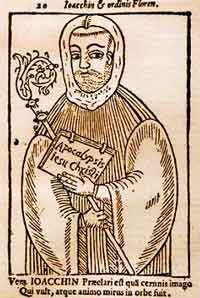 Joachim de Flore développe une sorte de “mythe trinitaire”, où le “Règne du Père” constitue la “vieille alliance”, le “Règne du Fils”, la “nouvelle alliance” et le “Règne” à venir, celui de l’esprit saint. La “vieille alliance”, procédant de la transmission de la “Loi” à Moïse, débouche involontairement, par “hétérotélie”, sur un esclavage des hommes sous la férule d’une Loi, devenue trop rigide au fil du temps; le “Règne du Fils” vient délivrer les hommes de cet esclavage. Mais entre les divers “Règnes”, il y a des périodes de transition, d’incubation. Chaque “Règne” a deux commencements: celui, initial, où ses principes se mettent progressivement en place, tandis que le “Règne” précédent atteint sa maturité et amorce son déclin, et celui où il commence vraiment, par la “fructification”, dit Joachim de Flore, le précédent ayant alors terminé son cycle. Il existe donc des périodes de transition, où les “Règnes” se chevauchent. Celui du Fils commence avec l’arrivée du Christ et se terminera par le retour d’Elie, qui amorcera le “Règne de l’Esprit Saint”, celui-ci hissera alors, après la défaite des Mahométans, l’humanité au niveau supérieur, celui de l’amour pur de l’esprit saint, message de l’Evangile éternel, bref, le “Troisième Règne” ou le “Troisième Reich”, les termes français “Règne” et “Empire” se traduisant tous deux par “Reich” en allemand. De Joachim de Flore à Merejkovski, le filon prophétique et johannite est évident: Moeller van den Bruck le laïcise, le camoufle derrière un langage “moderne” et a-religieux, avec un certain succès dû au fait que le terme était prisé par une littérature subalterne, ou une para-littérature, qui, entre 1885 et 1914, présente des utopies ou des Etats idéaux de science-fiction qui évoquent souvent un “Troisième Reich”, société parfaite, débarrassée de toutes les tares du présent (wilhelminien); parmi ces ouvrages, le plus pertinent étant sans doute celui de Gerhard von Mutius, “Die drei Reiche” (1916).
Joachim de Flore développe une sorte de “mythe trinitaire”, où le “Règne du Père” constitue la “vieille alliance”, le “Règne du Fils”, la “nouvelle alliance” et le “Règne” à venir, celui de l’esprit saint. La “vieille alliance”, procédant de la transmission de la “Loi” à Moïse, débouche involontairement, par “hétérotélie”, sur un esclavage des hommes sous la férule d’une Loi, devenue trop rigide au fil du temps; le “Règne du Fils” vient délivrer les hommes de cet esclavage. Mais entre les divers “Règnes”, il y a des périodes de transition, d’incubation. Chaque “Règne” a deux commencements: celui, initial, où ses principes se mettent progressivement en place, tandis que le “Règne” précédent atteint sa maturité et amorce son déclin, et celui où il commence vraiment, par la “fructification”, dit Joachim de Flore, le précédent ayant alors terminé son cycle. Il existe donc des périodes de transition, où les “Règnes” se chevauchent. Celui du Fils commence avec l’arrivée du Christ et se terminera par le retour d’Elie, qui amorcera le “Règne de l’Esprit Saint”, celui-ci hissera alors, après la défaite des Mahométans, l’humanité au niveau supérieur, celui de l’amour pur de l’esprit saint, message de l’Evangile éternel, bref, le “Troisième Règne” ou le “Troisième Reich”, les termes français “Règne” et “Empire” se traduisant tous deux par “Reich” en allemand. De Joachim de Flore à Merejkovski, le filon prophétique et johannite est évident: Moeller van den Bruck le laïcise, le camoufle derrière un langage “moderne” et a-religieux, avec un certain succès dû au fait que le terme était prisé par une littérature subalterne, ou une para-littérature, qui, entre 1885 et 1914, présente des utopies ou des Etats idéaux de science-fiction qui évoquent souvent un “Troisième Reich”, société parfaite, débarrassée de toutes les tares du présent (wilhelminien); parmi ces ouvrages, le plus pertinent étant sans doute celui de Gerhard von Mutius, “Die drei Reiche” (1916).
Quand paraît “Das Dritte Reich”...
En 1923, quand son manuscrit est prêt à l’impression, Moeller ne choisit pas pour titre “Das Dritte Reich” mais “Die dritte Partei” (= “Le tiers-parti”), formation politique appelée à se débarrasser des insuffisances révolutionnaires, libérales et vieilles-conservatrices. On suggère à Moeller de changer de titre, d’opter par exemple pour “Der dritte Standpunkt” (= “La troisième position”). Finalement, pour des raisons publicitaires, on opte pour “Das Dritte Reich”, car cela a des connotations émotives et eschatologiques. Cela rappelle quantité d’oeuvres utopiques appréciées des contemporains. Du vivant de Moeller, le livre est un vrai “flop” éditorial. Ce n’est qu’après sa mort que ce petit volume programmatique connaîtra le succès, par ouï-dire et par le lancement d’une édition bon marché auprès de la “Hanseatische Verlagsanstalt”. L’idée de “Reich” n’apparaît d’ailleurs que dans le dernier chapitre, ajouté ultérieurement! Les cercles et salons fréquentés et animés par Moeller ne doivent donc pas être considérés comme les anti-chambres du national-socialisme, même si des personnalités importantes comme Stadtler ont fini par y adhérer, après le suicide du traducteur de Baudelaire et de Dostoïevski. Grâce à un travail minutieux et exhaustif du Prof. Wolfgang Martynkiewicz (“Salon Deutschland – Geist und Macht 1900-1945”, Aufbau Verlag, 2011), on sait désormais que c’est plutôt le salon des époux Hugo et Elsa Bruckmann, éditeurs à Munich et animateurs d’un espace de débats très fréquenté, qui donnera une caution pleine et entière au national-socialisme en marche dès la fin des années 20, alors que ce salon avait attiré les plus brillants esprits allemands (dont Thomas Mann et Ludwig Klages), conservateurs, certes, mais aussi avant-gardistes, libéraux, socialistes et autres, inclassables selon l’étiquettage usuel des politistes “normalisés” d’aujourd’hui, notamment les “anti-fascistes” auto-proclamés.
Un état de tension militante permanente
Pour Moeller van den Bruck, préfacé en France par Thierry Maulnier, post-maurrassien et non-conformiste des années 30 (cf. Etienne de Montety, “Thierry Maulnier”, Perrin-Tempus, 2013), l’idée de “Reich”, c’est-à-dire, selon son mentor Merejkovski, l’idée d’un “Règne de l’Esprit Saint”, est aussi et surtout —avant d’être un état stable idéal, empreint de quiétude— un état de tension militante permanente. Ce “Troisième Empire”, qui n’est évoqué que dans le dernier chapitre du livre du même nom, et constitue d’ailleurs un addendum absent de la première édition, n’adviendra pas nécessairement dans le réel puisqu’il est essentiellement une tension permanente qu’il s’agit de ne jamais relâcher: les élites, ou les “élus”, ceux qui ont compris l’essence de la bonne politique, qui n’est ni le fixisme déduit de l’idée d’un ordre naturel immuable ni le chaos du révolutionnarisme constant, doivent sans cesse infléchir les institutions politiques dans le sens de ce “Troisième Règne” de l’Esprit, même s’ils savent que ces institutions s’usent, s’enlisent dans l’immobilité; il y a donc quelque chose du travail de Sisyphe dans l’oeuvre des élites politiques constantes.
Dans les écrits antérieurs de Moeller van den Bruck, on peut repérer des phrases ou des paragraphes qui abondent déjà dans ce sens; ainsi en 1906, il avait écrit: “L’Empire de la troisième réconciliation va combler le fossé qu’il y a entre la civilisation moderne et l’art moderne”. Dans les années 1906-1907, Moeller évoque la “Sendungsgedanke”, l’idée de mission, religieuse et forcément a-rationnelle, dont les racines sont évidemment chrétiennes mais aussi révolutionnaires: le christianisme a apporté l’idée d’une mission “perfectibilisante” (mais c’est aussi un héritage du mithraïsme et de ses traductions christianisées, archangéliques et michaëliennes); quant aux révolutionnaires français, par exemple, ils font, eux aussi, montre d’une tension militante dans leur volonté de promouvoir partout l’idéal des droits de l’homme. Pour parvenir à réaliser cette “Sendungsgedanke”, il faut créer des communautés pour les porteurs de l’idée, afin que la dynamique puisse partir d’en haut et non de la base, laquelle est plongée dans la confusion; ces communautés doivent se développer au-delà des Etats existants, que ceux-ci soient les Etats allemands (Prusse, Bavière, Baden-Würtemberg) ou soient les pays autrichiens ou les nouveaux Etats construits sur les débris de l’Empire austro-hongrois, où vivent des minorités allemandes, ou soient des Etats quelconques dans le reste de l’Europe où vivent désormais des populations allemandes résiduaires ou très minoritaires. Les porteurs de l’idée peuvent aussi appartenir à des peuples proches de la culture germanique (Baltes, Flamands, Hollandais, Scandinaves, etc.). Ces communautés de personnalités chosies, conscientes des enjeux, formeront le “parti de la continuité” (Kontinuität), celui qui poursuivra donc dans la continuité l’itinéraire, la trajectoire, de l’histoire allemande ou germanique. Ce parti rassemblera des Allemands mais aussi tous ceux qui, indépendamment de leur ethnicité non germanique, partageront les mêmes valeurs (ce qui permet de laver Moeller de tout soupçon d’antisémitisme et, forcément, d’antislavisme).
De Moeller à la postmodernité
Nous constatons donc que, dans le sillage de Dostoïevski et Merejkovski, Moeller van den Bruck parie résolument sur le primat de l’esprit, des valeurs. Ces communautés et ce futur parti constituent dès lors, à eux tous, une “Wertungsgemeinschaft” (une communauté de valeurs), Moeller étant le seul à avoir utilisé cette expression dans ses écrits à l’époque. Autre aspect qui mérite d’être souligné: Moeller anticipe en quelque sorte les bons filons aujourd’hui galvaudés de la postmodernité; c’est en ce sens qu’Armin Mohler —qui avait la volonté de perpétuer la “révolution conservatrice”— avait voulu embrayer sur le discours postmoderne à la fin des années 80 du 20ème siècle; en effet, Moeller avait écrit: “Wir müssen die Kraft haben, in Gegensätzen zu leben”, “Nous devons avoir la force de vivre au beau milieu des contradictions (du monde)”. Moeller avait vécu très intensément l’effervescence culturelle de la Belle Epoque, avant l’emprise sur les âmes des totalitarismes d’après 1917, magnifiquement mise en scène dans les romans noirs de Zamiatine et Mikhaïl Boulgakov. L’oeuvre de Moeller van den Bruck est le résultat de cette immersion. La Belle Epoque acceptait ses contradictions, les confrontait dans la convivialité et la courtoisie. Les totalitarismes ne les accepteront plus. Après l’effondrement du “grand récit” communiste (hégélo-marxiste), suite à la perestroïka et la glasnost de Gorbatchev, le monde semble à nouveau prêt à accepter de vivre avec ses contradictions, d’où la pensée “polythéiste” d’un Jean-François Lyotard ou d’un Richard Rorty. Mais l’espoir d’un renouveau tout à la fois postmoderne et révolutionnaire-conservateur, que nous avions cultivé avec Mohler, s’effondrera dès le moment où le néo-libéralisme niveleur et le bellicisme néo-conservateur américain, flanqués des “idiots utiles” de la “nouvelle philosophie parisienne” (avec Bernard-Henri Lévy), auront imposé une “political correctness”, bien plus homogénéisante, bien plus arasante que ne l’avait été le communisme car elle a laissé la bride sur le cou, non seulement à l’engeance des spéculateurs, mais aussi à tout un fatras médiatique festiviste et à un “junk thought” ubiquitaire, qui empêche les masses d’avoir un minimum de sens critique et qui noie les rationalités du “zoon politikon” dans un néant de variétés sans fondements et de distractions frivoles.
Le peuple portera l’idée de “Reich”
En termes politiques, l’acceptation moellerienne des contradictions du monde le conduit à esquisser la nature du “Reich” à venir: celui-ci ne pourra pas être centralisé car toute centralisation excessive et inutile conduit à un égalitarisme araseur, qui brise les continuités positives. Le “Troisième Reich” de Moeller entend conserver les diverses dynamiques, convergentes ou contradictoires, qui ont été à l’oeuvre dans l’histoire allemande (et européenne) et la nouvelle élite “jungkonservativ” doit veiller à maintenir une “coïncidentia oppositorum”, capable de rassembler dans l’harmonie des forces au départ hétérogènes, à l’oeuvre depuis toujours dans la “continuité” allemande. C’est le peuple, le Volk, qui doit porter cette idée de “Reich”, dans le même esprit, finalement, que le “populus romanus” portait les “res publicae” romaines puis, en théorie, l’Empire à partir d’Auguste. Ou du moins l’élite consciente de la continuité qui représente le peuple, une continuité qui ne peut se perpétuer que si ce peuple demeure, en évitant, si possible, toute “translatio imperii” au bénéfice d’une tierce communauté populaire, dont le moment historique viendra ultérieurement. Le Sénat romain —l’assemblée des “senes”, homme plus âgés et dotés, par la force de l’âge, d’une mémoire plus profonde que les “adulescentes” (hommes de 15 à 35 ans) ou même que les “viri” (de 35 à 50 ans)— était le gardien de cet esprit de continuité, qu’il ne fallait pas rompre —en oubliant les rituels— afin de préserver pour l’éternité le “mos majorum”, d’où l’expression “Senatus PopulusQue Romanus” (SPQR), la longue mémoire étant ainsi accolée à la source vive, vitale, de la populité romaine. La Belle Epoque subit, elle, de plein fouet une remise en question générale de l’ordre, qui ne peut plus être perçu comme figé: avec des personnalités comme Moeller, elle parie pour les “adulescentes” et les “viri”, à condition qu’ils fassent éclore des formes nouvelles, pour remplacer les formes figées, qui exprimeront mieux le “mos majorum”, germanique cette fois, car le germanisme d’avant 1914 était, selon l’étude magistrale et copieuse de Peter Watson (cf. supra), une “troisième renaissance” dans l’histoire culturelle européenne, après la renaissance carolingienne et la renaissance italienne. Toute renaissance étant expression de jouvence, d’où l’usage licite des termes “jung” et “Jungkonservativismus”, si l’on veut agir et oeuvrer dans le sens de cette “troisième renaissance” qui n’a pas encore déployé toutes ses potentialités.
Moeller parle donc d’un Empire porté par le peuple et par la jeunesse du peuple, instances vitales, et non par l’Etat puisque la machine étatique wilhelminienne a figé, donc tué, l’énergie vitale que nécessité la mission impériale de la jeunesse, en multipliant les formes abstraites, en oblitérant le vivant populaire par toute sorte d’instances figeantes, appelées à devenir tentaculaires: dénoncer cette emprise croissante des rationalités figées sera la leçon du sociologue Georg Simmel et de sa longue postérité (jusqu’à nos jours), ce sera aussi le message angoissé et pessimiste du “Château” de Franz Kafka. Parmi les instances figeantes, il faut compter les partis qui, comme le soulignait un socialiste engagé puis déçu tel Roberto Michels, finissaient par ne plus représenter le peuple des électeurs mais seulement des oligarchies détachées de celui-ci. La démocratie nécessaire au bon fonctionnement du nouveau “Reich” ne doit pas représenter la base par des partis mais, explique Moeller van den Bruck, par des corporations (expressions de métiers réels), des ordres professionnels, des conseils ou des soviets ouvriers, des syndicats. Indirectement, peut-être via Thierry Maulnier, préfacier du “Troisième Reich” de Moeller et chroniqueur du “Figaro” après 1945, ces idées de Moeller (mais aussi de Heinz Brauweiler) auront un impact sur les idées gaulliennes des années 60, celles de la participation et de l’intéressement, celle aussi du Sénat des Régions et des Professions. Le rôle des “non-conformistes” français des années 30 et des néo-socialistes autour de Marcel Déat, lui-même inspiré par Henri De Man, a sans nul doute été primordial dans cette transmission, malgré tout incomplète. Le Sénat, envisagé par les gaullistes après la rupture avec l’OTAN, était appelé, s’il avait été instituté, à représenter un tissu social réel et performant au détriment de politiciens professionnels qui ne produisent que de la mauvaise jactance et finissent par se détacher de toute concrétude.
“Ostideologie”
Ces spéculations sur le “Troisième Règne” à venir, sur le “Règne de l’Esprit” débarrassé des pesanteurs anciennes, s’accompagnaient, dans l’Allemagne des premières années de la République de Weimar, par une volonté de lier le destin du pays à la Russie, fût-elle devenue soviétique. Lénine était d’ailleurs revenu de Suisse dans un wagon plombé avec la bénédiction du Kaiser et de l’état-major général des armées allemandes. Sans cette bénédiction, on n’aurait sans doute jamais entendu parler d’une Russie bolchevisée, tout au plus d’une pauvre Russie qui aurait sombré dans le chaos de la pusillanimité menchevik (cf. Soljénitsyne) ou serait revenue à un tsarisme affaibli, après la victoire des armées blanches, soutenues par l’Occident. Cette volonté de lier l’Allemagne vaincue à la nouvelle puissance de l’Est s’appelle, dans le langage des historiens et des politologues, l’“Ostideologie” ou le national-bolchevisme. L’Ostideologie n’est ni une idée neuve en Allemagne, et en particulier en Prusse, ni une idée dépassée aujourd’hui, les liens économiques de l’Allemagne de Schröder et de Merkel avec la Russie de Poutine attestant la pérennité de cette option, apparemment indéracinable. La permanence de cette volonté d’alliance prusso-russe depuis Frédéric II et depuis les accords de Tauroggen contre Napoléon I explique le succès que le “national-bolchevisme” a connu au début des années 20, y compris dans des cercles peu propices à applaudir à l’idéologie communiste. Depuis la Guerre de Sept Ans au 18ème siècle, depuis le retournement de la Prusse après le désastre napoléonien de la Bérézina, nous avons eu plus de 150 ans d’Ostpolitik: Willy Brandt, ancien des Brigades Internationales lors de la Guerre d’Espagne, la relance sur l’échiquier politique européen dès la fin des années 60, dès la fin de l’ère Adenauer et de la Doctrine Hallstein. Elle se poursuivra par les tandems Kohl/Gorbatchev et Schröder/Poutine, visant surtout des accords énergétiques, gaziers. La chute de Bismarck a mis un terme provisoire à l’alliance implicite entre l’Allemagne et la Russie tsariste, colonisée par les capitaux français. En 1917, la révolution russe reçoit le soutien de l’état-major allemand, puisqu’elle épargne à l’Allemagne une guerre sur deux fronts, tout en lui procurant un apport de matières premières russes. Seule l’intervention américaine a sauvé les Français et les Britanniques d’une défaite calamiteuse.
L’option pro-soviétique
En novembre 1918, les Soviets proposent d’envoyer deux trains de céréales pour rompre le blocus anglais qui affame les grandes villes allemandes. Les sociaux-démocrates, vieux ennemis de la Russie tsariste d’avant 1914, contre laquelle ils avaient voté les crédits de guerre, refusent cette proposition car, même après novembre 1918, ils demeurent toujours, envers et contre tout, des ennemis de la Russie, malgré qu’elle soit devenue bolchevique . Ils avancent pour argument que les Etats-Unis ont promis du blé pour tenir une année entière. Ce refus est un des faits les plus marquants qui ont suscité les clivages des premières années de Weimar: la gauche sociale-démocrate au pouvoir reste anti-russe et devient donc, dans un esprit de continuité et par le poids des habitudes, anti-bolchevique, tandis que la droite, divisée en plusieurs formations partisanes, adopte des positions favorables à la nouvelle Russie soviétique, sans pour autant soutenir les communistes allemands sur le plan intérieur. Lloyd George perçoit immédiatement le danger: la sociale-démocratie risque de perdre sa base électorale et la droite musclée risque bel et bien de concrétiser ses projets d’alliance avec les Soviets. Il demande à Clémenceau de modérer ses exigences et écrit: “The greatest danger that I see in the present situation, is that Germany may throw her lot with Bolshevism and place her resources, her brains, her vast organizing power at the disposal of the revolutionary fanatics whose dreams it is to conquer the world for Bolshevism by force of arms”. En dépit de cet appel britannique à la modération, Versailles, en juin 1919, consacre le triomphe de Clémenceau. D’où l’option pro-soviétique demeure le seul moyen de s’en sortir pour l’Allemagne vaincue.
Hugo Stinnes, pour le cartel industriel, les généraux von Seeckt et von Schleicher pour l’état-major, joueront cette carte. D’une part, les Britanniques avaient imposé un blocus de longue durée à l’Allemagne, provoquant une famine désastreuse et des centaines de milliers de morts. Après avoir infligé ce sort à l’Allemagne, les deux puissances occidentales de l’Entente l’appliquent ensuite à la Russie soviétique. Sous l’impulsion des élites industrielles et militaires, désormais russophiles, l’Allemage refuse de participer au blocus anti-soviétique. En juillet 1920, l’armée rouge entre en Pologne: les Allemands restent neutres et refusent qu’armes et appuis logistiques transitent par leur territoire. Les ouvriers du port de Dantzig se mettent en grève, privant la Pologne de tous approvisionnements. C’est à ce moment-là que l’on commence aussi à parler de “Dritte Kraft”, de “Troisième Force”: il ne s’agit alors nullement du KPD communiste ou d’éléments précurseurs de la NSDAP mais de la KAPD, une dissidence communiste et nationale, née à Hambourg en avril 1920 et dirigée par Lauffenberg et Wolfheim. Ce parti, somme toute groupusculaire, fera long feu mais sa courte existence donne naissance au vocable “national-bolchevisme”, vu qu’il avait essayé d’harmoniser en son sein éléments nationalistes et éléments communistes radicaux. Le “Solidarier” et membre du “Ring” Ernst Troeltsch, dans un article du 12 novembre 1920, résume la situation: “La pression de l’Entente détruit toutes les conditions de vie et radicalise les masses affamées; le succès du bolchevisme en Allemagne encourage l’Entente à cultiver d’autres projets de destruction, tant et si bien que les croisements idéologiques les plus étonnants verront le jour: une partie du monde ouvrier va devenir radicalement nationaliste et une partie de la bourgeoisie se fera bolchevique; quant aux adversaires les plus rabiques de l’Entente, ils se placeront aux côtés du capitalisme de l’Entente pour se sauver du bolchevisme et les adversaires les plus radicaux de la classe ouvrière se convertiront à une sorte de bolchevisme du désarroi”. Les repères habituels sont dès lors brouillés et les extrêmes se rejoignent, en dépit de ce qui les a différenciées (cf. Jean-Pierre Faye, qui a démontré qu’en de tels moments, “les extrémités du fer à cheval idéologico-politique se touchent”).
Rapallo
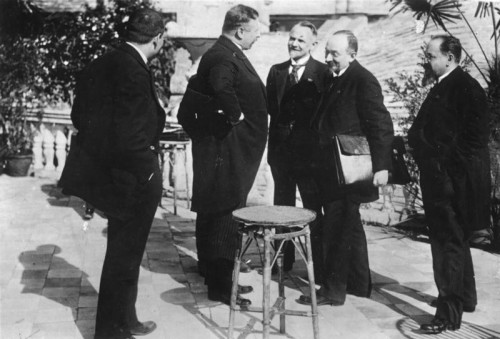
Le résultat le plus tangible de ce national-bolchevisme diffus, partagé par les ouvriers de Hambourg comme par les généraux de l’état-major ou les dirigeants des gros cartels industriels de l’Allemagne, est le Traité de Rapallo (1922) signé entre Rathenau et Tchitchérine, inaugurant ainsi la phase évolutionnaire et non plus révolutionnaire du national-bolchevisme.
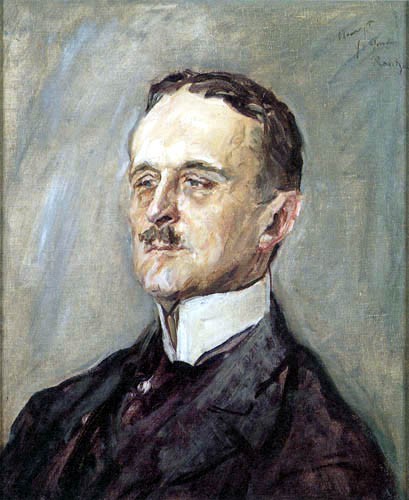 Les milieux déplomatiques le reprennent à leur compte sous la houlette du Comte Ulrich von Brockdorff-Rantzau, ancien ministre des affaires étrangères de la République de Weimar (cabinet Scheidemann), démissionnaire pour ne pas avoir à signer le Traité de Versailles, puis ambassadeur allemand à Moscou (en 1922). Avec deux autres diplomates, Rudolf Nadolny et Richard von Kühlmann, il avait mis au point la stratégie de “révolutionner” la Russie en 1917, pour que le Reich n’ait plus à lutter sur deux fronts. Les trois diplomates s’étaient assuré le concours du banquier Alexander Parvus, artisan financier de la révolution bolchevique (cf. Gerd Koenen, v. bibliographie). Malgré son passé d’artisan majeur de la prise du pouvoir par Lénine en Russie, von Brockdorff-Rantzau, aristocrate favorable à un régime populaire et démocratique, favorable aussi à des liens limités avec l’URSS, n’acceptera pas les clauses du Traité de Rapallo, jugé trop bénéfique aux Soviétiques. Il sera en revanche l’artisan du Traité de Berlin (cf. infra). De même, le principal soutien de Stadtler et de sa “Ligue anti-bolchevique”, Karl Helfferich, intriguera contre le Traité de Rapallo et contre Walther Rathenau, qui finira assassiné par des éléments issus des Corps Francs, dont l’écrivain Ernst von Salomon.
Les milieux déplomatiques le reprennent à leur compte sous la houlette du Comte Ulrich von Brockdorff-Rantzau, ancien ministre des affaires étrangères de la République de Weimar (cabinet Scheidemann), démissionnaire pour ne pas avoir à signer le Traité de Versailles, puis ambassadeur allemand à Moscou (en 1922). Avec deux autres diplomates, Rudolf Nadolny et Richard von Kühlmann, il avait mis au point la stratégie de “révolutionner” la Russie en 1917, pour que le Reich n’ait plus à lutter sur deux fronts. Les trois diplomates s’étaient assuré le concours du banquier Alexander Parvus, artisan financier de la révolution bolchevique (cf. Gerd Koenen, v. bibliographie). Malgré son passé d’artisan majeur de la prise du pouvoir par Lénine en Russie, von Brockdorff-Rantzau, aristocrate favorable à un régime populaire et démocratique, favorable aussi à des liens limités avec l’URSS, n’acceptera pas les clauses du Traité de Rapallo, jugé trop bénéfique aux Soviétiques. Il sera en revanche l’artisan du Traité de Berlin (cf. infra). De même, le principal soutien de Stadtler et de sa “Ligue anti-bolchevique”, Karl Helfferich, intriguera contre le Traité de Rapallo et contre Walther Rathenau, qui finira assassiné par des éléments issus des Corps Francs, dont l’écrivain Ernst von Salomon.
Débat: Radek, Moeller, Reventlow
En cessation de paiement, la République de Weimar doit accepter en 1923 l’occupation de la Ruhr par les troupes françaises et belges qui se paieront en nature pour honorer les réparations imposées à l’Allemagne par le Traité de Versailles. Les communistes s’insurgent contre cette occupation. Karl Radek prononce un discours contre les occupants, suite à l’exécution, par les Français, de l’officier nationaliste Albrecht Leo Schlageter, qui avait organisé des opérations de sabotage pour entraver la logistique des troupes d’occupation ou pour éliminer les séparatistes rhénans, stipendiés par Paris. Radek pose Schlageter comme une “victime des capitalistes de l’Entente”. Le Comte Ernst zu Reventlow, nationaliste, rédige même un article en faveur de Schlageter dans le journal communiste “Die Rote Fahne”. Pour répondre directement aux questions que lui avait posées Radek dans les colonnes de “Die Rote Fahne”, Moeller entre, à son tour, dans le débat, où nationalistes et communistes conjugueront leurs efforts pour mettre fin à l’occupation de la Ruhr. Il rédige trois articles dans “Gewissen”, en réponse à Radek. Il précise que sur le plan de la “politique spatiale”, de la “Raumpolitik”, les destins de l’Allemagne et de la Russie sont unis, inexorablement unis, mais il réfute le centralisme bolchevique et s’oppose à toute politique communiste visant à tout centraliser autour du PCUS.
Pour Arthur Moeller van den Bruck, l’URSS doit renoncer à son agitation en Allemagne, ne plus faire du communisme un instrument de subversion et laisser éclore et se développer un “socialisme allemand”, qui serait son allié et non son “clone”, se défaire d’un radicalisme inopérant sur le long terme (Gorbatchev!) et développer un socialisme véritablement démocratique. Moeller précise aussi que le prolétariat allemand peut certes être l’instrument d’une révolution aussi bien communiste que nationaliste, d’une révolution libératrice; toutefois, ce prolétariat, rappelle le Prof. Louis Dupeux en citant Moeller, forme bien sûr la “majorité arithmétique” de la nation mais il “n’est pas capable d’administrer la très complexe économie allemande”, bien différente et bien plus ancienne et diversifiée que l’économie russe. Pour Moeller, uniquement les “travailleurs intellectuels” peuvent remédier aux lacunes et aux insuffisances politiques du prolétariat parce qu’ils sont conscients des enjeux: les entrepreneurs allemands ne sont pas des capitalistes mais d’autres “travailleurs intellectuels” —différents des littérateurs et des philosophes aux regards plus perçants et dépositaires de la “longue mémoire”— car, contrairement à leurs homologues occidentaux, ils créent des valeurs (matérielles et exportables), ne sont pas des spéculateurs mais les administrateurs du génie productif des ingénieurs innovateurs, eux aussi expression du génie populaire. Géopolitiquement, l’Allemagne et la Russie, devenue bolchévique, sont liées par un “destin tellurique” —elles se procurent mutuellement une liberté de mouvement en politique étrangère— mais l’alliance potentielle et indéfectible entre les deux puissances ne peut se faire sous le signe du seul bolchevisme léniniste car celui-ci conduira au blocage de l’économie russe. Seulement aux conditions énoncées par Moeller dans “Gewissen” en réponse à Radek, une coopération entière et permanente est possible. Moeller garde donc une vision particulière, non bolchévique et véritablement “jungkonservativ” de la Russie, héritage direct de son mariage avec Lucie Kaerrick, de son travail de traducteur avec Less Kaerrick et de son amitié pour Merejkovski. Reste à constater que Moeller est prophète: la perestroïka de Gorbatchev et les accords Poutine/Schröder et Poutine/Merkel, bien analysés par le diplomate contemporain Alexander Rahr, sont autant de faits politiques et géopolitiques contemporains qui démontrent que le dialogue germano-russe est possible et fécond mais sans bolchevisme pétrifiant, avec toutefois un système russe plus dirigiste, non occidental, non influencé par le manchestérisme et la spéculation financière, et un système allemand, fidèle à ce que l’économiste français Michel Albert appelait le “capitalisme patrimonial rhénan”.
Jouvence russe et allemande
L’immersion profonde de Moeller dans l’univers romanesque de Dostoïevski le conduit à croire que la spiritualité russe est un ingrédient nécessaire à la renaissance allemande, idée partagée aussi par Eugen Diederichs qui avait fait traduire de nombreux auteurs russes et slaves. Cette spiritualité russe et dostoïevskienne, ainsi que l’apport de Merejkovski, est appelée à faire contre-poids à l’influence occidentale, qui distille dans l’Allemagne les idées délétères de la révolution française et du manchestérisme anglais. Cette spiritualité est aussi perçue comme un élément d’éternelle jouvence, comme un barrage sûr contre la sénescence à laquelle l’occidentalisme conduit les peuples (idée réactualisée par Edouard Limonov qui décrit l’Occident contemporain comme un “Grand Hospice”). Les Slaves —avec les idéologues panslavistes, qui se font les véhicules des idées lancées par Nikolaï Danilevski au 19ème siècle— se considèrent comme des peuples jeunes, parce qu’ils sont plus spiritualisés que les Occidentaux laïcisés et trop rationalisés, parce qu’ils ont une démographie plus prolifique. Immédiatement après la première guerre mondiale, Moeller van den Bruck mobilise l’idée de “peuple jeune” dans une polémique anti-française: la France est alors campée comme une “vieille nation”, à la démographie défaillante depuis plusieurs décennies, qui n’a pu vaincre l’Allemagne que parce qu’elle s’était alliée à deux peuples jeunes, les Américains et les Russes. Si l’Allemagne avait été alliée à la Russie, elle aurait incarné un principe de “plus grande jouvence” et les soldats allemands et russes, portés par l’élan putatif de leur jeunesse intrinsèque, se seraient promenés sur les Champs Elysées et sur la Canebière; un facteur de sénescence particulièrement dangereux pour l’Europe aurait été éliminé, pensaient Moeller van den Bruck et son entourage. Pour faire charnière entre l’idée russe d’une jouvence slave et l’injection (ou la ré-injection) d’idéologèmes de jouvence dans l’espace politique allemand, il faut raviver le “mythe prussien”, pense Moeller. La Prusse est effectivement un mélange d’ingrédients germaniques, vénètes (“wendisch”), slaves et baltes. Ce cocktail interethnique, réussi selon Moeller van den Bruck, doit devenir l’élément de base, l’élément essentiel, du futur Reich, et le territoire sur lequel il s’est constitué devenir son centre de gravitation historique, situé plus à l’Est, dans une région non soumise aux influences françaises et anglaises. L’esthétique visibilisée, l’urbanisme nouveau et l’architecture de prestige de l’Etat seront alors les signes de cette prussianisation de l’Allemagne: ils seront autant de réactualisations de l’esprit de l’architecture du classicisme prussien, des réactualisations à peine modifiées des oeuvres de Gilly, Schinckel,etc.
Dans le “Dictionnaire politique”, édité par le “Juni-Klub”, Max Hildebert Boehm écrivait: “La jeunesse de gauche et de droite trouve un terrain d’entente quand il s’agit de rejeter l’occidentalisme bourgeois et perçoit dans la contamination morale qu’irradie l’Occident vieillissant, surtout par le biais de l’américanisation, le pire des dangers pour la germanité. Contre les miasmes empoisonnés qui nous viennent de l’Occident, il nous faut constituer un front intellectuel contre l’Ouest...”. On notera ici que Boehm considère l’Amérique comme facteur de sénescence ou de contamination morale, alors que Moeller la considérait comme un élément de jouvence.
Nous avons surtout insisté, dans ce bref essai, sur trois aspects du livre le plus célèbre de Moeller van den Bruck, à défaut d’être le plus original et le plus profond: la définition du “Jungkonservativismus” (incompréhensible sans dresser le bilan des années littéraires de Moeller), le mythe du “Reich” (avec ses racines religieuses prophétiques) et l’“Ostideologie” (tributaire de Merejkovski et Dostoïevski).
En 1925, le Traité de Locarno instaure un modus vivendi avec l’Ouest: un certain rapprochement franco-allemand devient possible, sous la double impulsion de Briand et Stresemann. En 1926, le Traité de Berlin, signé entre la République de Weimar et l’URSS, reconduit bon nombre de clauses du Traité de Rapallo, cette fois flanqué d’un apaisement à l’Ouest par le truchement du Traité de Locarno. Le Traité de Berlin signale au monde que l’Allemagne entend encore et toujours coopérer avec l’Union Soviétique, sur les plans économique et militaire, en dépit d’un rapprochement avec l’Ouest et la SdN, que l’URSS avait voulu éviter à tout prix au début des années 20. Les Allemands, dans les clauses de ce Traité de Berlin, déclarent qu’ils resteront neutres —et non belligérants actifs aux côtés des Soviétiques— en cas de conflit entre l’URSS et une tierce puissance, en l’occurrence la Pologne, rendant de la sorte impossible toute intervention française dans le conflit en faveur de Varsovie. Simultanément, l’Allemagne des nationalistes espérait affaiblir la Pologne, allié de revers de la France. Quant à Stresemann, l’homme de Locarno avec Briand, il entendait plutôt “modérer” l’URSS, l’Allemagne, aux yeux de ce social-démocrate, devant servir d’interface entre l’Ouest et l’URSS, dans le but d’assurer paix et stabilité sur le continent européen. Le Traité de Berlin devait rester en vigueur pendant cinq ans: le gouvernement Brüning le prolongera pour cinq nouvelles années en 1931 mais l’URSS ne le ratifiera qu’en mai 1933, cinq mois après la prise de pouvoir par la NSDAP d’Hitler!
Modus vivendi en Europe
Les traités de Locarno et de Berlin instaurent de ce fait un modus vivendi en Europe, où plus aucune révolution régénérante —poussant les peuples, et le peuple allemand en particulier, vers un “Règne de l’Esprit”— n’est envisageable: le vieux monde est sauvé. Pour les activistes les plus audacieux, c’est la déception. Pour Moeller, en effet, la défaite de novembre 1918 avait été une aubaine: une victoire de l’Allemagne wilhelminienne ou une paix de compromis, comme le projet de “partie nulle” soutenu par le Pape Benoit XV, aurait maintenu le Reich dans une misère intellectuelle similaire à celle du wilhelminisme que brocardaient les “cabaretistes” autour de Wedekind et Wolzogen. La révolution esthétique et politique, rêvée par Moeller, n’était plus possible. La défaite et le marasme, dans lequel l’Allemagne avait été plongée depuis la défaite et Versailles, rendaient plausible la perspective d’un grand bouleversement salutaire, capable de faire advenir le “Troisième Règne de l’Esprit”. Rien d’aussi glorieux n’était plus envisageable sous les clauses des nouveaux traités et, pire, sous les conditions du Plan Dawes de refinancer l’Allemagne par des capitaux américains. L’ère des masses sans conscience s’annonçait, obligeant les “nationaux-révolutionnaires”, qui avaient tous espéré le déchaînement proche d’une révolution purificatrice, à quitter la scène politique, à abandonner tout espoir en l’utilité révolutionnaire des petites phalanges ultra-politisées de “cerveaux hardis”: le retrait d’Ernst Jünger étant, après la mort de Moeller, le plus emblématique; surtout, Ernst Jünger et son frère Friedrich-Georg Jünger sont ceux qui nous laissent les témoignagnes littéraires les plus complets de cette époque où l’on attendait une révolution régénérante. Pour Jünger, dorénavant, l’écriture est la seule forme possible de résistance contre l’avancée arasante de la modernité. Le Règne de Cham pouvait alors commencer, sous des formes multiples, utilisant les élans de l’âme à mauvais escient, étouffant cette “Glut”, signe de jouvence évoqué maintes fois par Moeller, soit cette incandescence des âmes fortes, des âmes qui brûlent. Cham nous a menés tout droit à l’étouffoir dans lequel nous survivons péniblement aujourd’hui. Voilà pourquoi, pour vivre au milieu des ruines, il faut se rappeler l’itinéraire si riche d’Arthur Moeller van den Bruck et raviver sans cesse les flammèches allumées jadis par les auteurs et les activistes qu’il a côtoyés, afin de ne pas se laisser submerger par les fadaises de notre époque, la plus triviale que l’histoire européenne ait jamais connue, celle d’une “Smuta”, dont on ne perçoit pas encore la fin, afin aussi d’être les premiers lorsque prendra fin cette ère de déclin.
Robert STEUCKERS.
Fait à Forest-Flotzenberg, Fessevillers et Genève, de février à septembre 2013.
Bibliographie:
- Helmut DAHM & Assen IGNATOW (Hrsg.), Geschichte der philosophischen Traditionen Osteuropas, Wissenschaftliche Buchgesellschaft, Darmstadt, 1996.
- Otto DANN, Nation und Nationalismus in Deutschland – 1770-1990, Beck, München, 1994.
- Louis DUPEUX, Stratégie communiste et dynamique conservatrice – Essai sur les différents sens de l’expression ‘National-Bolchevisme’ en Allemagne, sous la République de Weimar (1919-1933), Honoré Champion, Paris, 1976.
- Fjodor M. DOSTOJEWSKI, Tagebuch eines Schriftstellers, Piper, München, 1963-1992.
- Geoff ELEY, Wilhelminismus, Natonalsmus, Faschismus – Zur historischen Kontinuität in Deutschland, Verlag Westfälisches Dampfboot, Münster, 1991.
- Jean-Pierre FAYE, Langages totalitaires, Hermann, 1972.
- Joseph FRANK, Dostoevsky – A Writer in His Time, Princeton University Press, 2010.
- Denis GOELDEL, Moeller van den Bruck (1876-1925), un nationaliste contre la révolution, Peter Lang, Frankfurt a. M., 1984.
- Martin GREIFFENHAGEN, Das Dilemma des Konservatismus in Deutschland, Piper, München, 1977.
- Oswald HEDERER, Klassizismus, Heyne Verlag, München, 1976.
- Franz KOCH, Geschichte deutscher Dichtung, Hanseatische Verlagsanstalt, Hamburg, 1937.
- Gerd KOENEN, Der Russland-Komplex – Die Deutschen und der Osten – 1900-1945, C. H. Beck, München, 2005.
- Panajotis KONDYLIS, Konservativismus – Geschichtlicher Gehalt und Untergang, Klett-Cotta, Stuttgart, 1986.
- Mircea MARGHESCU, Homunculus – Critique dostoïevskienne de l’anthropologie, L’Age d’Homme, Lausanne, 2005.
- Fritz MARTINI, Duitse letterkunde, I & II, Prisma-Compendia, Het Sprectrum, Utrecht/Antwerpen, 1969.
- Wolfgang MARTYNKIEWICZ, Salon Deutschland – Geist und Macht – 1900-1945, Aufbau-Verlag, Berlin, 2011.
- Nicolas MILOCHEVITCH, Dostoïevski penseur, L’Age d’Homme, Lausanne, 1988.
- Georges MINOIS, Die Geschichte der Prophezeiungen, Albatros, 2002.
- Arthur MOELLER van den BRUCK, Das Ewige Reich, Bd. I & II, W. G. Korn Verlag, Breslau, 1933.
- Arthur MOELLER van den BRUCK, Le Troisième Reich, Alexis Redier, Paris, 1933 (préface de Thierry Maulnier).
- Arthur MOELLER van den BRUCK, La révolution des peuples jeunes, Pardès, Puiseaux, 1993.
- Armin MOHLER, Die Konservative Revolution in Deutschland – 1918-1932, Wissenschaftliche Buchgesellschaft, Darmstadt, 1989.
- Georges NIVAT, Vers la fin du mythe russe – Essais sur la culture russe de Gogol à nos jours, L’Age d’Homme, Lausanne, 1988.
- Karl O. PAETEL, Versuchung oder Chance? Zur Geschichte des deutschen Nationalbolschewismus, Musterschmidt, Göttingen, 1965.
- Birgit RÄTSCH-LANGEJÜRGEN, Das Prinzip Widerstand – Leben und Wirken von Ernst Niekisch, Bouvier Verlag, Bonn, 1997.
- Wilhelm SCHERER & Oskar WALZEL, Geschichte der deutschen Literatur, Otto Eichler Verlag, Leipzig/Berlin, s.d. (1928?).
- André SCHLÜTER, Moeller van den Bruck – Leben und Werk, Böhlau, Köln, 2010.
- Otto-Ernst SCHÜDDEKOPF, National-bolschewismus in Deutschland 1918-1933, Ullstein, Berlin, 1972.
- Hans-Joachim SCHWIERSKOTT, Arthur Moeller van den Bruck und der revolutionäre Nationalismus in der Weimarer Republik, Musterschmidt, Göttingen, 1962.
- Kurt SONTHEIMER, Antidemokratisches Denken in der Weimarer Republik, DTV, 1978.
- Fritz STERN, Kulturpessimismus als politische Gefahr – Eine Analyse nationaler Ideologie in Deutschland, DTV, München, 1986.
- Peter WATSON, The german Genius – Europe’s Third Renaissance, The second Scientific Revolution and the Twentieth Century, Simon & Schuster, London, 2010.
- Volker WEISS, Moderne Antimoderne – Arthur Moeller van den Bruck und der Wandel des Konservatismus, F. Schöningh, Paderborn, 2012.



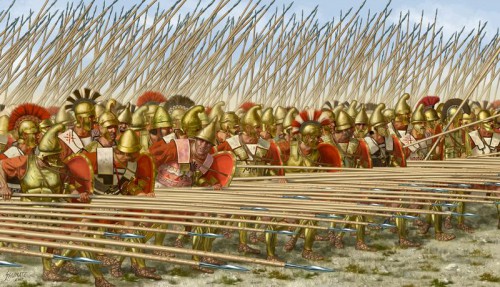

 del.icio.us
del.icio.us
 Digg
Digg


 Deuxième figure importante pour l’itinéraire de Moeller van den Bruck, rencontrée dans les boîtes de la nouvelle bohème berlinoise: Richard Dehmel (1863-1920). Cet homme a de solides racines rurales. Son père était garde forestier et fonctionnaire des eaux et forêts. Contrairement à Moeller, il a bénéficié d’une bonne scolarité, il détient son “Abitur” mais n’a pas été l’élève modèle que souhaitent tous les faux pédagogues abscons: il s’est bagarré physiquement avec le directeur de son collège. Après son adolescence “contestatrice” au “Gymnasium”, il étudie le droit des assurances, adhère à une “Burschenschaft” étudiante puis entame une carrière de juriste auprès d’une compagnie d’assurances. Simultanément, il commence à publier ses poèmes. Il participe au journal avant-gardiste “Pan”, organe du “Jugendstil” (“Art Nouveau”), avec le sculpteur et peintre Franz von Stuck et le concepteur, architecte et styliste belge Henri van de Velde. Cet organe entend promouvoir une esthétique nouvelle, fusion du naturalisme et du symbolisme. Moeller van den Bruck s’y intéresse longuement (entre 1895 et 1900), avant de lui préférer l’architecture ostrogothique de l’Italie de Théodoric (à partir de 1906) et, pour finir, le classicisme prussien (entre 1910 et 1915).
Deuxième figure importante pour l’itinéraire de Moeller van den Bruck, rencontrée dans les boîtes de la nouvelle bohème berlinoise: Richard Dehmel (1863-1920). Cet homme a de solides racines rurales. Son père était garde forestier et fonctionnaire des eaux et forêts. Contrairement à Moeller, il a bénéficié d’une bonne scolarité, il détient son “Abitur” mais n’a pas été l’élève modèle que souhaitent tous les faux pédagogues abscons: il s’est bagarré physiquement avec le directeur de son collège. Après son adolescence “contestatrice” au “Gymnasium”, il étudie le droit des assurances, adhère à une “Burschenschaft” étudiante puis entame une carrière de juriste auprès d’une compagnie d’assurances. Simultanément, il commence à publier ses poèmes. Il participe au journal avant-gardiste “Pan”, organe du “Jugendstil” (“Art Nouveau”), avec le sculpteur et peintre Franz von Stuck et le concepteur, architecte et styliste belge Henri van de Velde. Cet organe entend promouvoir une esthétique nouvelle, fusion du naturalisme et du symbolisme. Moeller van den Bruck s’y intéresse longuement (entre 1895 et 1900), avant de lui préférer l’architecture ostrogothique de l’Italie de Théodoric (à partir de 1906) et, pour finir, le classicisme prussien (entre 1910 et 1915).  Richard Dehmel est d’abord un féroce naturaliste, qui ose publier en 1896, deux poèmes, jugés pornographiques à l’époque, “Weib und Welt” (“Féminité et monde”) et “Venus Consolatrix”. La réaction ne tarde pas: on lui colle un procès pour “pornographie”. Dans les attendus de sa convocation, on peut lire la phrase suivante: “Atteinte aux bons sentiments religieux et moraux”. Il n’est pas condamné mais censuré: le texte peut paraître mais les termes litigieux doivent être noircis! Dehmel est aussi, avec Stefan Zweig, le traducteur d’Emile Verhaeren, avec qui il était lié d’amitié, avant que la première guerre mondiale ne détruisent, quasi définitivement, les rapports culturels entre la Belgique et l’Allemagne. Pour Zweig, qui connaissait et Dehmel et Verhaeren, les deux poètes étaient les “Dioscures d’une poésie vitaliste d’avenir”. Dehmel voyagera beaucoup, comme Moeller. Lors de ses voyages à travers l’Allemagne, Dehmel rencontre Detlev von Liliencron à Hambourg. Cette rencontre avec le vieux reître des guerres d’unification le poussera sans doute à s’engager comme volontaire de guerre en 1914, à l’âge de 51 ans. Il restera deux ans sous les drapeaux, dans l’infanterie de première ligne et non pas dans une planque à l’arrière du front. En 1918, il lance un appel aux forces allemandes pour qu’elles “tiennent”. Le “pornographe” a donc été un vibrant patriote. En 1920, il meurt suite à une infection attrapée pendant la guerre. L’influence de Dehmel sur ses contemporains est conséquente: Richard Strauss, Hans Pfitzner et Arnold Schönberg mettent ses poèmes en musique. Par ailleurs, il a contribué à l’élimination de la pudibonderie littéraire, omniprésente en Europe avant lui et avant Zola: la sexualité est, pour lui, une force qui va briser le ronron des conventions, sortir l’humanité européenne de la cangue des conventions étriquées, d’un moralisme étroit et étouffant, où la joie n’a plus droit de cité. C’est l’époque d’un pansexualisme/panthéisme littéraire, avec Camille Lemonnier, le “Maréchal des lettres belges”, son contemporain (traduit en allemand chez Diederichs), puis avec David Herbert Lawrence, son élève, quand celui-ci pourfend le puritanisme de l’ère victorienne en Angleterre. Il me paraît utile de préciser ici que Dehmel s’est plus que probablement engagé dans les armées du Kaiser parce que l’effervescence culturelle, libératrice, de l’Allemagne de la Belle Epoque devait être défendue contre les forces de l’Entente qui ne représentaient pas, à ses yeux, une telle beauté esthétique; celle-ci ne pourra jamais se déployer sous les platitudes de régimes libéraux, de factures française ou anglaise.
Richard Dehmel est d’abord un féroce naturaliste, qui ose publier en 1896, deux poèmes, jugés pornographiques à l’époque, “Weib und Welt” (“Féminité et monde”) et “Venus Consolatrix”. La réaction ne tarde pas: on lui colle un procès pour “pornographie”. Dans les attendus de sa convocation, on peut lire la phrase suivante: “Atteinte aux bons sentiments religieux et moraux”. Il n’est pas condamné mais censuré: le texte peut paraître mais les termes litigieux doivent être noircis! Dehmel est aussi, avec Stefan Zweig, le traducteur d’Emile Verhaeren, avec qui il était lié d’amitié, avant que la première guerre mondiale ne détruisent, quasi définitivement, les rapports culturels entre la Belgique et l’Allemagne. Pour Zweig, qui connaissait et Dehmel et Verhaeren, les deux poètes étaient les “Dioscures d’une poésie vitaliste d’avenir”. Dehmel voyagera beaucoup, comme Moeller. Lors de ses voyages à travers l’Allemagne, Dehmel rencontre Detlev von Liliencron à Hambourg. Cette rencontre avec le vieux reître des guerres d’unification le poussera sans doute à s’engager comme volontaire de guerre en 1914, à l’âge de 51 ans. Il restera deux ans sous les drapeaux, dans l’infanterie de première ligne et non pas dans une planque à l’arrière du front. En 1918, il lance un appel aux forces allemandes pour qu’elles “tiennent”. Le “pornographe” a donc été un vibrant patriote. En 1920, il meurt suite à une infection attrapée pendant la guerre. L’influence de Dehmel sur ses contemporains est conséquente: Richard Strauss, Hans Pfitzner et Arnold Schönberg mettent ses poèmes en musique. Par ailleurs, il a contribué à l’élimination de la pudibonderie littéraire, omniprésente en Europe avant lui et avant Zola: la sexualité est, pour lui, une force qui va briser le ronron des conventions, sortir l’humanité européenne de la cangue des conventions étriquées, d’un moralisme étroit et étouffant, où la joie n’a plus droit de cité. C’est l’époque d’un pansexualisme/panthéisme littéraire, avec Camille Lemonnier, le “Maréchal des lettres belges”, son contemporain (traduit en allemand chez Diederichs), puis avec David Herbert Lawrence, son élève, quand celui-ci pourfend le puritanisme de l’ère victorienne en Angleterre. Il me paraît utile de préciser ici que Dehmel s’est plus que probablement engagé dans les armées du Kaiser parce que l’effervescence culturelle, libératrice, de l’Allemagne de la Belle Epoque devait être défendue contre les forces de l’Entente qui ne représentaient pas, à ses yeux, une telle beauté esthétique; celle-ci ne pourra jamais se déployer sous les platitudes de régimes libéraux, de factures française ou anglaise.  Troisième figure rencontrée dans les cafés littéraires de Berlin, plutôt oubliée aujourd’hui, elle aussi: Max Dauthendey (1867-1918). Il est le fils d’un photographe et daguerrotypiste. Il a vécu à Saint-Pétersbourg où il représentait les affaires de son père. C’était le premier atelier du genre en Russie tsariste. Le jeune Max est le fils d’un second mariage et le seul héritier d’un père qu’il déteste, parce qu’il lui administrait un peu trop souvent la cravache. Ce conflit père/fils va générer dans l’âme du jeune Max une haine des machines et des laboratoires, lui rappelant trop l’univers paternel. Il fugue deux fois, à treize ans puis à dix-sept ans où il se porte volontaire dans un régiment étranger des armées néerlandaises en partance pour Java. Après cet intermède militaire en Insulinde, il se réconcilie avec son père et travaille à l’atelier. En 1891, il s’effondre sur le plan psychique, séjourne dans un centre spécialisé en neurologie et, avec la bénédiction paternelle, cette fois, s’adonne définitivement à la poésie, sous la double influence de Dehmel et du poète polonais Stanislas Przybyszewski (1868-1927). Il fréquente les cafés littéraires et voyage beaucoup, en Suède, à Paris, en Sicile (comme Jünger plus tard), au Mexique (comme D. H. Lawrence), en Grèce et en Italie. Cette existence vagabonde le plonge finalement dans la misère: il est obligé de vivre aux crochets de toutes sortes de gens. Il décide toutefois, à peine renfloué, de faire un tour du monde. Il embarque à Hambourg le 15 avril 1914 et arrive pour la deuxième fois de sa vie à Java, où il restera quatre ans. Impossible d’aller plus loin: la guerre le force à l’immobilité. Il meurt de la malaria en Indonésie en août 1918. Peu apprécié des autorités nationales-socialistes qui le camperont comme un “exotiste”, son oeuvre disparaîtra petit à petit des mémoires. Sa femme découvre dans son appartement de Dresde 300 aquarelles, qui disparaîtront en fumée lors du bombardement de la ville d’art en février 1945.
Troisième figure rencontrée dans les cafés littéraires de Berlin, plutôt oubliée aujourd’hui, elle aussi: Max Dauthendey (1867-1918). Il est le fils d’un photographe et daguerrotypiste. Il a vécu à Saint-Pétersbourg où il représentait les affaires de son père. C’était le premier atelier du genre en Russie tsariste. Le jeune Max est le fils d’un second mariage et le seul héritier d’un père qu’il déteste, parce qu’il lui administrait un peu trop souvent la cravache. Ce conflit père/fils va générer dans l’âme du jeune Max une haine des machines et des laboratoires, lui rappelant trop l’univers paternel. Il fugue deux fois, à treize ans puis à dix-sept ans où il se porte volontaire dans un régiment étranger des armées néerlandaises en partance pour Java. Après cet intermède militaire en Insulinde, il se réconcilie avec son père et travaille à l’atelier. En 1891, il s’effondre sur le plan psychique, séjourne dans un centre spécialisé en neurologie et, avec la bénédiction paternelle, cette fois, s’adonne définitivement à la poésie, sous la double influence de Dehmel et du poète polonais Stanislas Przybyszewski (1868-1927). Il fréquente les cafés littéraires et voyage beaucoup, en Suède, à Paris, en Sicile (comme Jünger plus tard), au Mexique (comme D. H. Lawrence), en Grèce et en Italie. Cette existence vagabonde le plonge finalement dans la misère: il est obligé de vivre aux crochets de toutes sortes de gens. Il décide toutefois, à peine renfloué, de faire un tour du monde. Il embarque à Hambourg le 15 avril 1914 et arrive pour la deuxième fois de sa vie à Java, où il restera quatre ans. Impossible d’aller plus loin: la guerre le force à l’immobilité. Il meurt de la malaria en Indonésie en août 1918. Peu apprécié des autorités nationales-socialistes qui le camperont comme un “exotiste”, son oeuvre disparaîtra petit à petit des mémoires. Sa femme découvre dans son appartement de Dresde 300 aquarelles, qui disparaîtront en fumée lors du bombardement de la ville d’art en février 1945.  Quatrième figure: Stanislas Przybyszewski, un Polonais qui a étudié en allemand à Thorn en Posnanie. Lui aussi, comme Moeller et Dehmel, a eu une scolarité difficile: il a multiplié les querelles vigoureuses avec ses condisciples et son directeur. Cela ne l’empêche pas d’aller ensuite étudier à l’université la médecine et l’architecture. Il adhère d’abord au socialisme et fonde la revue “Gazeta Robotnicza” (= “La gazette ouvrière”). En deuxièmes noces, il épouse une figure haute en couleurs, Dagny Juel, une aventurière norvégienne, rencontrée lors d’un voyage au pays des fjords. Elle mourra quelques années plus tard en Géorgie où elle avait suivi l’un de ses nombreux amants. Lecteur de Nietzsche, comme beaucoup de ses contemporains, Przybyszewski est amené à réfléchir sur les notions de “Bien” et de “Mal” et, dans la foulée de ces réflexions, à s’intéresser au satanisme. Il fonde en 1898 la revue “Zycie” (= “La Vie”), couplant, Zeitgeist oblige, l’intérêt pour le mal (inséparable du bien et défini selon des critères étrangers à toute morale conventionnelle et répétitive), l’intérêt pour l’oeuvre de Nietzsche et de Strindberg et pour le vitalisme. Avant que ne se déclenche la première grande conflagration inter-européenne de 1914, il devient le chef de file du mouvement artistique, littéraire et culturel des “Jeunes Polonais” (“Mloda Polska”), fondé par Artur Gorski (1870-1959), quand la Pologne était encore incluse dans l’Empire du Tsar. La préoccupation majeure de ce mouvement culturel, partiellement influencé par Maurice Maeterlinck (1862-1949), est de s’interroger sur le rapport entre puissance créatrice et vie réelle. En ce sens, la tâche de l’art est de saisir l’“être originel” des choses et de le présenter sous forme de symboles, que seul une élite ténue est capable de comprendre (même optique chez l’architecte Henri van de Velde). Mloda Polska connaît un certain succès et s’affichera pro-allemand pendant la première guerre mondiale, tout comme le futur chef incontesté de la nouvelle Pologne, le Maréchal Pilsudski.
Quatrième figure: Stanislas Przybyszewski, un Polonais qui a étudié en allemand à Thorn en Posnanie. Lui aussi, comme Moeller et Dehmel, a eu une scolarité difficile: il a multiplié les querelles vigoureuses avec ses condisciples et son directeur. Cela ne l’empêche pas d’aller ensuite étudier à l’université la médecine et l’architecture. Il adhère d’abord au socialisme et fonde la revue “Gazeta Robotnicza” (= “La gazette ouvrière”). En deuxièmes noces, il épouse une figure haute en couleurs, Dagny Juel, une aventurière norvégienne, rencontrée lors d’un voyage au pays des fjords. Elle mourra quelques années plus tard en Géorgie où elle avait suivi l’un de ses nombreux amants. Lecteur de Nietzsche, comme beaucoup de ses contemporains, Przybyszewski est amené à réfléchir sur les notions de “Bien” et de “Mal” et, dans la foulée de ces réflexions, à s’intéresser au satanisme. Il fonde en 1898 la revue “Zycie” (= “La Vie”), couplant, Zeitgeist oblige, l’intérêt pour le mal (inséparable du bien et défini selon des critères étrangers à toute morale conventionnelle et répétitive), l’intérêt pour l’oeuvre de Nietzsche et de Strindberg et pour le vitalisme. Avant que ne se déclenche la première grande conflagration inter-européenne de 1914, il devient le chef de file du mouvement artistique, littéraire et culturel des “Jeunes Polonais” (“Mloda Polska”), fondé par Artur Gorski (1870-1959), quand la Pologne était encore incluse dans l’Empire du Tsar. La préoccupation majeure de ce mouvement culturel, partiellement influencé par Maurice Maeterlinck (1862-1949), est de s’interroger sur le rapport entre puissance créatrice et vie réelle. En ce sens, la tâche de l’art est de saisir l’“être originel” des choses et de le présenter sous forme de symboles, que seul une élite ténue est capable de comprendre (même optique chez l’architecte Henri van de Velde). Mloda Polska connaît un certain succès et s’affichera pro-allemand pendant la première guerre mondiale, tout comme le futur chef incontesté de la nouvelle Pologne, le Maréchal Pilsudski.  Moeller refuse donc l’avènement des “homunculi” et apprend, chez Dostoïevski, à respecter l’effervescence des révoltes de peuples encore jeunes, encore capables de sortir des “clôtures” où on cherche à les enfermer. Mais un autre écrivain russe, oublié dans une large mesure mais toujours accessible aujourd’hui, en langue française, grâce aux efforts de l’éditeur suisse “L’Age d’Homme”, aura une influence déterminante sur Moeller van den Bruck: Dmitri Merejkovski. Cet écrivain habitait Paris, lors du séjour de Moeller van den Bruck dans la capitale française, avec son épouse Zinaïda Hippius (ou “Gippius”). L’objectif de Merejkovski était de rénover la pensée orthodoxe tout en maintenant le rôle central de la religion en Russie: rénover la religion ne signifiait pas pour lui l’abolir. Merejkovski était lié au mouvement des “chercheurs de Dieu”, les “Bogoïskateli”. Il éditait une revue, “Novi Pout” (= “La Nouvelle Voie”), où notre auteur envisageait, conjointement au poète Rozanov, de réhabiliter totalement la chair, de réconcilier la chair et l’esprit: idée qui se retrouvait dans l’air du temps avec des auteurs comme Lemonnier ou Dehmel et, plus tard, D. H. Lawrence. Par sa volonté de rénovation religieuse, Merejkovski s’opposait au théologien sourcilleux du Saint-Synode, le “vieillard jaunâtre” Pobedonostsev, intégriste orthodoxe ne tolérant aucune déviance, aussi minime soit-elle, par rapport aux canons qu’il avait énoncés dans le but de voir régner une “paix religieuse” en Russie, une paix hélas figeante, mortifère, sclérosant totalement les élans de la foi. Comme le faisait en Allemagne, dans le sillage de tout un éventail d’auteurs en vue, l’éditeur Eugen Diederichs à Iéna depuis 1896, Merejkovski recherche, dans le monde russe cette fois, de nouvelles formes religieuses. Il rend visite à des sectes, ce qui alarme les services de Pobedonostsev, liés à la police politique tsariste. Son but? Réaliser les prophéties de l’abbé cistercien calabrais Joachim de Flore (1130-1202). Pour cet Italien du 12ème siècle, le “Troisième Testament” allait advenir, inaugurant le règne de l’Esprit Saint dans le monde, après le “Règne du Père” et le “Règne du Fils”. Cette volonté de participer à l’avènement du “Troisième Testament” conduit Merejkovski à énoncer une vision politique, jugée révolutionnaire dans la première décennie du 20ème siècle: Pierre le Grand, fondateur de la dynastie des Romanov, est une figure antéchristique car il a ouvert la Russie aux vices de l’Occident, l’empêchant du même coup d’incarner à terme dans le réel ce “Troisième Testament”, que sa spiritualité innée était à même de réaliser. En émettant cette critique hostile à la dynastie, Merejkovski se pose tout à la fois comme révolutionnaire dans le contexte de 1905 et comme “archi-conservateur” puisqu’il veut un retour à la Russie d’avant les Romanov, une contestation qui, aujourd’hui encore, brandit le drapeau noir-blanc-or des ultra-monarchistes qui considèrent la Russie, même celle de Poutine avec son drapeau bleu-rouge-blanc, comme une aberration occidentalisée. En 1905 donc, la Russie qui s’est alignée sur l’Occident depuis Pierre le Grand subit la punition de Dieu: elle perd la guerre qui l’oppose au Japon. L’armée, qui tire dans le tas contre les protestataires emmenés par le Pope Gapone, est donc l’instrument des forces antéchristiques. Le Tsar étant, dans un tel contexte, lui aussi, une figure avancée par l’Antéchrist. La monarchie des Romanov est posée par Merejkovski comme d’essence non chrétienne et non russe. Mais en cette même année 1905, Merejkovski sort un ouvrage très important, intitulé “L’advenance de Cham” ou, en français, “L’avènement du Roi-Mufle”.
Moeller refuse donc l’avènement des “homunculi” et apprend, chez Dostoïevski, à respecter l’effervescence des révoltes de peuples encore jeunes, encore capables de sortir des “clôtures” où on cherche à les enfermer. Mais un autre écrivain russe, oublié dans une large mesure mais toujours accessible aujourd’hui, en langue française, grâce aux efforts de l’éditeur suisse “L’Age d’Homme”, aura une influence déterminante sur Moeller van den Bruck: Dmitri Merejkovski. Cet écrivain habitait Paris, lors du séjour de Moeller van den Bruck dans la capitale française, avec son épouse Zinaïda Hippius (ou “Gippius”). L’objectif de Merejkovski était de rénover la pensée orthodoxe tout en maintenant le rôle central de la religion en Russie: rénover la religion ne signifiait pas pour lui l’abolir. Merejkovski était lié au mouvement des “chercheurs de Dieu”, les “Bogoïskateli”. Il éditait une revue, “Novi Pout” (= “La Nouvelle Voie”), où notre auteur envisageait, conjointement au poète Rozanov, de réhabiliter totalement la chair, de réconcilier la chair et l’esprit: idée qui se retrouvait dans l’air du temps avec des auteurs comme Lemonnier ou Dehmel et, plus tard, D. H. Lawrence. Par sa volonté de rénovation religieuse, Merejkovski s’opposait au théologien sourcilleux du Saint-Synode, le “vieillard jaunâtre” Pobedonostsev, intégriste orthodoxe ne tolérant aucune déviance, aussi minime soit-elle, par rapport aux canons qu’il avait énoncés dans le but de voir régner une “paix religieuse” en Russie, une paix hélas figeante, mortifère, sclérosant totalement les élans de la foi. Comme le faisait en Allemagne, dans le sillage de tout un éventail d’auteurs en vue, l’éditeur Eugen Diederichs à Iéna depuis 1896, Merejkovski recherche, dans le monde russe cette fois, de nouvelles formes religieuses. Il rend visite à des sectes, ce qui alarme les services de Pobedonostsev, liés à la police politique tsariste. Son but? Réaliser les prophéties de l’abbé cistercien calabrais Joachim de Flore (1130-1202). Pour cet Italien du 12ème siècle, le “Troisième Testament” allait advenir, inaugurant le règne de l’Esprit Saint dans le monde, après le “Règne du Père” et le “Règne du Fils”. Cette volonté de participer à l’avènement du “Troisième Testament” conduit Merejkovski à énoncer une vision politique, jugée révolutionnaire dans la première décennie du 20ème siècle: Pierre le Grand, fondateur de la dynastie des Romanov, est une figure antéchristique car il a ouvert la Russie aux vices de l’Occident, l’empêchant du même coup d’incarner à terme dans le réel ce “Troisième Testament”, que sa spiritualité innée était à même de réaliser. En émettant cette critique hostile à la dynastie, Merejkovski se pose tout à la fois comme révolutionnaire dans le contexte de 1905 et comme “archi-conservateur” puisqu’il veut un retour à la Russie d’avant les Romanov, une contestation qui, aujourd’hui encore, brandit le drapeau noir-blanc-or des ultra-monarchistes qui considèrent la Russie, même celle de Poutine avec son drapeau bleu-rouge-blanc, comme une aberration occidentalisée. En 1905 donc, la Russie qui s’est alignée sur l’Occident depuis Pierre le Grand subit la punition de Dieu: elle perd la guerre qui l’oppose au Japon. L’armée, qui tire dans le tas contre les protestataires emmenés par le Pope Gapone, est donc l’instrument des forces antéchristiques. Le Tsar étant, dans un tel contexte, lui aussi, une figure avancée par l’Antéchrist. La monarchie des Romanov est posée par Merejkovski comme d’essence non chrétienne et non russe. Mais en cette même année 1905, Merejkovski sort un ouvrage très important, intitulé “L’advenance de Cham” ou, en français, “L’avènement du Roi-Mufle”. 


 Quand la Grande Guerre se déclenche, Moeller est en train de rédiger “Der preussische Stil”, retour à l’architecture des Gilly, Schinckel et von Klenze mais aussi réflexions générales sur la germanité qui, pour trouver cette unité intérieure recherchée tout au long des huit volumes de “Die Deutschen”, doit opérer un retour à l’austérité dorienne du classicisme prussien et abandonner certaines fantaisies ou ornements prisés lors des décennies précédentes: même constat chez l’ensemble des architectes, qui abandonnent la luxuriance du Jugendstil pour une “Sachlichkeit” plus sobre. La réhabilitation du “style prussien” implique aussi l’abandon de ses anciennes postures de dandy, une exaltation des vertus familiales prussiennes, de la sobriété, de la “Kargheit”, etc. Le livre “Der preussische Stil” sera achevé pendant la guerre, sous l’uniforme. Il s’inscrit dans la volonté de promouvoir des formes nouvelles, tout en gardant un certain style et un certain classicisme, bref de lancer l’idée d’un modernisme anti-moderne (Volker Weiss). Moeller s’intéresse dès lors aux travaux d’architecture et d’urbanisme de Peter Behrens (1868-1940; photo), un homme de sa génération. Behrens est le précurseur de la “sachliche Architektur”, de l’architecture objective, réaliste. Il est aussi, pour une large part, le père du “design” moderne. Pas un objet contemporain n’échappe à son influence. Behrens donne un style épuré et sobre aux objets nouveaux, exigeant des formes nouvelles, qui meublent désormais les habitations dans les sociétés hautement industrialisées, y compris celles des foyers les plus modestes, auparavant sourds à toute esthétique (cf. H. van de Velde).
Quand la Grande Guerre se déclenche, Moeller est en train de rédiger “Der preussische Stil”, retour à l’architecture des Gilly, Schinckel et von Klenze mais aussi réflexions générales sur la germanité qui, pour trouver cette unité intérieure recherchée tout au long des huit volumes de “Die Deutschen”, doit opérer un retour à l’austérité dorienne du classicisme prussien et abandonner certaines fantaisies ou ornements prisés lors des décennies précédentes: même constat chez l’ensemble des architectes, qui abandonnent la luxuriance du Jugendstil pour une “Sachlichkeit” plus sobre. La réhabilitation du “style prussien” implique aussi l’abandon de ses anciennes postures de dandy, une exaltation des vertus familiales prussiennes, de la sobriété, de la “Kargheit”, etc. Le livre “Der preussische Stil” sera achevé pendant la guerre, sous l’uniforme. Il s’inscrit dans la volonté de promouvoir des formes nouvelles, tout en gardant un certain style et un certain classicisme, bref de lancer l’idée d’un modernisme anti-moderne (Volker Weiss). Moeller s’intéresse dès lors aux travaux d’architecture et d’urbanisme de Peter Behrens (1868-1940; photo), un homme de sa génération. Behrens est le précurseur de la “sachliche Architektur”, de l’architecture objective, réaliste. Il est aussi, pour une large part, le père du “design” moderne. Pas un objet contemporain n’échappe à son influence. Behrens donne un style épuré et sobre aux objets nouveaux, exigeant des formes nouvelles, qui meublent désormais les habitations dans les sociétés hautement industrialisées, y compris celles des foyers les plus modestes, auparavant sourds à toute esthétique (cf. H. van de Velde).  Le style préconisé par Behrens, pour les objets nouveaux, n’est pas chargé, floral ou végétal, comme le voulait l’Art Nouveau (Jugendstil) mais très dénué d’ornements, un peu à la manière futuriste, le groupe futuriste italien autour de Marinetti ayant appelé, avec virulence, à rejeter toutes les ornementations inutiles prisées par l’académisme dominant. On trouve encore dans nos magasins, aujourd’hui, bon nombre de théières, de couverts, de téléphones, d’horloges ou de pièces de vaisselle qui proviennent en droite ligne des ateliers de Behrens, avec très peu de changements. Le mouvement d’art et de design, lancé par Behrens, s’organise au sein du “Deutscher Werkbund”, où oeuvrent également des célébrités comme Walter Gropius, Ludwig Mies van der Rohe ou Le Corbusier. Le “Werkbund” travaille pour l’AEG (“Allgemeine Elektrische Gesellschaft”), qui produit des lampes, des appareils électro-ménagers à diffuser dans un public de plus en plus vaste. Le “Werkbund” préconise par ailleurs une architecture monumentale, dont les fleurons seront des usines, des écoles, des ministères et l’ambassade allemande à Saint-Pétersbourg. Pour Moeller, Behrens trouve le style qui convient à l’époque: le lien est encore évident avec le classicisme prussien, il n’y a pas rupture traumatisante, mais le résultat final est “autre chose”, ce n’est pas une répétition pure et simple.
Le style préconisé par Behrens, pour les objets nouveaux, n’est pas chargé, floral ou végétal, comme le voulait l’Art Nouveau (Jugendstil) mais très dénué d’ornements, un peu à la manière futuriste, le groupe futuriste italien autour de Marinetti ayant appelé, avec virulence, à rejeter toutes les ornementations inutiles prisées par l’académisme dominant. On trouve encore dans nos magasins, aujourd’hui, bon nombre de théières, de couverts, de téléphones, d’horloges ou de pièces de vaisselle qui proviennent en droite ligne des ateliers de Behrens, avec très peu de changements. Le mouvement d’art et de design, lancé par Behrens, s’organise au sein du “Deutscher Werkbund”, où oeuvrent également des célébrités comme Walter Gropius, Ludwig Mies van der Rohe ou Le Corbusier. Le “Werkbund” travaille pour l’AEG (“Allgemeine Elektrische Gesellschaft”), qui produit des lampes, des appareils électro-ménagers à diffuser dans un public de plus en plus vaste. Le “Werkbund” préconise par ailleurs une architecture monumentale, dont les fleurons seront des usines, des écoles, des ministères et l’ambassade allemande à Saint-Pétersbourg. Pour Moeller, Behrens trouve le style qui convient à l’époque: le lien est encore évident avec le classicisme prussien, il n’y a pas rupture traumatisante, mais le résultat final est “autre chose”, ce n’est pas une répétition pure et simple.  L’objectif est de penser un “nouvel Etat”, une “nouvelle économie” et une “nouvelle communauté des peuples”, où le terme “nouveau” est équivalent à celui de “jeune”, proposé par Moeller. Ce cercle attire les révolutionnaires anti-bolchéviques, anti-libéraux et anti-parlementaires. D’autres associations proposent les mêmes buts mais c’est incontestablement le “Ring” qui exerce la plus grande influence sur l’opinion publique à ce moment précis. Sous l’impulsion d’Eduard Stadtler (1886-1945, disparu en captivité en Russie), se crée, en marge du “Ring”, la “Ligue anti-bolchevique”. Natif de Hagenau en Alsace, Eduard Stadtler est, au départ, un militant catholique du Zentrum. Il est, comme beaucoup d’Alsaciens, de double culture, française et allemande. Il est détenteur du “bac” français mais combat, pendant la Grande Guerre, dans les rangs de l’armée allemande, en tant que citoyen allemand. En 1917 et en 1918, il est prisonnier en Russie. Après la paix séparée de Brest-Litovsk, signée entre les Bolcheviques et le gouvernement impérial allemand, Stadtler dirige le bureau de presse du consulat allemand de Moscou. Il assiste à la bolchévisation de la Russie, expérience qui le conduit à honnir l’idéologie léniniste et ses pratiques. Revenu en Allemagne, il fonde la “Ligue anti-bolchevique” en décembre 1918 puis rompt début 1919 avec le Zentrum de Matthias Erzberger, qui sera assassiné plus tard par les Corps Francs. Il est un de ceux qui ordonnent l’exécution des deux leaders communistes allemands, Rosa Luxemburg et Karl Liebknecht. La “Ligue” est financée par des industriels et la Banque Mankiewitz et reçoit l’appui du très influent diplomate Karl Helfferich (1872-1924), l’ennemi intime de Walther Rathenau. Stadtler est un orateur flamboyant, usant d’une langue suggestive et colorée, idéale pour véhiculer un discours démagogique. Entre 1919 et 1925, il participe activement au journal hebdomadaire des “Jungkonservativen”, “Das Gewissen” (= “Conscience”), auquel Moeller s’identifiera. Après 1925, la République de Weimar se consolide: le danger des extrémismes virulents s’estompe et la “Ligue anti-bolchevique” n’a plus vraiment raison d’être. Stadtler en tirera le bilan: “Les chefs [de cette ligue] n’étaient pas vraiment animés par un “daimon” et n’ont pu hisser de force l’esprit populaire, le tirer des torpeurs consécutives à l’effondrement allemand, pour l’amener au niveau incandescant de leurs propres volontés”. Stadtler rejoindra plus tard le Stahlhelm, fondera l’association “Langemarck” (structure paramilitaire destinée aux étudiants), sera membre de la DNVP conservatrice puis de la NSDAP; il participera aux activités de la maison d’édition Ullstein, après le départ de Koestler, quand celle-ci s’alignera sur le “renouveau national” mais Stadtler se heurtera, dans ce cadre, à la personnalité de Joseph Goebbels. Stadtler reste chrétien, fidèle à son engagement premier dans le Zentrum, fidèle aussi à son ancrage semi-rural alsacien, mais son christianisme est social-darwiniste, mâtiné par une lecture conjointe de Houston Stewart Chamberlain et des ouvrages du géopolitologue suédois Rudolf Kjellén, figure de proue des cercles germanophiles à Stockholm, et créateur de la géopolitique proprement dite, dont s’inspirera Karl Haushofer.
L’objectif est de penser un “nouvel Etat”, une “nouvelle économie” et une “nouvelle communauté des peuples”, où le terme “nouveau” est équivalent à celui de “jeune”, proposé par Moeller. Ce cercle attire les révolutionnaires anti-bolchéviques, anti-libéraux et anti-parlementaires. D’autres associations proposent les mêmes buts mais c’est incontestablement le “Ring” qui exerce la plus grande influence sur l’opinion publique à ce moment précis. Sous l’impulsion d’Eduard Stadtler (1886-1945, disparu en captivité en Russie), se crée, en marge du “Ring”, la “Ligue anti-bolchevique”. Natif de Hagenau en Alsace, Eduard Stadtler est, au départ, un militant catholique du Zentrum. Il est, comme beaucoup d’Alsaciens, de double culture, française et allemande. Il est détenteur du “bac” français mais combat, pendant la Grande Guerre, dans les rangs de l’armée allemande, en tant que citoyen allemand. En 1917 et en 1918, il est prisonnier en Russie. Après la paix séparée de Brest-Litovsk, signée entre les Bolcheviques et le gouvernement impérial allemand, Stadtler dirige le bureau de presse du consulat allemand de Moscou. Il assiste à la bolchévisation de la Russie, expérience qui le conduit à honnir l’idéologie léniniste et ses pratiques. Revenu en Allemagne, il fonde la “Ligue anti-bolchevique” en décembre 1918 puis rompt début 1919 avec le Zentrum de Matthias Erzberger, qui sera assassiné plus tard par les Corps Francs. Il est un de ceux qui ordonnent l’exécution des deux leaders communistes allemands, Rosa Luxemburg et Karl Liebknecht. La “Ligue” est financée par des industriels et la Banque Mankiewitz et reçoit l’appui du très influent diplomate Karl Helfferich (1872-1924), l’ennemi intime de Walther Rathenau. Stadtler est un orateur flamboyant, usant d’une langue suggestive et colorée, idéale pour véhiculer un discours démagogique. Entre 1919 et 1925, il participe activement au journal hebdomadaire des “Jungkonservativen”, “Das Gewissen” (= “Conscience”), auquel Moeller s’identifiera. Après 1925, la République de Weimar se consolide: le danger des extrémismes virulents s’estompe et la “Ligue anti-bolchevique” n’a plus vraiment raison d’être. Stadtler en tirera le bilan: “Les chefs [de cette ligue] n’étaient pas vraiment animés par un “daimon” et n’ont pu hisser de force l’esprit populaire, le tirer des torpeurs consécutives à l’effondrement allemand, pour l’amener au niveau incandescant de leurs propres volontés”. Stadtler rejoindra plus tard le Stahlhelm, fondera l’association “Langemarck” (structure paramilitaire destinée aux étudiants), sera membre de la DNVP conservatrice puis de la NSDAP; il participera aux activités de la maison d’édition Ullstein, après le départ de Koestler, quand celle-ci s’alignera sur le “renouveau national” mais Stadtler se heurtera, dans ce cadre, à la personnalité de Joseph Goebbels. Stadtler reste chrétien, fidèle à son engagement premier dans le Zentrum, fidèle aussi à son ancrage semi-rural alsacien, mais son christianisme est social-darwiniste, mâtiné par une lecture conjointe de Houston Stewart Chamberlain et des ouvrages du géopolitologue suédois Rudolf Kjellén, figure de proue des cercles germanophiles à Stockholm, et créateur de la géopolitique proprement dite, dont s’inspirera Karl Haushofer.  Joachim de Flore développe une sorte de “mythe trinitaire”, où le “Règne du Père” constitue la “vieille alliance”, le “Règne du Fils”, la “nouvelle alliance” et le “Règne” à venir, celui de l’esprit saint. La “vieille alliance”, procédant de la transmission de la “Loi” à Moïse, débouche involontairement, par “hétérotélie”, sur un esclavage des hommes sous la férule d’une Loi, devenue trop rigide au fil du temps; le “Règne du Fils” vient délivrer les hommes de cet esclavage. Mais entre les divers “Règnes”, il y a des périodes de transition, d’incubation. Chaque “Règne” a deux commencements: celui, initial, où ses principes se mettent progressivement en place, tandis que le “Règne” précédent atteint sa maturité et amorce son déclin, et celui où il commence vraiment, par la “fructification”, dit Joachim de Flore, le précédent ayant alors terminé son cycle. Il existe donc des périodes de transition, où les “Règnes” se chevauchent. Celui du Fils commence avec l’arrivée du Christ et se terminera par le retour d’Elie, qui amorcera le “Règne de l’Esprit Saint”, celui-ci hissera alors, après la défaite des Mahométans, l’humanité au niveau supérieur, celui de l’amour pur de l’esprit saint, message de l’Evangile éternel, bref, le “Troisième Règne” ou le “Troisième Reich”, les termes français “Règne” et “Empire” se traduisant tous deux par “Reich” en allemand. De Joachim de Flore à Merejkovski, le filon prophétique et johannite est évident: Moeller van den Bruck le laïcise, le camoufle derrière un langage “moderne” et a-religieux, avec un certain succès dû au fait que le terme était prisé par une littérature subalterne, ou une para-littérature, qui, entre 1885 et 1914, présente des utopies ou des Etats idéaux de science-fiction qui évoquent souvent un “Troisième Reich”, société parfaite, débarrassée de toutes les tares du présent (wilhelminien); parmi ces ouvrages, le plus pertinent étant sans doute celui de Gerhard von Mutius, “Die drei Reiche” (1916).
Joachim de Flore développe une sorte de “mythe trinitaire”, où le “Règne du Père” constitue la “vieille alliance”, le “Règne du Fils”, la “nouvelle alliance” et le “Règne” à venir, celui de l’esprit saint. La “vieille alliance”, procédant de la transmission de la “Loi” à Moïse, débouche involontairement, par “hétérotélie”, sur un esclavage des hommes sous la férule d’une Loi, devenue trop rigide au fil du temps; le “Règne du Fils” vient délivrer les hommes de cet esclavage. Mais entre les divers “Règnes”, il y a des périodes de transition, d’incubation. Chaque “Règne” a deux commencements: celui, initial, où ses principes se mettent progressivement en place, tandis que le “Règne” précédent atteint sa maturité et amorce son déclin, et celui où il commence vraiment, par la “fructification”, dit Joachim de Flore, le précédent ayant alors terminé son cycle. Il existe donc des périodes de transition, où les “Règnes” se chevauchent. Celui du Fils commence avec l’arrivée du Christ et se terminera par le retour d’Elie, qui amorcera le “Règne de l’Esprit Saint”, celui-ci hissera alors, après la défaite des Mahométans, l’humanité au niveau supérieur, celui de l’amour pur de l’esprit saint, message de l’Evangile éternel, bref, le “Troisième Règne” ou le “Troisième Reich”, les termes français “Règne” et “Empire” se traduisant tous deux par “Reich” en allemand. De Joachim de Flore à Merejkovski, le filon prophétique et johannite est évident: Moeller van den Bruck le laïcise, le camoufle derrière un langage “moderne” et a-religieux, avec un certain succès dû au fait que le terme était prisé par une littérature subalterne, ou une para-littérature, qui, entre 1885 et 1914, présente des utopies ou des Etats idéaux de science-fiction qui évoquent souvent un “Troisième Reich”, société parfaite, débarrassée de toutes les tares du présent (wilhelminien); parmi ces ouvrages, le plus pertinent étant sans doute celui de Gerhard von Mutius, “Die drei Reiche” (1916). 
 Les milieux déplomatiques le reprennent à leur compte sous la houlette du Comte Ulrich von Brockdorff-Rantzau, ancien ministre des affaires étrangères de la République de Weimar (cabinet Scheidemann), démissionnaire pour ne pas avoir à signer le Traité de Versailles, puis ambassadeur allemand à Moscou (en 1922). Avec deux autres diplomates, Rudolf Nadolny et Richard von Kühlmann, il avait mis au point la stratégie de “révolutionner” la Russie en 1917, pour que le Reich n’ait plus à lutter sur deux fronts. Les trois diplomates s’étaient assuré le concours du banquier Alexander Parvus, artisan financier de la révolution bolchevique (cf. Gerd Koenen, v. bibliographie). Malgré son passé d’artisan majeur de la prise du pouvoir par Lénine en Russie, von Brockdorff-Rantzau, aristocrate favorable à un régime populaire et démocratique, favorable aussi à des liens limités avec l’URSS, n’acceptera pas les clauses du Traité de Rapallo, jugé trop bénéfique aux Soviétiques. Il sera en revanche l’artisan du Traité de Berlin (cf. infra). De même, le principal soutien de Stadtler et de sa “Ligue anti-bolchevique”, Karl Helfferich, intriguera contre le Traité de Rapallo et contre Walther Rathenau, qui finira assassiné par des éléments issus des Corps Francs, dont l’écrivain Ernst von Salomon.
Les milieux déplomatiques le reprennent à leur compte sous la houlette du Comte Ulrich von Brockdorff-Rantzau, ancien ministre des affaires étrangères de la République de Weimar (cabinet Scheidemann), démissionnaire pour ne pas avoir à signer le Traité de Versailles, puis ambassadeur allemand à Moscou (en 1922). Avec deux autres diplomates, Rudolf Nadolny et Richard von Kühlmann, il avait mis au point la stratégie de “révolutionner” la Russie en 1917, pour que le Reich n’ait plus à lutter sur deux fronts. Les trois diplomates s’étaient assuré le concours du banquier Alexander Parvus, artisan financier de la révolution bolchevique (cf. Gerd Koenen, v. bibliographie). Malgré son passé d’artisan majeur de la prise du pouvoir par Lénine en Russie, von Brockdorff-Rantzau, aristocrate favorable à un régime populaire et démocratique, favorable aussi à des liens limités avec l’URSS, n’acceptera pas les clauses du Traité de Rapallo, jugé trop bénéfique aux Soviétiques. Il sera en revanche l’artisan du Traité de Berlin (cf. infra). De même, le principal soutien de Stadtler et de sa “Ligue anti-bolchevique”, Karl Helfferich, intriguera contre le Traité de Rapallo et contre Walther Rathenau, qui finira assassiné par des éléments issus des Corps Francs, dont l’écrivain Ernst von Salomon.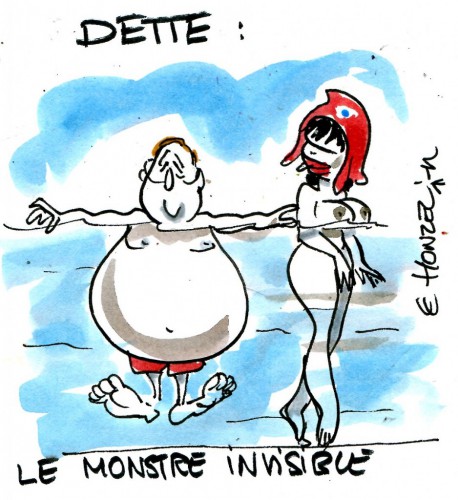
 Par manque de formation historique et économique, on présente le « colbertisme » comme de l’interventionnisme étatique à la façon de l’État Providence ou des velléités de notre bruyant ministre du ”Redressement productif ”, M. Montebourg. Première erreur. On s’imagine aussi que le colbertisme est un dirigisme anti-libéral, le choix d’une économie bureaucratique et administrée, sous prétexte de ”volontarisme” anti-marché. Seconde erreur. Le colbertisme n’a rien à voir avec ces clichés, bien au contraire. Dans l’histoire de France récente, les véritables politiques colbertistes ont été menées par De Gaulle et Pompidou, mais certainement pas par les socialistes. Explications.
Par manque de formation historique et économique, on présente le « colbertisme » comme de l’interventionnisme étatique à la façon de l’État Providence ou des velléités de notre bruyant ministre du ”Redressement productif ”, M. Montebourg. Première erreur. On s’imagine aussi que le colbertisme est un dirigisme anti-libéral, le choix d’une économie bureaucratique et administrée, sous prétexte de ”volontarisme” anti-marché. Seconde erreur. Le colbertisme n’a rien à voir avec ces clichés, bien au contraire. Dans l’histoire de France récente, les véritables politiques colbertistes ont été menées par De Gaulle et Pompidou, mais certainement pas par les socialistes. Explications.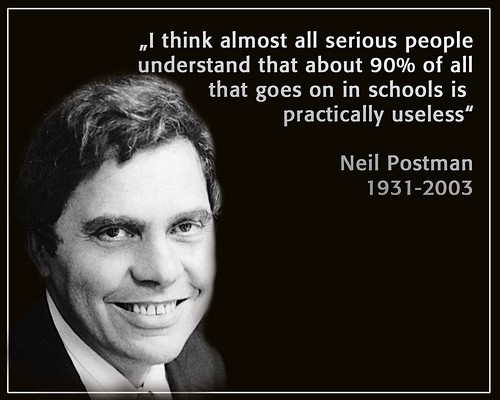
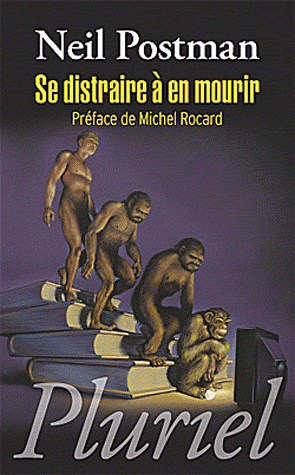 Diese Vorstellung ist um so gefährlicher, als sie niemand mit vernünftigen Gründen gegen den rationalen Einsatz von Verfahren und Techniken stellen kann, mit denen sich bestimmte Vorhaben verwirklichen lassen. (...) Die Kontroverse betrifft den Triumph des Verfahrens, seine Erhöhung zu etwas Heiligem, wodurch verhindert wird, daß auch andere Verfahrensweisen eine Chance bekommen» (S. 153-154). Weiter warnt uns Postman von einer unheimlichen Gefahr, d. h. die Gefahr der Entleerung der Symbole. Wenn traditionnelle oder religiöse Symbole beliebig manipuliert oder verhöhnt werden, als ob sie mechanische Teilchen wären, entleeren sie sich. Hauptschuldige daran ist die Werbung, die einen ständig größeren Einfluß über unseres tägliche Denken ausübt und die die Jugend schlimm verblödet, so daß sie alles im Schnelltempo eines Werbungsspot verstehen will. Um Waren zu verkaufen, manipulieren die Werbeleute gut bekannte politische, staatliche oder religiöse Symbole. Diese werden dann gefährlich banalisiert oder lächerlich gemacht, dienen nur noch das interressierte Verkaufen, verlieren jedes Mysterium, werden nicht mehr mit Andacht respektiert. So verlieren ein Volk oder eine Kultur ihren Rückengrat, erleben einen problematischen Sinnverlust, der die ganze Gemeinschaft im verheerenden Untergang stoßen. Postmans Bücher sind wichtig, weil sie uns ganz sachlich auf zeitgenößischen Problemen aufmerksam machen, ohne eine peinlich apokalyptische Sprache zu verwenden. Zum Beispiel ist Postman klar bewußt, daß die Technik lebenswichtig für den Menschen ist, denunziert aber ohne unnötige Pathos die gefährliche Autonomisierung von technischen Verfahren. Postman plädiert nicht für eine irrationale Technophobie. Schmittianer werden in seiner Analyse der unsichtbaren Technologien, wie das Management, eine tagtägliche Quelle der Delegitimierung und Legalisierung der politischen Gemeinschaften.
Diese Vorstellung ist um so gefährlicher, als sie niemand mit vernünftigen Gründen gegen den rationalen Einsatz von Verfahren und Techniken stellen kann, mit denen sich bestimmte Vorhaben verwirklichen lassen. (...) Die Kontroverse betrifft den Triumph des Verfahrens, seine Erhöhung zu etwas Heiligem, wodurch verhindert wird, daß auch andere Verfahrensweisen eine Chance bekommen» (S. 153-154). Weiter warnt uns Postman von einer unheimlichen Gefahr, d. h. die Gefahr der Entleerung der Symbole. Wenn traditionnelle oder religiöse Symbole beliebig manipuliert oder verhöhnt werden, als ob sie mechanische Teilchen wären, entleeren sie sich. Hauptschuldige daran ist die Werbung, die einen ständig größeren Einfluß über unseres tägliche Denken ausübt und die die Jugend schlimm verblödet, so daß sie alles im Schnelltempo eines Werbungsspot verstehen will. Um Waren zu verkaufen, manipulieren die Werbeleute gut bekannte politische, staatliche oder religiöse Symbole. Diese werden dann gefährlich banalisiert oder lächerlich gemacht, dienen nur noch das interressierte Verkaufen, verlieren jedes Mysterium, werden nicht mehr mit Andacht respektiert. So verlieren ein Volk oder eine Kultur ihren Rückengrat, erleben einen problematischen Sinnverlust, der die ganze Gemeinschaft im verheerenden Untergang stoßen. Postmans Bücher sind wichtig, weil sie uns ganz sachlich auf zeitgenößischen Problemen aufmerksam machen, ohne eine peinlich apokalyptische Sprache zu verwenden. Zum Beispiel ist Postman klar bewußt, daß die Technik lebenswichtig für den Menschen ist, denunziert aber ohne unnötige Pathos die gefährliche Autonomisierung von technischen Verfahren. Postman plädiert nicht für eine irrationale Technophobie. Schmittianer werden in seiner Analyse der unsichtbaren Technologien, wie das Management, eine tagtägliche Quelle der Delegitimierung und Legalisierung der politischen Gemeinschaften. 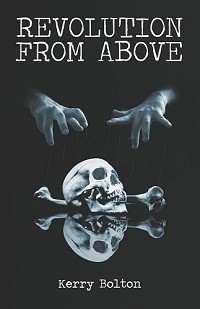 Jeder, der einmal versucht oder auch nur theoretisch erwogen hat, einen größeren geistig-politischen Umschwung herbeizuführen – von einer Revolution ganz zu schweigen –, weiß, daß dazu vor allem eines erforderlich ist: Geld.
Jeder, der einmal versucht oder auch nur theoretisch erwogen hat, einen größeren geistig-politischen Umschwung herbeizuführen – von einer Revolution ganz zu schweigen –, weiß, daß dazu vor allem eines erforderlich ist: Geld.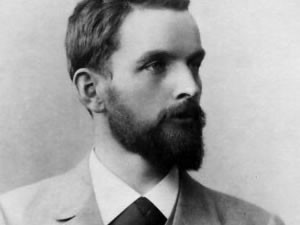 Silvio Gesell war ein nonkonformistischer Ökonom. Er nahm zusammen mit Figuren sowie Niekisch, Mühsam und Landauer an der Räteregierung Bayerns teil. Der gebürtige Sankt-Vikter entwickelte in seinem wichtigsten Buch “Die natürliche Ordnung” ein Projekt der Umverteilung des Bodens, damit ein Jeder selbständig-autonom in totaler Unabhängigkeit von abstrakten Strukturen leben konnte. Günter Bartsch nennt ihn ein “Akrat”, d.h. ein Mensch, der frei von jeder Bevormündung ist, sei diese politischer, religiöser oder verwaltungsartiger Natur. Für Klaus Schmitt, der Gesell für die deutsche nonkonforme Linke wiederentdeckt (aber nicht kritiklos), ist der räterepublikanische Akrat ein der schärfsten Kritiker der “Macht Mammons”. Diese Allmacht wollte Gesell mit der Einführung eines “Schwundgeldes” bzw. einer “Freigeld-Lehre” zerschmettern. Unter “Schwundgeld” verstand er ein Geld, das man nicht thesaurisieren konnte und für das keine Zinsen gezahlt wurden. Im Gegenteil war für Gesell die Hortung von Geldwerten die Hauptsünde. Geld, das nicht in Sachen (Maschinen, Geräte, Technik, Erziehung, Boden, Vieh, usw.) investiert wird, mußte durch moralischen und ökonomischen Zwang an Wert verlieren. Solche Ideen entwickelten auch der Vater des kanadischen und angelsächsichen Distributismus, C. H. Douglas, und der Dichter Ezra Pound, der in den amerikanischen Regierung ein Instrument des Teufels Mammon sah. Douglas entwickelte distributistische Bauern-Projekte in Kanada, die teilweise noch heute existieren. Pound drückte seinen Dichterhaß gegen Geld- und Bankwesen, indem er die italienischen “Saló-Republik” am Ende des Krieges unterstütze. Pound versuchte, seine amerikanische Landgenossen zu überzeugen, keinen Krieg gegen Mussolini und das spätfaschistischen Italien zu führen. Nach 1945, wurde er in den VSA zwölf Jahre lang in einer Irrenanstalt eingesperrt. Er kam trotzdem aus dieser Hölle ungebrochen zurück und ging bei seiner Dochter Mary de Rachewiltz in Südtirol wohnen, wo er 1972 starb.
Silvio Gesell war ein nonkonformistischer Ökonom. Er nahm zusammen mit Figuren sowie Niekisch, Mühsam und Landauer an der Räteregierung Bayerns teil. Der gebürtige Sankt-Vikter entwickelte in seinem wichtigsten Buch “Die natürliche Ordnung” ein Projekt der Umverteilung des Bodens, damit ein Jeder selbständig-autonom in totaler Unabhängigkeit von abstrakten Strukturen leben konnte. Günter Bartsch nennt ihn ein “Akrat”, d.h. ein Mensch, der frei von jeder Bevormündung ist, sei diese politischer, religiöser oder verwaltungsartiger Natur. Für Klaus Schmitt, der Gesell für die deutsche nonkonforme Linke wiederentdeckt (aber nicht kritiklos), ist der räterepublikanische Akrat ein der schärfsten Kritiker der “Macht Mammons”. Diese Allmacht wollte Gesell mit der Einführung eines “Schwundgeldes” bzw. einer “Freigeld-Lehre” zerschmettern. Unter “Schwundgeld” verstand er ein Geld, das man nicht thesaurisieren konnte und für das keine Zinsen gezahlt wurden. Im Gegenteil war für Gesell die Hortung von Geldwerten die Hauptsünde. Geld, das nicht in Sachen (Maschinen, Geräte, Technik, Erziehung, Boden, Vieh, usw.) investiert wird, mußte durch moralischen und ökonomischen Zwang an Wert verlieren. Solche Ideen entwickelten auch der Vater des kanadischen und angelsächsichen Distributismus, C. H. Douglas, und der Dichter Ezra Pound, der in den amerikanischen Regierung ein Instrument des Teufels Mammon sah. Douglas entwickelte distributistische Bauern-Projekte in Kanada, die teilweise noch heute existieren. Pound drückte seinen Dichterhaß gegen Geld- und Bankwesen, indem er die italienischen “Saló-Republik” am Ende des Krieges unterstütze. Pound versuchte, seine amerikanische Landgenossen zu überzeugen, keinen Krieg gegen Mussolini und das spätfaschistischen Italien zu führen. Nach 1945, wurde er in den VSA zwölf Jahre lang in einer Irrenanstalt eingesperrt. Er kam trotzdem aus dieser Hölle ungebrochen zurück und ging bei seiner Dochter Mary de Rachewiltz in Südtirol wohnen, wo er 1972 starb.  Neben seiner ökonomischen Lehren über das Schwund- und Freigeld, theorisierte Gesell einen Anarchofeminismus, wobei er besonders die Kinder und die Frauen gegen männliche Ausbeutung schützen wollte. Diese Interpretation des matriarchalischen Archetyp implizierte eine ziemlich scharfe Kritik des Vaterrechts, der in seinen Augen die Position der Kinder in der Gesellschaft besonders labil machte. Insofern war Gesell ein Vorfechter der Kinderrechte. Praktish bedeutete dieser Anarchofeminismus die Einführung einer “Mutterrente”. «Gesell und sein Anhänger wollten den gesamten Boden den Müttern zueignen und ihnen bzw. ihren Kinder die Bodenrente bis zum 18. Lebensjahr der Kinder als “Mutter-” bzw. “Kinderrente” zukommen lassen. Ein “Bund der Mütter” soll den gesamten nationalen und in ferner Zukunft den gesamten Boden unseres Planeten verwalten und (...) an den oder die Meistbietenden verpachten. Nach diesem Verfahren hätte jeder einzelne Mensch und jede einzelne Gruppe (z. B. eine Genossenschaft) die gleichen Chancen wie alle anderen, Boden nutzen zu können, ohne von privaten oder staatlichen Parasiten ausgebeutet zu werden» (S. 124). Wissenschaftliche Benennung dieses Systems nach Gesell hieß “physiokratische Mutterschaft”.
Neben seiner ökonomischen Lehren über das Schwund- und Freigeld, theorisierte Gesell einen Anarchofeminismus, wobei er besonders die Kinder und die Frauen gegen männliche Ausbeutung schützen wollte. Diese Interpretation des matriarchalischen Archetyp implizierte eine ziemlich scharfe Kritik des Vaterrechts, der in seinen Augen die Position der Kinder in der Gesellschaft besonders labil machte. Insofern war Gesell ein Vorfechter der Kinderrechte. Praktish bedeutete dieser Anarchofeminismus die Einführung einer “Mutterrente”. «Gesell und sein Anhänger wollten den gesamten Boden den Müttern zueignen und ihnen bzw. ihren Kinder die Bodenrente bis zum 18. Lebensjahr der Kinder als “Mutter-” bzw. “Kinderrente” zukommen lassen. Ein “Bund der Mütter” soll den gesamten nationalen und in ferner Zukunft den gesamten Boden unseres Planeten verwalten und (...) an den oder die Meistbietenden verpachten. Nach diesem Verfahren hätte jeder einzelne Mensch und jede einzelne Gruppe (z. B. eine Genossenschaft) die gleichen Chancen wie alle anderen, Boden nutzen zu können, ohne von privaten oder staatlichen Parasiten ausgebeutet zu werden» (S. 124). Wissenschaftliche Benennung dieses Systems nach Gesell hieß “physiokratische Mutterschaft”.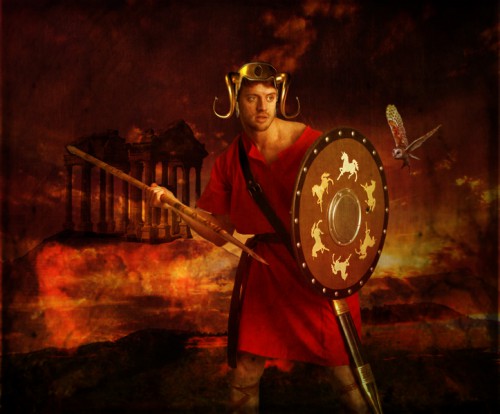
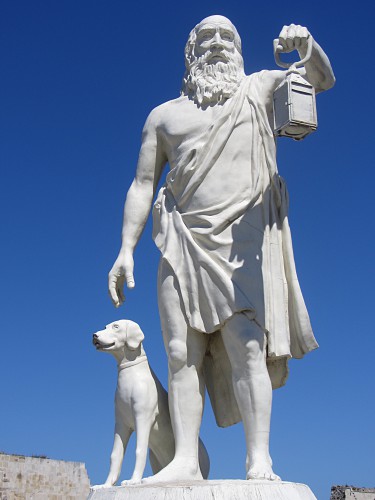
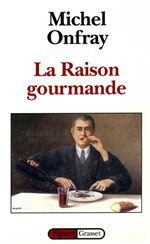 Il démontre ensuite que ce fatras ne pourra durer en dépit de ses 2000 ans d'existence. Onfray veut dépasser la “lignée morale” qui va de Platon à nos modernes contempteurs des corps. Onfray entend également réhabiliter les traditions philosophiques refoulées: a) les Cyrénaïques; b) les frères du Libre-Esprit; c) les gnostiques licencieux; d) les libertins érudits; etc.
Il démontre ensuite que ce fatras ne pourra durer en dépit de ses 2000 ans d'existence. Onfray veut dépasser la “lignée morale” qui va de Platon à nos modernes contempteurs des corps. Onfray entend également réhabiliter les traditions philosophiques refoulées: a) les Cyrénaïques; b) les frères du Libre-Esprit; c) les gnostiques licencieux; d) les libertins érudits; etc.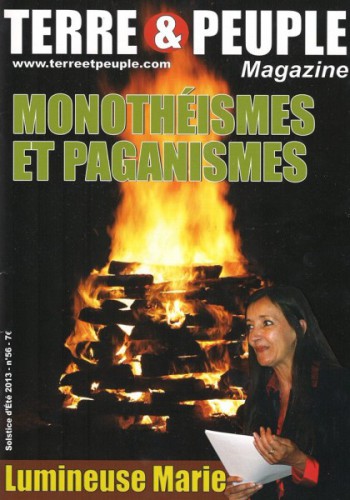

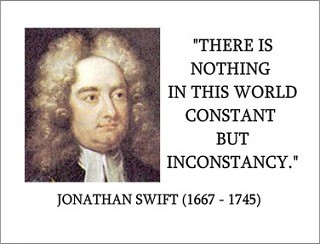
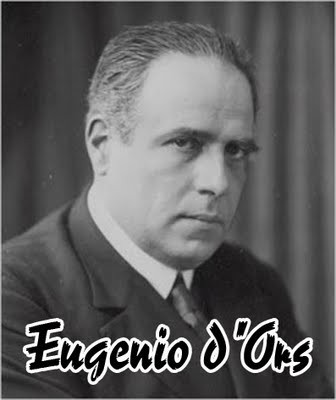 Ce philosophe catalan a été défini comme: un "Socrate nordique", un "Goethe méditerranéen", un "personnage de théâtralité baroque".
Ce philosophe catalan a été défini comme: un "Socrate nordique", un "Goethe méditerranéen", un "personnage de théâtralité baroque".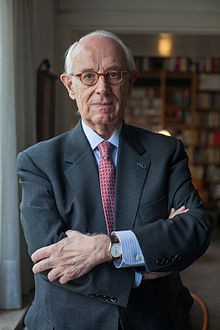 Après le philosophe catalan Eugenio d'Ors, abordons la sociologie du Néerlandais Anton Zijderveld (disciple d'Arnold Gehlen).
Après le philosophe catalan Eugenio d'Ors, abordons la sociologie du Néerlandais Anton Zijderveld (disciple d'Arnold Gehlen).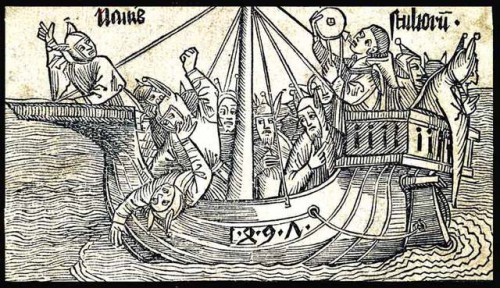
 Le corpus le plus significatif, le plus souvent évoqué à l'heure actuelle est l'œuvre de RICHARD RORTY (Contingency, Irony and Solidarity).
Le corpus le plus significatif, le plus souvent évoqué à l'heure actuelle est l'œuvre de RICHARD RORTY (Contingency, Irony and Solidarity). 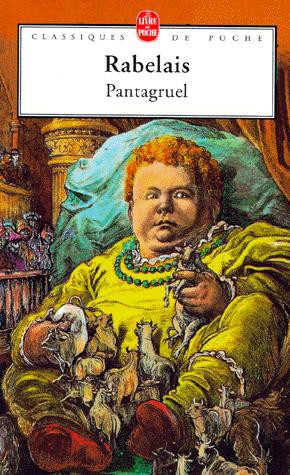 Rabelais (1494-1553), pourquoi Rabelais?
Rabelais (1494-1553), pourquoi Rabelais?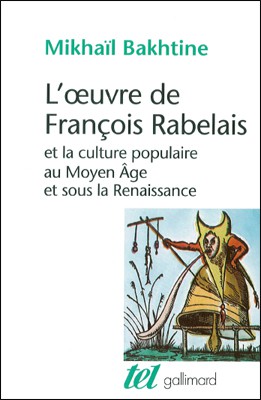 Bakhtine en mettant en parallèle son réalisme grotesque et le réalisme socialiste officiel, revalorisera “LE PEUPLE RIANT SUR LA PLACE DU MARCHÉ”.
Bakhtine en mettant en parallèle son réalisme grotesque et le réalisme socialiste officiel, revalorisera “LE PEUPLE RIANT SUR LA PLACE DU MARCHÉ”. 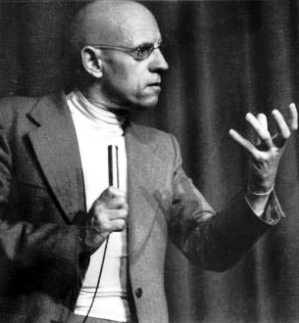 Nietzsche voit dans le corps le site d'une complexité née de multiples et diverses intersubjectivités et interactions, le lieu de passage de l'expérience, toujours diverse, chaque fois unique.
Nietzsche voit dans le corps le site d'une complexité née de multiples et diverses intersubjectivités et interactions, le lieu de passage de l'expérience, toujours diverse, chaque fois unique. 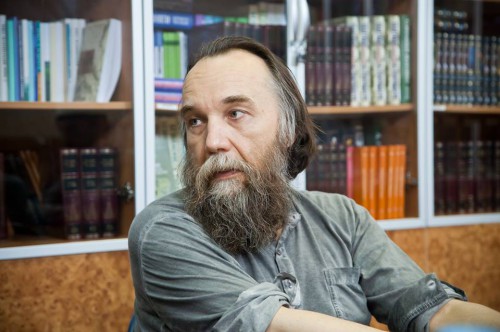
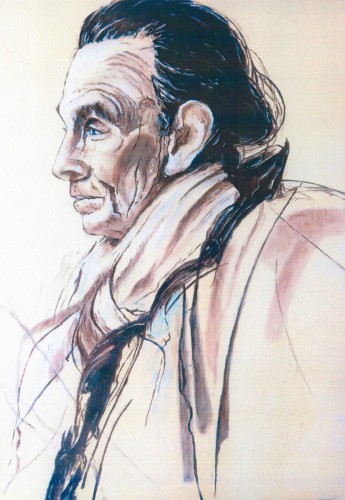
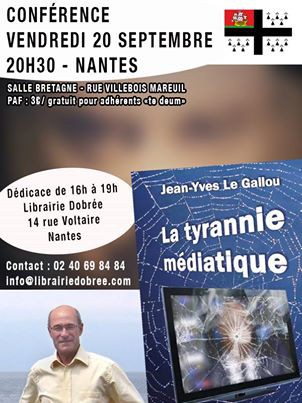
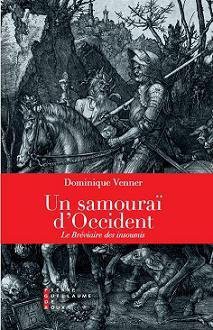 In his commentaries on the Gallic Wars, Julius Caesar claimed the ancient Celts were ruled by two principles: to fight well and to speak well. By this standard, the now famous essayist, historian, and former insurgent, Dominique Venner, who frequently identified with his Gallic ancestors, was the epitome of Caesar’s Celt—for with arms and eloquence, he fought a life-long war against the enemies of Europe.
In his commentaries on the Gallic Wars, Julius Caesar claimed the ancient Celts were ruled by two principles: to fight well and to speak well. By this standard, the now famous essayist, historian, and former insurgent, Dominique Venner, who frequently identified with his Gallic ancestors, was the epitome of Caesar’s Celt—for with arms and eloquence, he fought a life-long war against the enemies of Europe. 
